Table of Contents
- English
- Quick Guides
- Connections
- Connection Guide
- Connecting an Antenna (Aerial)
- Connecting to the Internet
- Connecting to a Network via a Mobile Dongle
- Troubleshooting Internet Connectivity Issues
- Connecting Video Devices
- Audio Input and Output Connections
- Connecting a Computer
- Connecting a Mobile Device
- Switching between external devices connected to the TV
- Connection Notes
- Remote Control and Peripherals
- About the Samsung Smart Remote
- About the Samsung Smart Remote (THE FRAME)
- Connecting to the Samsung Smart Remote
- Controlling External Devices with the Samsung Smart Remote - Using the Universal Remote
- Using Anynet+ (HDMI-CEC)
- Controlling the TV with a Keyboard
- Entering Text using the On-Screen QWERTY Keyboard
- Smart Features
- TV Viewing
- Viewing Digital Broadcast Information at a Glance
- Recording Programmes
- Setting Up a Schedule Viewing
- Using Timeshift
- Using the Channel List
- Editing channels
- Creating a Personal Favourites List
- Editing a Favourites List
- TV-Viewing Support Functions
- Changing the broadcast signal
- Scanning for available channels
- Restricting Viewing to Specific Channels
- Selecting the broadcasting audio option
- Using Programme Rating Lock
- Configuring advanced broadcasting settings
- Selecting the broadcast audio language
- Tuning broadcast signals manually
- Fine-tuning analogue broadcasts
- Setting satellite system
- Changing teletext language
- Picture and Sound
- System and Support
- Setting the Time and Using the Timer
- Using the Screen Burn Protection and Energy Saving Functions
- Updating the TV’s Software
- Protecting the TV from Hacking and Malicious Code
- Using Other Functions
- Running the accessibility functions
- Enabling voice guides for the visually impaired
- Audio Description
- Watching TV broadcasts with subtitles
- White text on black background (high contrast)
- Enlarging the font (for the visually impaired)
- Learning about the remote control (for the visually impaired)
- Learning about the TV menu
- Listening to the TV through Bluetooth devices (for the hearing impaired)
- Configuring advanced system settings
- Checking digital channel signal info and strength
- Restoring the TV to the factory settings
- HbbTV
- Teletext Feature
- Troubleshooting
- Getting Support
- Diagnosing TV operational issues
- There Is a Problem with the Picture
- I Can't Hear the Sound Clearly
- There Is a Problem with the Broadcast
- My Computer Won't Connect
- The TV Won't Connect to the Internet
- The Schedule Recording/Timeshift Function Isn't Working
- Anynet+ (HDMI-CEC) Isn't Working
- I Have Trouble Launching/Using Apps
- My File Won't Play
- I Want to Reset the TV
- Other Issues
- Precautions and Notes
- Before Using the Recording and Timeshift Functions
- Supported broadcasting audio options
- Read Before Using Apps
- Read Before Using the Internet
- Read Before Playing Photo, Video, or Music Files
- Read After Installing the TV
- Supported Resolutions for UHD Input Signals
- Read Before Connecting a Computer (Supported Resolutions)
- Supported Resolutions for Video Signals
- Read Before Using Bluetooth Devices
- Buttons and Functions
- Licence
- Accessibility Guidance
Samsung 65" MU7350K User Manual
Displayed below is the user manual for 65" MU7350K by Samsung which is a product in the TVs category. This manual has pages.
Related Manuals

E-MANUAL
Thank you for purchasing this Samsung product.
To receive more complete service, please register your
product at
www.samsung.com/register
Model______________ Serial No.______________

Contents
Quick Guides
Connecting the Samsung Smart Remote to the TV
Using Smart Hub
Using Voice Interaction
3 Running Voice Interaction
5 Read Before Using Voice Interaction
Updating the TV’s Software
6 Updating the TV’s software to the latest version
6 Updating the TV automatically
Getting Support
7 Getting support through Remote Management
8 Finding the contact information for service
8 Requesting service
Connections
Connection Guide
Connecting an Antenna (Aerial)
Connecting to the Internet
11 Connecting to your Internet network
Connecting to a Network via a Mobile Dongle
Troubleshooting Internet Connectivity Issues
15 Troubleshooting wired Internet connectivity issues
16 Troubleshooting wireless Internet connectivity issues
Connecting Video Devices
17 Connecting with an HDMI cable
18 Connecting with a component cable (Only for models with
COMPONENT IN / AV IN)
19 Connecting with a composite cable (Only for models with
COMPONENT IN / AV IN)
Audio Input and Output Connections
20 Connecting with an HDMI (ARC) cable
20 Connecting with a digital audio (optical) cable
20 Connecting through a wireless network
21 Connecting Bluetooth Devices
Connecting a Computer
21 Connecting through the HDMI port ― Screen Sharing (HDMI)
Connecting a Mobile Device
22 Viewing the screen of a mobile device on your TV (Screen
Sharing)
23 Sharing content through the Smart View app
23 Managing a Mobile Device
Switching between external devices connected to the TV
23 Changing the input signal
24 Editing the name and icon of an external device
25 Using additional functions
Connection Notes
25 Connection notes for HDMI
26 Connection notes for audio devices
27 Connection notes for computers
27 Connection notes for mobile devices
Remote Control and Peripherals
About the Samsung Smart Remote
About the Samsung Smart Remote (THE FRAME)
Connecting to the Samsung Smart Remote
Controlling External Devices with the Samsung Smart Remote
- Using the Universal Remote
Using Anynet+ (HDMI-CEC)
33 Connecting an external device through Anynet+ and using
their menus
II

Controlling the TV with a Keyboard
34 Connecting a USB keyboard
34 Connecting a Bluetooth keyboard
34 Using the keyboard
Entering Text using the On-Screen QWERTY Keyboard
36 Using additional functions
36 Entering Text using the remote control's microphone and the
on-screen QWERTY keyboard
Smart Features
Smart Hub
38 Displaying the Home Screen
40 Launching Smart Hub automatically
40 Launching the last used app automatically
41 Testing Smart Hub connections
41 Resetting Smart Hub
Using a Samsung account
41 Creating and managing your Samsung account
42 Signing in to a Samsung account
Using the Apps Service
45 Installing and running an app
46 Managing purchased or installed apps
Using the e-Manual
48 Launching the e-Manual
48 Using the buttons in the e-Manual
Using the Internet
Playing pictures/video/music
50 Playing media content
Using Voice Interaction
51 Running Voice Interaction
52 Read Before Using Voice Interaction
TV Viewing
Viewing Digital Broadcast Information at a Glance
54 Using the guide
Recording Programmes
56 Recording programmes
57 Managing the schedule recording list
57 Viewing recorded programmes
Setting Up a Schedule Viewing
58 Setting up a schedule viewing for a channel
59 Editing a schedule viewing
59 Setting the Schedule Viewing Time
Using Timeshift
60 Buttons and functions available while recording a programme
or Timeshift
Using the Channel List
Editing channels
62 Removing registered channels
62 Editing registered channels
Creating a Personal Favourites List
63 Registering channels as favourites
63 Viewing and selecting channels on Favourites lists only
Editing a Favourites List
64 Adding channels to favourites list
64 Removing channels from a favourites list
64 Rearranging a favourites list
64 Renaming a favourites list
II III

TV-Viewing Support Functions
65 Changing the broadcast signal
65 Scanning for available channels
65 Restricting Viewing to Specific Channels
66 Selecting the broadcasting audio option
66 Using Programme Rating Lock
66 Configuring advanced broadcasting settings
67 Selecting the broadcast audio language
68 Tuning broadcast signals manually
68 Fine-tuning analogue broadcasts
69 Setting satellite system
69 Changing teletext language
Picture and Sound
Adjusting the Picture Quality
70 Choosing a picture mode
71 Configuring advanced picture settings
Setting the Viewing Environment for External Devices
73 Playing games on an optimised screen
73 Viewing UHD videos
73 Using HDMI black level
74 Registering the TV as a DivX-certified device (watching for pay
DivX movies)
Picture Support Functions
74 Changing the picture size
75 Changing the picture size automatically
75 Changing the picture size in 4:3 or Screen Fit mode
Adjusting the Sound Quality
76 Choosing a sound mode
76 Configuring advanced sound settings
Using the Sound Support Functions
77 Selecting speakers
77 Listening to the TV through Bluetooth devices
78 Listening to the TV through a Multiroom speaker
System and Support
Setting the Time and Using the Timer
79 Setting the current time
80 Using the timers
Using the Screen Burn Protection and Energy Saving Functions
81 Preventing screen burn
81 Reducing the energy consumption of the TV
Updating the TV’s Software
82 Updating the TV’s software to the latest version
82 Updating the TV automatically
Protecting the TV from Hacking and Malicious Code
83 Scanning the TV and connected storage for malicious code
Using Other Functions
83 Running the accessibility functions
84 Enabling voice guides for the visually impaired
84 Audio Description
85 Watching TV broadcasts with subtitles
86 White text on black background (high contrast)
86 Enlarging the font (for the visually impaired)
86 Learning about the remote control (for the visually impaired)
86 Learning about the TV menu
86 Listening to the TV through Bluetooth devices (for the hearing
impaired)
87 Configuring advanced system settings
88 Checking digital channel signal info and strength
88 Restoring the TV to the factory settings
HbbTV
Teletext Feature
91 Typical Teletext page
IV

Troubleshooting
Getting Support
92 Getting support through Remote Management
93 Finding the contact information for service
93 Requesting service
Diagnosing TV operational issues
There Is a Problem with the Picture
94 Testing the picture
I Can't Hear the Sound Clearly
96 Testing the sound
There Is a Problem with the Broadcast
My Computer Won't Connect
The TV Won't Connect to the Internet
The Schedule Recording/Timeshift Function Isn't Working
Anynet+ (HDMI-CEC) Isn't Working
I Have Trouble Launching/Using Apps
My File Won't Play
I Want to Reset the TV
Other Issues
Precautions and Notes
Before Using the Recording and Timeshift Functions
104 Before using the recording and schedule recording functions
106 Before using the timeshift function
Supported broadcasting audio options
Read Before Using Apps
Read Before Using the Internet
Read Before Playing Photo, Video, or Music Files
110 Limitations on use of photo, video, and music files
111 Supported external subtitles
111 Supported internal subtitles
112 Supported image formats and resolutions
112 Supported music formats and codecs
113 Supported video codecs
Read After Installing the TV
115 Picture sizes and input signals
116 Installing an anti-theft lock
116 Read before setting up a wireless Internet connection
Supported Resolutions for UHD Input Signals
117 If HDMI UHD Color is set to Off
117 If HDMI UHD Color is set to On
Read Before Connecting a Computer (Supported Resolutions)
118 IBM
118 MAC
119 VESA DMT
119 CEA-861
Supported Resolutions for Video Signals
120 CEA-861
Read Before Using Bluetooth Devices
121 Restrictions on using Bluetooth
Buttons and Functions
122 Buttons and functions available while playing multimedia
content
Licence
IV V

Accessibility Guidance
Using the Remote control
125 Orientation of the Samsung Smart Remote
125 Description of the Samsung Smart Remote
Using the accessibility menu
127 Accessibility short cut menu
128 Step by Step instructions to.
130 Setting accessibility settings using Voice Interaction
Using the TV with Voice Guide on
131 Watching TV
Using the guide
Setting Up a Schedule Viewing
Using the Channel List
138 Creating a Personal Favourites List
Recording
140 Using the instant and schedule recording options from the
guide screen:
141 Using the Instant and Schedule Recording options from
programme info window
141 Recording a programme you are currently watching directly
from live TV
141 Changing the recording time
142 Viewing recorded programmes
142 Deleting a recorded programme
Using Smart Hub
143 Smart Hub
144 Displaying the Home Screen in the Smart Hub
Using the e-Manual
146 Launching the e-Manual
Using Voice Interaction
147 Running Voice Interaction
VI

- 1 -
Quick Guides
You can learn quickly how to run and use the frequently used functions.
Connecting the Samsung Smart Remote to the TV
Connect the Samsung Smart Remote to your TV to operate the TV.
When you turn on the TV for the first time, the Samsung Smart Remote pairs to the TV automatically. If the Samsung
Smart Remote does not pair to the TV automatically, point it at the remote control sensor of the TV, and then press
and hold the and buttons simultaneously for 3 seconds or more.
"The images, buttons, and functions of the Samsung Smart Remote may differ by model.
"For more information, refer to "About the Samsung Smart Remote."
"Availability depends on the specific model.

- 2 -
Using Smart Hub
Connect to Smart Hub for apps, games, movies, and more.
Enjoy the multiple functions provided by Smart Hub simultaneously on a single screen.
Source
TV HDMI 1 HDMI 2 USB 1 USB 2 Connection
Guide
Universal
Remote
Source
"The image on your TV may differ from the image above depending on your model and geographical area.
When you press the button on your remote control, you can use the following functions and features.
1 Settings
When the focus is moved to the icon, a list of quick settings icons appears above the top of the menu. You can
quickly set frequently used functions by clicking the icons.
2 Source
You can select an external device connected to the TV.
"For more information, refer to "Switching between external devices connected to the TV."
3 Search
You can search data for channels, programmes, movie titles, and apps from Smart Hub.
"For more information, refer to "Smart Hub."

- 3 -
4 APPS
You can enjoy a wide range of content including news, sports, weather, and games by installing the corresponding
apps on your TV.
"To use this feature, the TV must be connected to the Internet.
"For more information, refer to "Using the Apps Service."
Art
You can use the Art mode function to edit image content such as artworks or pictures when you are not watching TV
or when the TV is turned off, and then display the content in full screen mode.
"This function is supported only in THE FRAME model.
"For more information, refer to the provided user manual.
Using Voice Interaction
Speak into the microphone on your Samsung Smart Remote to control your TV.
"Availability depends on the specific model.
Running Voice Interaction
Press and hold the button on your Samsung Smart Remote, say a command, and then release the button.
The TV recognises the voice command.
"When you press the button once, the Help Guide is displayed. Use the Voice Interaction function as instructed in the
Guide.
"During voice analysis, the system cannot receive voice commands.
"SMART HUB" "HDMI" "USB"

- 4 -
●If you say an accessibility-related command such as "Subtitle" or "Voice Guide," the command is applied
directly and you will see a notification that the function is operating.
●When playing back media content, you can execute commands such as "Play," "Pause," "Stop," "Rewind," and
"Fast Forward."
"The function does not operate for all apps.
●You can set the timer with the command "Sleep reservation in 30 minutes."
●To change the source, say "HDMI," "TV," or "USB."
●To change the picture mode, say "Movie Picture Mode" or "Set Picture Mode to Standard."
●To search, say "Search ****" or "Search **** in YouTube."
●To view Help, say "Help," "What can I say" or "User guide."
"The supported language may differ by geographical region.
"When you press the button once, the Help Guide is displayed. Use the Voice Interaction function as instructed in
the Guide.

- 5 -
Read Before Using Voice Interaction
Precautions for voice interaction
●To use Voice Interaction, you must have a Samsung account. For more information, refer to "Using a Samsung
account."
●The supported voice interaction languages and features may differ by geographical region.
●If the language set differs from the language of your country, some features are not available.
●The function is available only when the TV is connected to the Internet.
●Voice interaction is available only on TVs that support it and come with remote controls that have a
microphone.
●Symbols including "-" and special characters are not supported. Consequently, if a word or sentence contains
numeric values or symbols, the function may not operate properly.
●Searched results may not provide complete results.
●You may be required to pay for some apps. Consequently, you may encounter a service application or contract.
●To change the current channel by saying channel names as voice commands, you must finish Set Up Service
Provider. ( Settings General Start Setup)
●To use the voice text input function and Smart search function, you must consent to provisions allowing third
parties to collect and use your voice data.
●To use the interactive voice interaction function, you must.
–Agree to Smart Hub's Terms of Use
–Agree to a guidance regarding the collection and use of personal information for the Smart Hub service.
–Consent to the collection and use of personal information for the voice interaction-based service.
Requirements for using voice interaction
●The voice interaction rate differs with the volume/tone, pronunciation, and ambient sound environment (TV
sound and ambient noise).
●The optimal volume for voice commands is between 75 dB and 80 dB.

- 6 -
Updating the TV’s Software
View your TV's software version and update it if necessary.
Settings Support Software Update
Updating the TV’s software to the latest version
[ DO NOT turn off the TV’s power until the update is complete. The TV will turn off and on automatically after
completing the software update. Video and audio settings will be reset to their defaults after a software
update.
Updating through the Internet
Settings Support Software Update Update Now
"Updating from the Internet requires an active Internet connection.
Updating through a USB device
Settings Support Software Update Update Now
After downloading the update file from the Samsung website and storing it on a USB device, connect the USB device
to the TV to update.
"To update using a USB flash drive, download the update package from Samsung.com to your computer. Then, save the
update package in the USB device's top-level folder. Otherwise, the TV will not be able to locate the update package.
Updating the TV automatically
Settings Support Software Update Auto update
If the TV is connected to the Internet, you can have the TV update its software automatically while you are watching
the TV. When the background update is completed, it is applied the next time the TV is turned on.
If you agree to the Smart Hub terms and conditions, Auto update is set to On automatically. If you want this function
disabled, use the Select button to turn it off.
"This function may take a longer time if another network function is running concurrently.
"This function requires an Internet connection.

- 7 -
Getting Support
Get help directly from Samsung if you have a problem with your TV.
Getting support through Remote Management
Settings Support Remote Management
After consenting to our service agreement, you can use Remote Management to access Remote Support and have
a Samsung service technician diagnose your TV, correct problems, and update your TV's software, remotely, via the
web. You can also turn Remote Management on and off.
"This function requires an Internet connection.
"You can also start Remote Management function by pressing and holding the button for 5 or more seconds.
What is Remote Support?
Samsung Remote Support service offers you one-on-one support with a Samsung Technician who can remotely:
●Diagnose your TV
●Adjust the TV settings for you
●Perform a factory reset on your TV
●Install recommended firmware updates
How does Remote Support Work?
You can easily have a Samsung Tech service your TV remotely:
1.
Call the Samsung Contact Centre and ask for remote support.
2.
Open the menu on your TV and go to the Support section.
3.
Select Remote Management, then read and agree to the service agreements. When the PIN screen appears,
provide the PIN number to the agent.
4.
The agent will then access your TV.

- 8 -
Finding the contact information for service
Settings Support About This TV
You can view the address of the Samsung website, the call centre phone number, your TV's model number, your TV's
software version, Open Source Licence and other information you may need to get service support from a Samsung
call agent or the Samsung website.
"You can also view information by scanning the QR code of your TV.
"You can also start this function by pressing and holding the button for 5 or more seconds.
Requesting service
Settings Support Request Support
You can request service when you encounter a problem with the TV. Select the item matching the problem that
you encountered, and then select Request Now or Schedule Appointment Send. Your service request will be
registered. The Samsung Contact Centre will contact you to set up or confirm your service appointment.
"This function is not available in specific geographical areas.
"You must agree to the terms and conditions for the service request.
"This function requires an Internet connection.

- 9 -
Connections
You can watch live broadcasts by connecting an antenna and antenna cable to your TV and can get access to the
Internet by using a LAN cable or wireless router. Using various connectors, you can also connect external devices.
Connection Guide
You can view detailed information about external devices that can be connected to the TV.
Source Connection Guide
It guides you the way to connect various external devices such as the cable box, game console, and PC through
pictures. If you select the connection method to an external device, the information details appear.
Connection Guide
Cable Box/Disc Player HDMI
Game Console
PC
Audio device
Mobile Device
External Storage
Accessory
"The image on your TV may differ from the image above depending on your model and geographical area.

- 10 -
Connecting an Antenna (Aerial)
You can connect an antenna cable to your TV.
"An antenna connection is not necessary if you connect a cable or satellite box.
"Availability depends on the specific model and geographical area.

- 11 -
Connecting to the Internet
You can get access to the Internet through your TV.
Connecting to your Internet network
Settings General Network Open Network Settings Try Now
Connect to an available network.
Establishing a wired Internet connection
Settings General Network Open Network Settings Wired
If you connect a LAN cable, the TV automatically accesses the Internet.
"Use a CAT 7 (*STP type) cable for the connection.
* Shielded Twist Pair
"The TV will not be able to connect to the Internet if your network speed is below 10 Mbps.

- 12 -
Establishing a wireless Internet connection
Settings General Network Open Network Settings Wireless
Make sure that you have the wireless router's SSID (name) and password settings before attempting to connect, and
then follow the directions on the screen.
Wireless Connection
Select your wireless network.
Refresh
"The image on your TV may differ from the image above depending on your model and geographical area.
"If no wireless router is found, select Add Network at the bottom of the list and enter the network name (SSID).
"If your wireless router has a WPS or PBC button, select Use WPS at the bottom of the list, and then push the WPS or PBC
button on your router within 2 minutes. The TV will connect automatically.

- 13 -
Checking the Internet connection status
Settings General Network Network Status Try Now
View the current network and Internet status.
Resetting Your Network
Settings General Network Reset Network
Restore the network settings to the factory default.
"This function is not available on certain models in specific geographical areas.
Turning on the TV with a Mobile Device
Settings General Network Power On with Mobile
By using a mobile device on the same network, you can turn on the TV.
Changing the name of the TV on a network
Settings General System Manager Device Name
You can change the name of the TV on the network. Select User Input at the bottom of the list and change the name.

- 14 -
Connecting to a Network via a Mobile Dongle
Make network connection by connecting a mobile dongle to the TV.
You can make the TV to connect to a network via a mobile device by connecting a mobile dongle to the TV. Connect
the mobile dongle to the USB port in the TV.
"This function is not available on certain models in specific geographical areas.
"When you use a large mobile dongle(Data Card), USB devices may not work properly due to interferences among the USB
ports, or the wireless network may not work properly due to interferences from the peripherals and surroundings. In this
case, use a USB extension cable.
"Channel-Bound Apps is not available when you set up mobile network.
"If you have any problems using online services, please contact your Internet service provider.
The mobile service providers and their devices that support this function are as follows:
(For India only)
●Airtel (Model No: E3276S, E3276s-920, E8231)
●Idea (Model No: E1732, E8231)
●Tata Docomo (Model No: E177, E8231)
●Open Dongles (Airtel, Idea, TataDocomo, Aircel, Vodafone) (Model No: E303C, E303U, E3121B, E3131B, E8221)

- 15 -
Troubleshooting Internet Connectivity Issues
If your TV won't connect to the Internet, try the solutions below.
Troubleshooting wired Internet connectivity issues
After reading the following content, troubleshoot the wired Internet connection issue. If the problem persists,
contact your Internet Service Provider.
No network cable found
Make sure that the LAN cable is plugged in on both ends. If it is plugged in, make sure that the router is turned on. If
the router is on, try turning it off and then on.
IP auto setting failed
1.
Configure the settings in IP Settings.
2.
Make sure that the DHCP server is enabled on the router, and then reset the router.
Unable to connect to the network
1.
Check all IP Settings.
2.
After checking the DHCP server status (must be active) on the router, remove the LAN cable, and then connect
it again.

- 16 -
Connected to a local network, but not to the Internet
1.
Make sure that the Internet LAN cable is connected to the router's external LAN port.
2.
Check the DNS values in IP Settings.
Network setup is complete, but unable to connect to the Internet
If the problem persists, contact your Internet Service Provider.
Troubleshooting wireless Internet connectivity issues
After reading the following content, troubleshoot the wireless Internet connection issue. If the problem persists,
contact your Internet Service Provider.
Wireless network connection failed
If a selected wireless router is not found, go to Open Network Settings, and then select the correct router.
Unable to connect to a wireless router
1.
Check if the router is turned on. If it is, turn it off and then on.
2.
Enter the correct password if required.
IP auto setting failed
1.
Configure the settings in IP Settings.
2.
Make sure that the DHCP server is enabled on the router. Then, unplug the router and plug it back in.
3.
Enter the correct password if required.

- 17 -
Unable to connect to the network
1.
Check all IP Settings.
2.
Enter the correct password if required.
Connected to a local network, but not to the Internet
1.
Make sure that the Internet LAN cable is connected to the router's external LAN port.
2.
Check the DNS values in IP Settings.
Network setup is complete, but unable to connect to the Internet
If the problem persists, contact your Internet Service Provider.
Connecting Video Devices
Make the correct video connections between your TV and your external devices.
Connecting with an HDMI cable
HDMI IN

- 18 -
Connecting with a component cable (Only for models with COMPONENT IN /
AV IN)
A Component connection lets you enjoy video resolutions up to 1080p. To watch video from most DVD and Blu-ray
players, use the Component connection.
Review the illustration below, and then connect Component IN and AV IN on the TV to Component OUT on
the external device by using the provided component and AV adaptors. Make sure to connect the same colour
connectors together. (blue to blue, yellow to yellow, etc.)
COMPONENT IN / AV IN
COMPONENT IN
AV IN
"To use component equipment, connect both the component adapter (blue) and the AV adapter (yellow).

- 19 -
Connecting with a composite cable (Only for models with COMPONENT IN /
AV IN)
Through the Composite connection, you can enjoy the resolution up to 576i.
Review the illustration below, and then connect AV IN on the TV to AV OUT on the external device using the provided
AV adapter and composite cable. When connecting the cables, be sure to match the colours of the cables to the
colours of the ports.
COMPONENT IN / AV IN
COMPONENT IN
AV IN
"Connect AV (composite) equipment to AV In only. Do not connect to Component In.
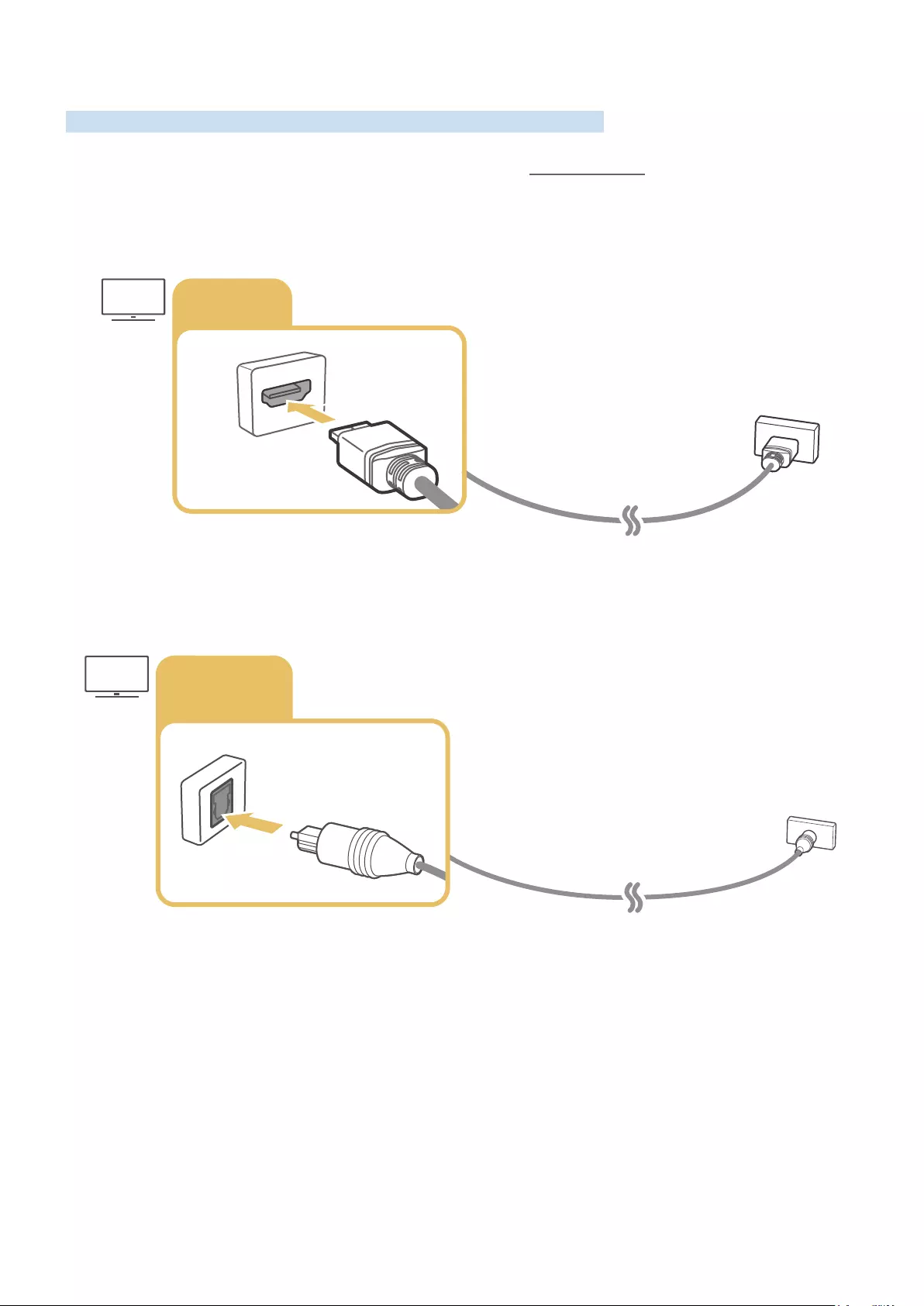
- 20 -
Audio Input and Output Connections
Make the correct audio connections between your TV and your external devices.
"For more information about how to select external speakers, refer to "Selecting speakers."
Connecting with an HDMI (ARC) cable
HDMI IN
(ARC)
Connecting with a digital audio (optical) cable
DIGITAL
AUDIO OUT
(OPTICAL)
Connecting through a wireless network
You can connect the TV to a Samsung wireless audio device through your wireless network. The two devices must be
connected to the same network. For more information about the connection and its use, refer to the user manual of
the audio device.
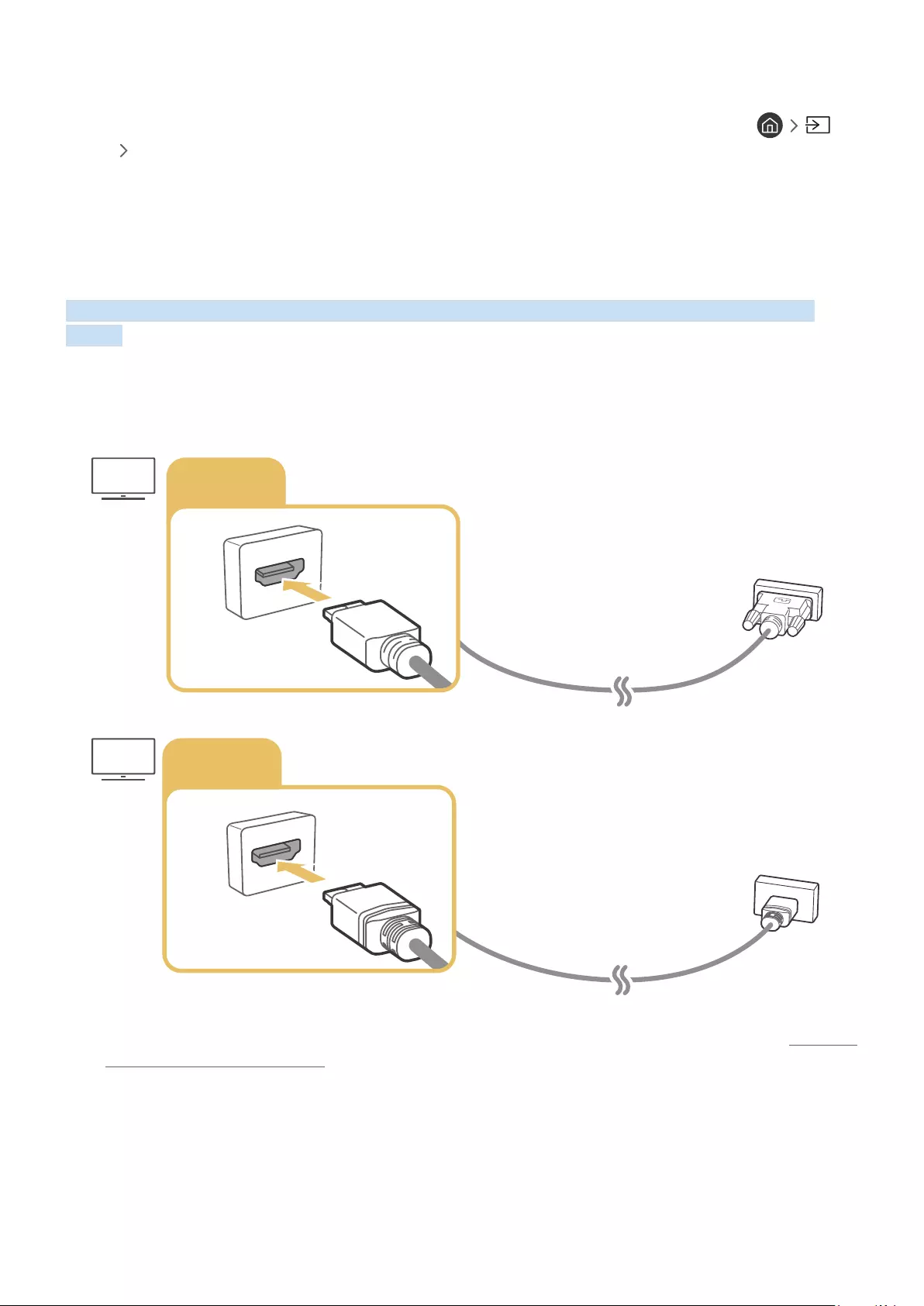
- 21 -
Connecting Bluetooth Devices
For more information about how to connect and use external speakers, refer to the Connection Guide (
Source Connection Guide) and their user manuals.
"This function is not available on certain models in specific geographical areas.
Connecting a Computer
Use the TV as a computer monitor or connect the TV to a computer via your network and access the computer's
content.
Connecting through the HDMI port ― Screen Sharing (HDMI)
HDMI IN
HDMI
DVI
HDMI IN
"When your PC is connected, select PC for the Device Icon. For more information about the port settings, refer to "Editing the
name and icon of an external device."

- 22 -
Connecting a Mobile Device
View a mobile device's screen and multi-media content by connecting the mobile device to your TV or network.
After you connect a mobile device that supports screen mirroring to your TV, you can use screen mirroring to view
the screen of the mobile device on your TV wirelessly and play the video, audio, or photo files currently playing on the
mobile device on your TV.
If your mobile device does not support mirroring, download and install the Smart View (Screen Mirroring) app.
Viewing the screen of a mobile device on your TV (Screen Sharing)
When you run the Smart View app on a mobile device, you can view the screen of the mobile device on the TV.
1.
Run the Smart View app on your mobile device. The device searches for TVs that can be connected.
2.
Select the desired TV from the searched result. The TV and the mobile device are connected.
●If there is no TV found, try again after turning both off and on.
●If you have multiple TVs, assign a different name to each TV in Settings General System
Manager Device Name to make selection easy.

- 23 -
Sharing content through the Smart View app
When you install and then run the Samsung Smart View App on your mobile device, you can play the mobile device's
multimedia content on your TV. You can download the app from Google Play Store, Samsung Apps, or the App Store.
The TV and the mobile device must be connected to the same wireless network.
"This function is not available on certain models in specific geographical areas.
Managing a Mobile Device
Settings General External Device Manager Device Connection Manager
●Access Notification
Set whether to display a notification when a mobile device attempts to connect to the TV for the first time.
●Device List
View and manage a list of mobile devices that have requested permission to connect to the TV.
Switching between external devices connected to the TV
You can switch between TV programmes and the content of external devices.
Changing the input signal
Source
When you select a connected external device on the Source screen, the output of the selected device is displayed on
the TV's screen.
On the standard remote control, press the SOURCE button.
"To control a device (Blu-ray player, game console, etc.) that supports universal remote control with the TV's remote,
connect the device to an HDMI port on the TV, and then turn on the device. Lets you switch to the output of the device
automatically or lets you configure universal remote control for the device automatically. To configure the device for
universal remote control automatically, point the TV's remote control at the device. Note that this function may not be
supported depending on the device and geographical area.
"When a USB device is connected to the USB port, a pop-up message appears that lets you switch easily to the media
content listed on the device.
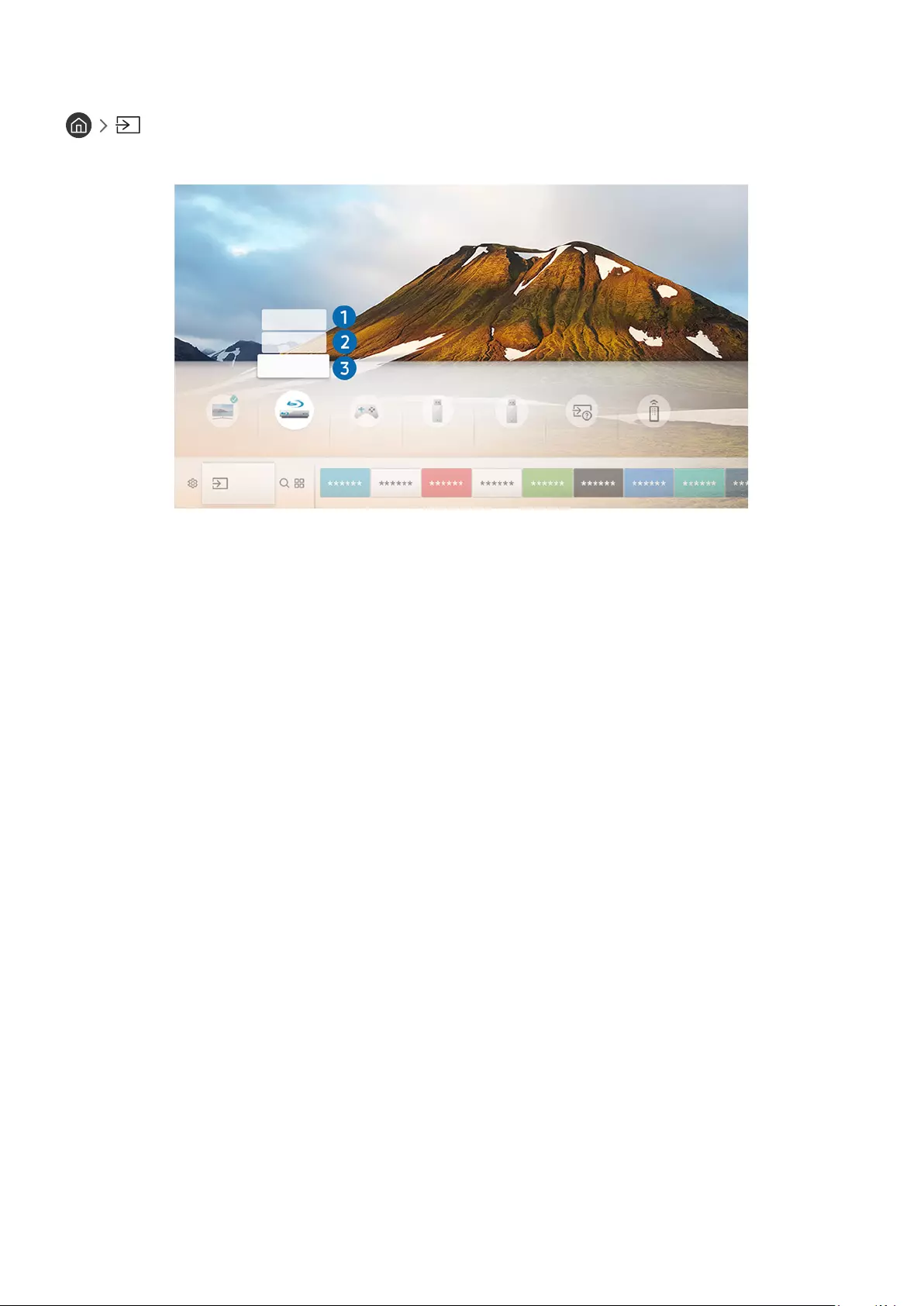
- 24 -
Editing the name and icon of an external device
Source
You can change the port name for a connected external device or add it to Home Screen.
Edit
Information
Source Add to Home
Source
"The image on your TV may differ from the image above depending on your model and geographical area.
1.
Move the focus to a connected external device.
2.
Press the Up directional button. The following 2 functions become available. (Note that available functions
may differ with the port type.)
1 Edit
You can change the port name of an external device for easy identification.
2 Information
You can view the detailed information about the external devices connected to the TV.
3 Add to Home
You can add the port of an external device to the Home Screen for quick switching.

- 25 -
Using additional functions
You can use the following features on the Source screen.
●Connection Guide: The guide to device connections
●Universal Remote: The function that lets you register external devices to your Samsung Smart Remote and
control them using the standard remote control.
"This function is not available on certain models in specific geographical areas.
"For more information, refer to "Controlling External Devices with the Samsung Smart Remote - Using the Universal
Remote."
Connection Notes
When connecting an external device, note the following:
"The number of connectors and their names and locations may differ with the model.
"Refer to the external device's operating manual when connecting it to the TV. The number of external device connectors
and their names and locations may differ with the manufacturer.
Connection notes for HDMI
●The following types of HDMI cables are recommended:
–High-Speed HDMI Cable
–High-Speed HDMI Cable with Ethernet
●Use an HDMI cable with a thickness of 0.66 inches (17 mm) or less.
●Using a non-certified HDMI cable may result in a blank screen or a connection error.
●Some HDMI cables and devices may not be compatible with the TV due to different HDMI specifications.
●This TV does not support HDMI Ethernet Channel. Ethernet is a Local Area Network (LAN) built with coaxial
cables standardised by the IEEE.

- 26 -
●Use a cable shorter than 10 feet (3 m) to get the best UHD contents viewing quality.
●Many computer graphics adaptors do not have HDMI ports, but have DVI ports instead. If your PC does not
support HDMI video out, connect your PC with an HDMI-DVI cable.
"For more information, refer to "Connecting a Computer."
●For the One Connect or One Connect Mini supported models, when the TV is connected to other equipment
such as DVD/BD or STB via HDMI, network standby mode will be automatically activated. In this network
standby mode, the TV continues to detect and connect HDMI Devices. This function can be deactivated by
pressing the following buttons on the remote control.
–On the Samsung Smart Remote: VOL (up directional button) (left directional button) (up
directional button) (down directional button) VOL
–On the standard remote control: (up directional button) (left directional button) (up directional
button) (down directional button) RETURN
"If the function is deactivated and TV is turn off, the function is automatically activated again when the TV is next
switched on.
Connection notes for audio devices
●For better audio quality, it is a good idea to use an AV receiver.
●Connecting a device using an optical cable does not automatically change the audio output to the devices
speakers. To change the audio output to the device, do one of the following:
–Use the Quick Settings screen to change to the connected device:
Use the Select button to select Audio Out/Optical on the Sound Output menu. ( Settings up
directional button Sound Output).
–Use the Settings screen to change to the connected device:
Select Audio Out/Optical on the Sound Output menu. ( Settings Sound Sound Output).
●An unusual noise coming from a connected audio device while you are using it may indicate a problem with
the audio device itself. If this occurs, ask for assistance from the audio device's manufacturer.
●Digital audio is only available with 5.1-channel broadcasts.

- 27 -
Connection notes for computers
●For the resolutions supported by the TV, refer to "Read Before Connecting a Computer (Supported
Resolutions)."
●As long as file sharing is activated, unauthorised access may occur. When you do not need to access data,
disable file sharing.
●Your PC and Smart TV must be connected to each other on the same network.
●When sharing content with other network-based devices such as those in an IP (Internet Protocol) storage
system, sharing may not be supported due to the network’s configuration, quality, or functionality, for
example, if the network has an NAS (Network-Attached Storage) device.
Connection notes for mobile devices
●To use the Smart View function, the mobile device must support a sharing function such as AllShare Cast or
Smart View. To check whether your mobile device supports the sharing function, please visit the mobile device
manufacturer's website.
●To use Wi-Fi Direct, the mobile device must support the Wi-Fi Direct function. Please check if your mobile
device supports Wi-Fi Direct.
●The mobile device and your Smart TV must be connected to each other on the same network.
●The video or audio may stop intermittently, depending on network conditions.
●When sharing content with other network-based devices such as those in an IP (Internet Protocol) storage
system, sharing may not be supported due to the network’s configuration, quality, or functionality, for
example, if the network has an NAS (Network-Attached Storage) device.
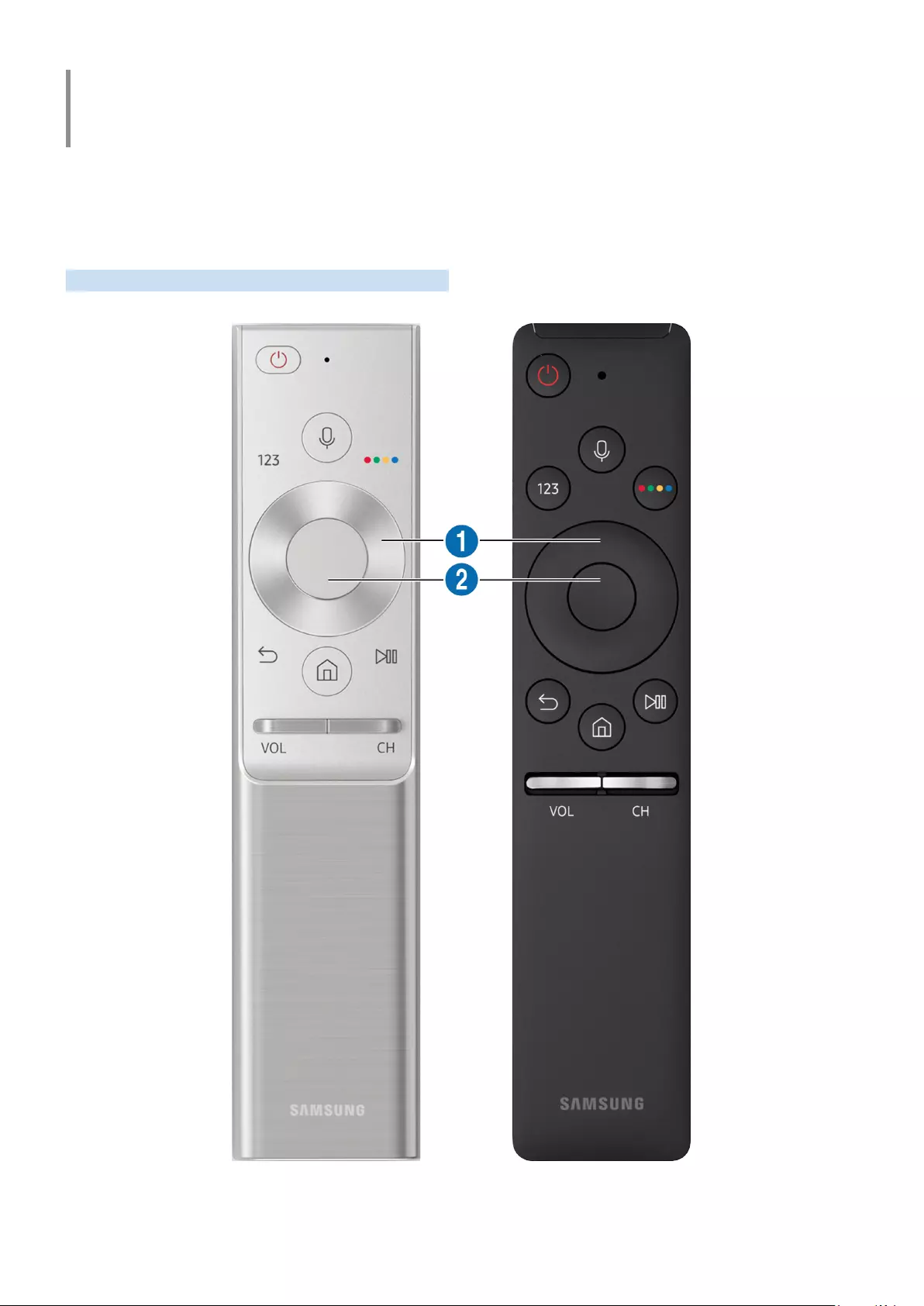
- 28 -
Remote Control and Peripherals
You can control TV operations with your Samsung Smart Remote. Pair external devices such as a keyboard for ease
of use.
About the Samsung Smart Remote
Learn about the buttons on the Samsung Smart Remote.

- 29 -
Button Description
(Voice recognition)
Runs Voice Interaction. Press the button, say a voice command, and then release the button
to run Voice Interaction. When pressed once, the guide to Voice Interaction appears.
Virtual numeric pad
When pressed, the virtual numeric pad appears on the screen so that you can enter a
numeric value using it.
Select numbers and then select Done to enter a numeric value. Use to change the channel,
enter a PIN, enter a ZIP code, etc.
If the Colour Button appears with a number strip on the screen, select the Colour Button and
then select a specific colour by using the directional pad (up/down/left/right). Use this to
access additional options that are specific to the feature in use.
4 Colour button
Use these coloured buttons to access additional options that are specific to the feature in
use.
Directional pad (up/
down/left/right) Moves the focus.
Select Selects or runs a focused item. When pressed while you are watching content, detailed
programme information appears.
(Return)
Press to return to the previous menu. When pressed for 1 second or more, the running
function is terminated. When pressed while you are watching a programme, the previous
channel appears.
(Smart Hub) Press to return to the Home Screen.
(Play/pause)
When pressed, the playback controls appear. Using these controls, you can control the
media content that is playing.
VOL (Volume) Move the button up or down to adjust the volume. To mute the sound, press the button.
When pressed for 1 second or more, the Accessibility Shortcuts appears.
CH (Channel)
Move the button up or down to change the channel. To see the Guide screen, press the
button.
Press and hold the button up or down to quickly change the channel.
"Use the Samsung Smart Remote less than 6 m from the TV. The usable distance may vary with the wireless environmental
conditions.
"The images, buttons, and functions of the Samsung Smart Remote may differ with the model.
"To use the Samsung Smart Remote to control a compatible external device that does not support HDMI-CEC (Anynet+), you
must configure universal remote control for the device. For more information, refer to "Controlling External Devices with
the Samsung Smart Remote - Using the Universal Remote."
"To use the Samsung Smart Remote to control a compatible external device that does support HDMI-CEC (Anynet+),
connect the device to an HDMI port on the TV using an HDMI cable. For more information, refer to "Using Anynet+ (HDMI-
CEC)."
"This function may not be supported depending on the model or geographical region.
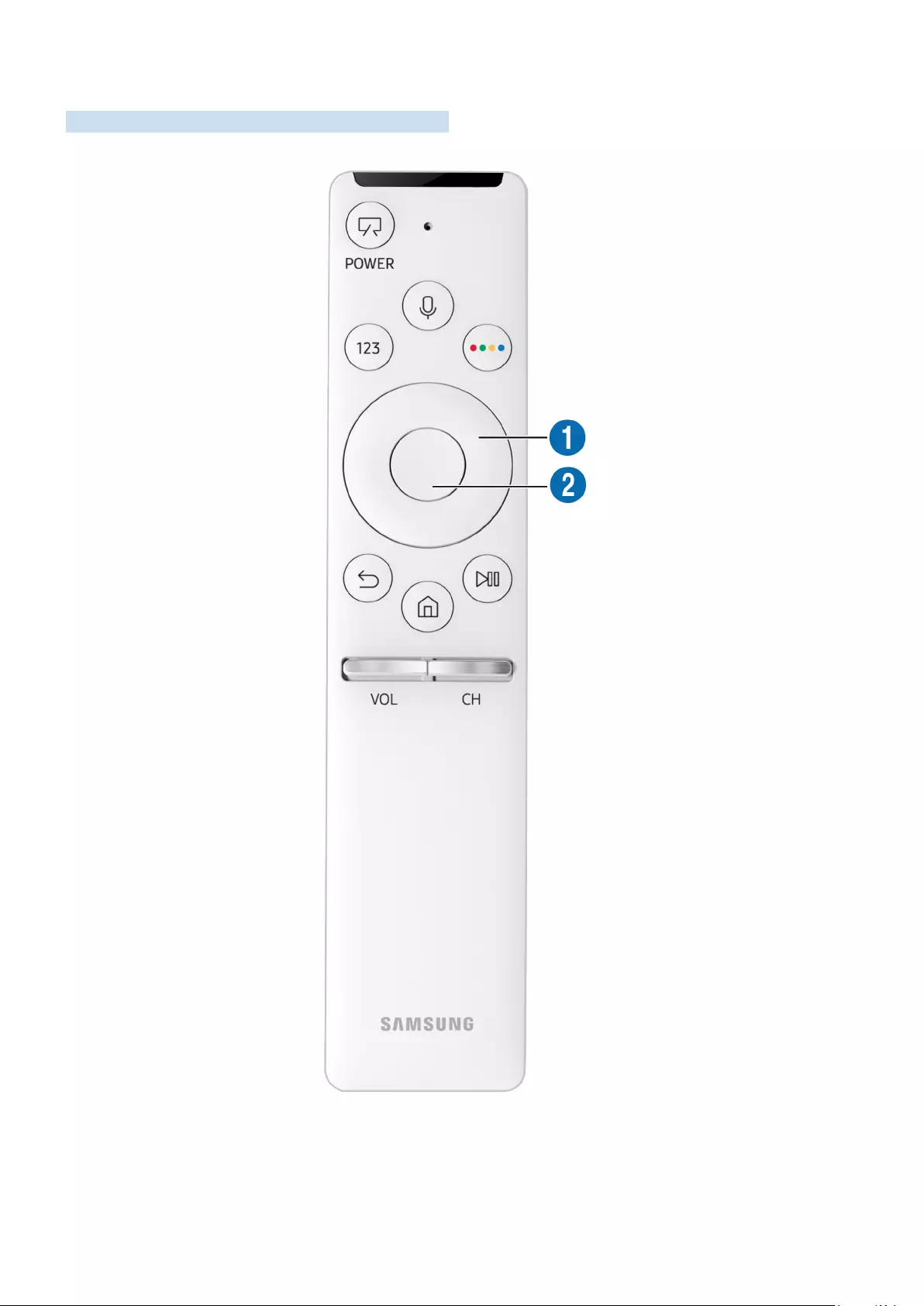
- 30 -
About the Samsung Smart Remote (THE FRAME)
Learn about the buttons on the Samsung Smart Remote.
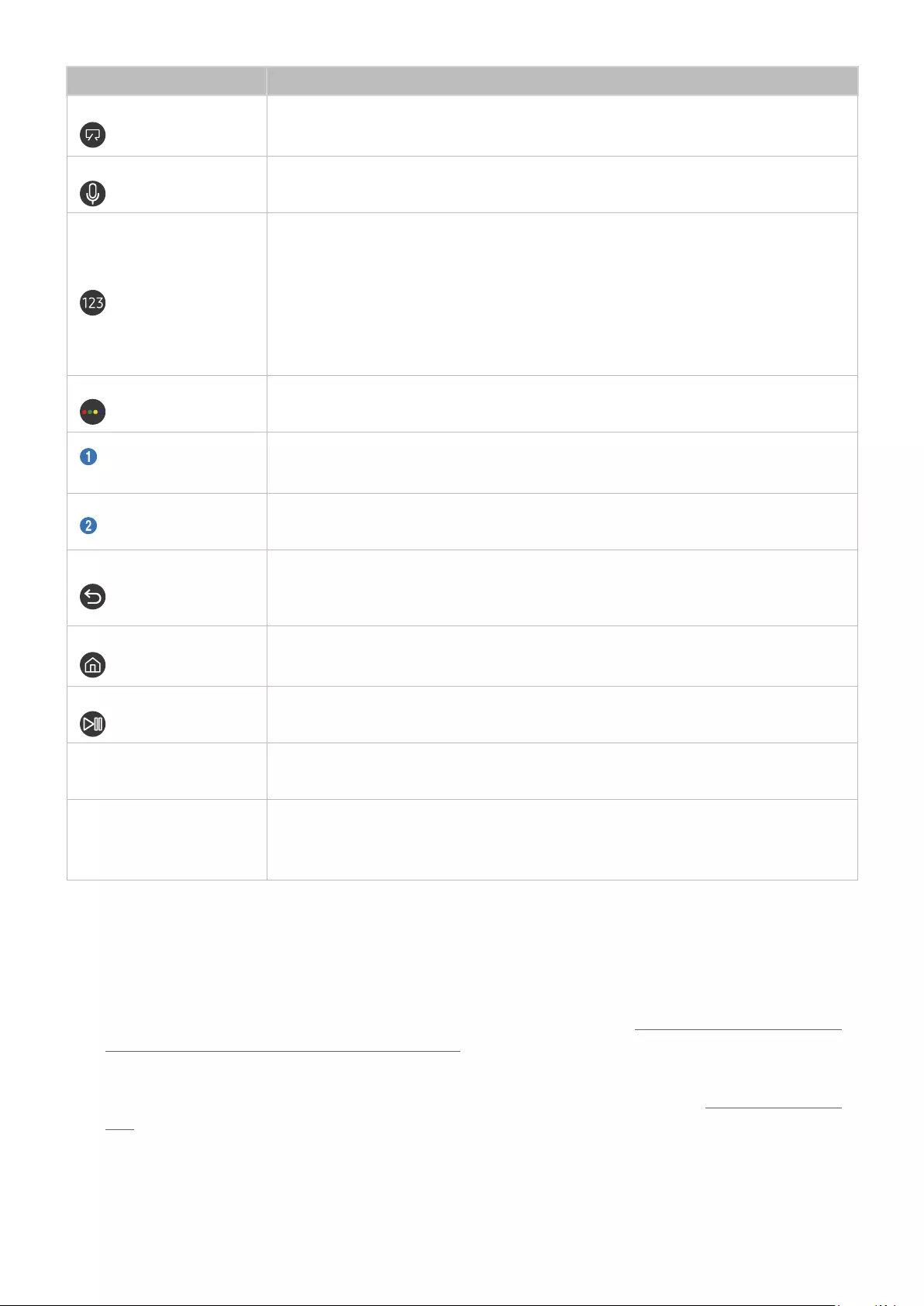
- 31 -
Button Description
(Power)
When watching TV, press to switch to Art mode. In Art mode, press to switch to watching TV.
Press and hold to turn off the TV completely.
(Voice recognition)
Runs Voice Interaction. Press the button, say a voice command, and then release the button
to run Voice Interaction. When pressed once, the guide to Voice Interaction appears.
Virtual numeric pad
When pressed, the virtual numeric pad appears on the screen so that you can enter a
numeric value using it.
Select numbers and then select Done to enter a numeric value. Use to change the channel,
enter a PIN, enter a ZIP code, etc.
If the Colour Button appears with a number strip on the screen, select the Colour Button and
then select a specific colour by using the directional pad (up/down/left/right). Use this to
access additional options that are specific to the feature in use.
4 Colour button
Use these coloured buttons to access additional options that are specific to the feature in
use.
Directional pad (up/
down/left/right) Moves the focus.
Select Selects or runs a focused item. When pressed while you are watching content, detailed
programme information appears.
(Return)
Press to return to the previous menu. When pressed for 1 second or more, the running
function is terminated. When pressed while you are watching a programme, the previous
channel appears.
(Smart Hub)
Press to return to the Home Screen.
Press in Art mode to switch to TV mode.
(Play/pause)
When pressed, the playback controls appear. Using these controls, you can control the
media content that is playing.
VOL (Volume) Move the button up or down to adjust the volume. To mute the sound, press the button.
When pressed for 1 second or more, the Accessibility Shortcuts appears.
CH (Channel)
Move the button up or down to change the channel. To see the Guide screen, press the
button.
Press and hold the button up or down to quickly change the channel.
"Use the Samsung Smart Remote less than 6 m from the TV. The usable distance may vary with the wireless environmental
conditions.
"The images, buttons, and functions of the Samsung Smart Remote may differ with the model.
"To use the Samsung Smart Remote to control a compatible external device that does not support HDMI-CEC (Anynet+), you
must configure universal remote control for the device. For more information, refer to "Controlling External Devices with
the Samsung Smart Remote - Using the Universal Remote."
"To use the Samsung Smart Remote to control a compatible external device that does support HDMI-CEC (Anynet+),
connect the device to an HDMI port on the TV using an HDMI cable. For more information, refer to "Using Anynet+ (HDMI-
CEC)."
"This function may not be supported depending on the model or geographical region.
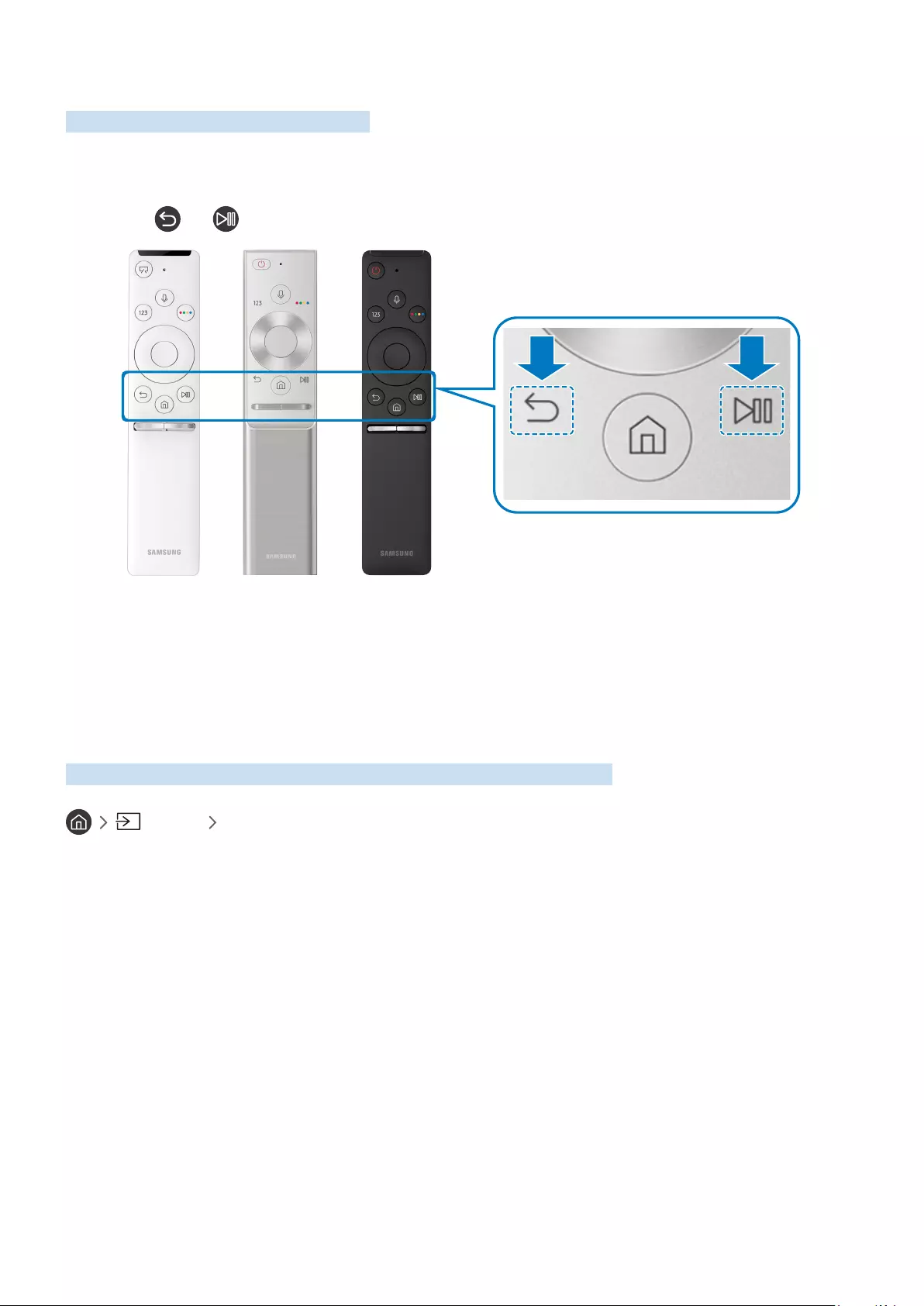
- 32 -
Connecting to the Samsung Smart Remote
Pair the TV with the Samsung Smart Remote.
When you turn on the TV for the first time, the Samsung Smart Remote pairs to the TV automatically. If the Samsung
Smart Remote does not pair to the TV automatically, point it at the remote control sensor of the TV, and then press
and hold the and buttons simultaneously for 3 seconds or more.
"Availability depends on the specific model.
Controlling External Devices with the Samsung Smart Remote -
Using the Universal Remote
Control the TV and connected external devices with the Samsung Smart Remote.
Source Universal Remote
You can control external devices connected to the TV using the remote control. To control external devices, register
them by following the instructions on the screen.
"Availability depends on the specific model.
"You can also use the Anynet+ (HDMI-CEC) function to operate external Samsung devices with your TV's remote control
without any additional setup.
"Certain external devices connected to the TV may not support the universal remote feature.
"Do not place any obstacles in front of an external device. It may cause signals from the remote control to be transmitted
improperly.
"The TV memorises both the external device and its connection port (HDMI 1, HDMI 2, etc.).

- 33 -
Using Anynet+ (HDMI-CEC)
Control an external device connected via Anynet+ (HDMI-CEC) with the remote control.
You can use the TV's remote control to control external devices that are connected to the TV by an HDMI cable and
that support Anynet+ (HDMI-CEC). Note that you can only set up and operate Anynet+ (HDMI-CEC) with the remote
control.
Connecting an external device through Anynet+ and using their menus
Settings General External Device Manager Anynet+ (HDMI-CEC)
1.
Set Anynet+ (HDMI-CEC) to On.
2.
Connect an HDMI-CEC-compliant device to the TV.
3.
Turn on the connected external device. The device is automatically connected to the TV. After connection is
finished, you can access the menu of the connected device on your TV screen using your TV remote and control
the device.
"The connecting process can take up to 2 minutes to complete.
Read before connecting an Anynet+ (HDMI-CEC) device
"You can configure the TV's Universal Remote to control third-party cable boxes, Blu-ray players, and home theatres that
do not support HDMI-CEC. For more information, refer to "Controlling External Devices with the Samsung Smart Remote -
Using the Universal Remote."
"Anynet+ cannot be used to control external devices that do not support HDMI-CEC.
"Anynet+ (HDMI-CEC)-enabled devices must be connected to the TV with an HDMI cable. Note that some HDMI cables may
not support Anynet+ (HDMI-CEC).
"The TV remote control may not work under certain circumstances. If this occurs, set up the device as an Anynet+ (HDMI-
CEC)-enabled device again.
"Anynet+ (HDMI-CEC) works only with external devices that support HDMI-CEC and only when those devices are either in
standby mode or turned on.
"Anynet+ (HDMI-CEC) can control up to 12 compliant external devices (up to 3 of the same type) except for home theatres.
Anynet+ (HDMI-CEC) can control only one home theatre system.
"To listen to 5.1-channel audio from an external device, connect the device to the TV via an HDMI cable and connect a 5.1
home theatre system directly to the external device's digital audio output connector.
"If an external device has been set up for both Anynet+ and a universal remote control, the device can be controlled only
with the universal remote control.
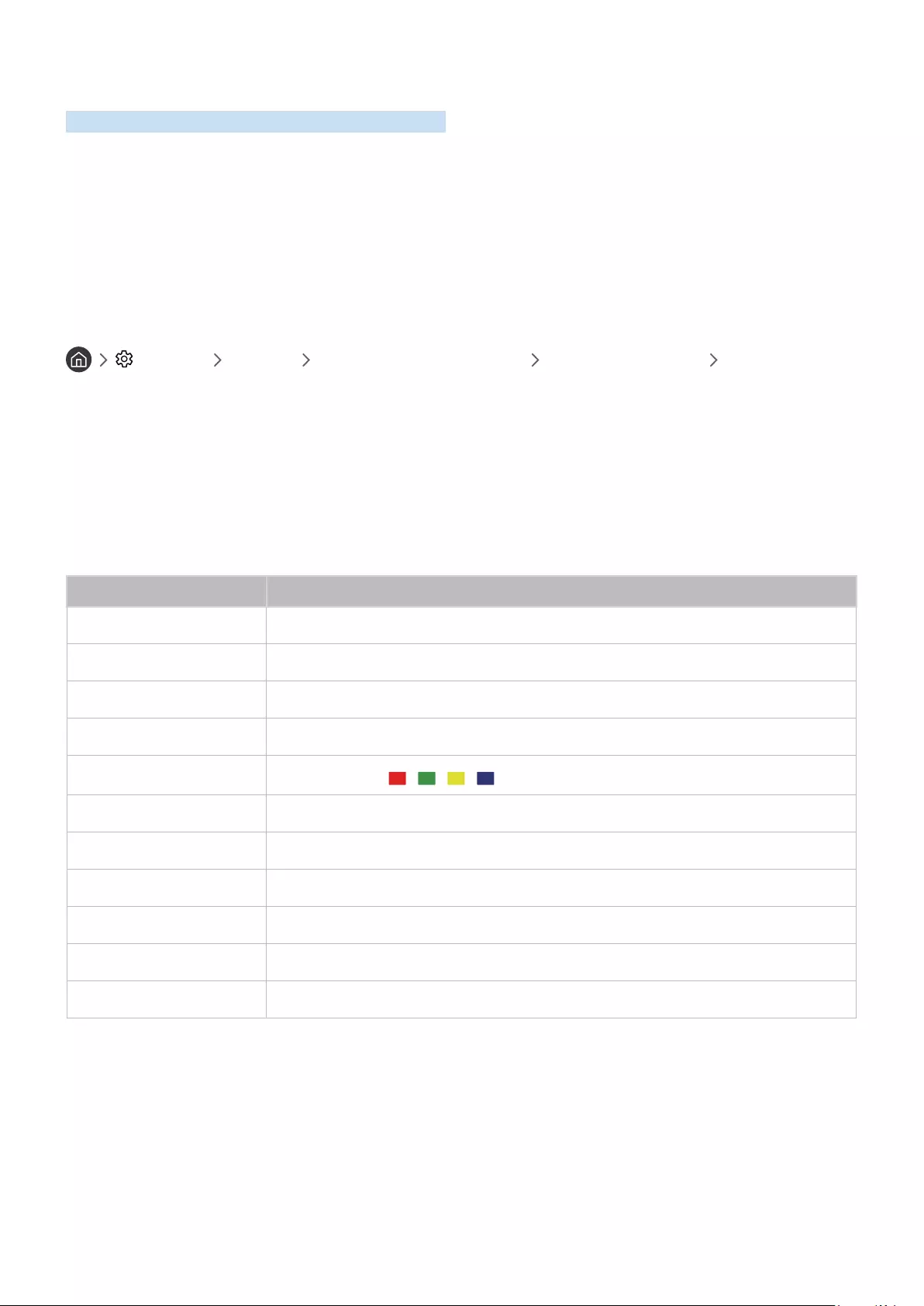
- 34 -
Controlling the TV with a Keyboard
Connecting a keyboard makes it easier to control the TV.
Connecting a USB keyboard
Plug the keyboard cable into the USB port.
Connecting a Bluetooth keyboard
Settings General External Device Manager Keyboard Manager Add Bluetooth
Keyboard
"This function is not available on certain models in specific geographical areas.
"If your device was not detected, position the keyboard close to the TV, and then select Refresh. The TV scans for available
devices again.
Using the keyboard
Keyboard Remote control functions
Directional keys Moves the focus
Windows key Displays the TV settings
Enter key Selects or runs a focused item
ESC key Returns to the previous screen
F1 / F2 / F3 / F4 key Colour buttons ― / / /
F5 key Launches the Home Screen
F6 key Displays the source screen
F7 key Launches the Channel List
F8 key Mutes the sound
F9 / F10 key Adjusts the volume
F11 / F12 key Changes the channel

- 35 -
Setting up the keyboard
In Settings General External Device Manager Keyboard Manager, you can set the following
functions.
●Keyboard Language
●Keyboard type
Entering Text using the On-Screen QWERTY Keyboard
Use the QWERTY keyboard to enter text on your TV.
Recommend text
Options Predict Next Character
"The image on your TV may differ from the image above depending on your model and geographical area.

- 36 -
Using additional functions
Select on the QWERTY keyboard screen. The following options are available:
"The options available may differ depending on the function running currently.
●Recommend text
●Reset Recommended Text Memory
●Predict Next Character (when using direction buttons)
●Language
Entering Text using the remote control's microphone and the on-screen
QWERTY keyboard
When the QWERTY keyboard is on the screen, press and hold the button on the Samsung Smart Remote, speak
into the microphone on the Samsung Smart Remote, and then release the button. What you say appears on the
screen as text.
"This function is not available on certain models in specific geographical areas.

- 37 -
Smart Features
You can enjoy various apps with Smart Hub.
Smart Hub
View descriptions of Smart Hub's basic functions.
After pressing the button on your remote control, you can surf the web and download apps with Smart Hub.
"Some of the Smart Hub services are paid services.
"To use Smart Hub, the TV must be connected to the Internet.
"Some Smart Hub features may not be available depending on the service provider, language, or region.
"Smart Hub service outages can be caused by disruptions in your Internet service.
"You can view the entire text of the Terms & Policy document by navigating to Settings Support Terms &
Policy. If you want to stop using Smart Hub, you can cancel the agreement. Try Now
"To cancel the Smart Hub service agreement though it is a required one, select Reset ( Settings Support
Self Diagnosis Reset), and then press the right directional button at the Smart Hub Terms & Conditions, Privacy Policy
step.
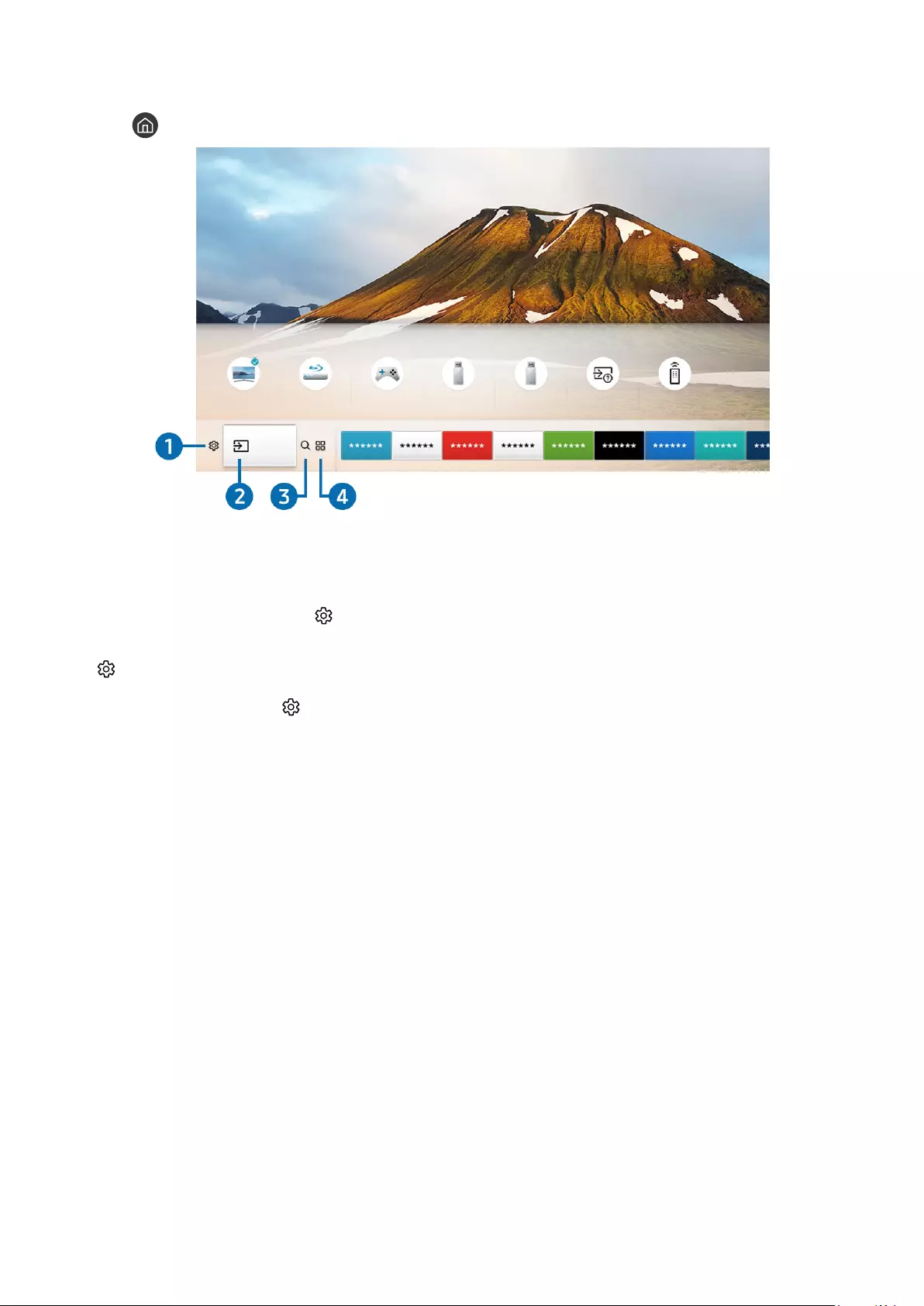
- 38 -
Displaying the Home Screen
Press the button.
Source
TV HDMI 1 HDMI 2 USB 1 USB 2 Connection
Guide
Universal
Remote
Source
"The image on your TV may differ from the image above depending on your model and geographical area.
On the Home Screen, you can easily run the apps you have used previously or frequently. The apps can also be moved
or deleted from the screen. Pressing Settings displays all setting menus available.
1 Settings
When the focus is moved to the icon, a list of quick settings icons appears above the top of the menu. You can
quickly set frequently used functions by clicking the icons.
●Picture Mode
You can select the picture mode that provides the best viewing experience.
●Sound Mode
You can select a sound mode to optimise your listening experience.
●Sound Output
You can select which speakers the TV uses for audio output.

- 39 -
●Audio Language
You can select a audio language.
●Subtitle
Turns the subtitles on or off.
"The actual name may differ with the geographical area. (Subtitle or Caption)
●Sleep Timer
You can automatically shut off the TV after a pre-set period of time.
●Network
You can view the current network and Internet status.
2 Source
You can select an external device connected to the TV.
"For more information about connecting external devices, refer to "Switching between external devices connected to the
TV."
3 Search
You can search the apps or games in Smart Hub services.
4 APPS
You can enjoy a wide range of content including news, sports, weather, and games by installing the corresponding
apps on your TV.
"To use this feature, the TV must be connected to the Internet.
"For more information, refer to "Using the Apps Service."
Art
You can use the Art mode function to edit image content such as artworks or pictures when you are not watching TV
or when the TV is turned off, and then display the content in full screen mode.
"This function is supported only in THE FRAME model.
"For more information, refer to the provided user manual.

- 40 -
Move
Remove
5 Moving an item on the Home Screen
Move the focus to the app you want to move, press the down directional button on the remote control, and then
select Move. Move the app to the desired position by pressing the left or right directional button, and then press the
Select button. The selected app is moved on the Home screen.
6 Removing an item on the Home Screen
Move the focus to the app you want to delete, press the down directional button on the remote control, and then
select Remove. The selected app is deleted.
Launching Smart Hub automatically
Settings General Smart Features Autorun Smart Hub
When you set Autorun Smart Hub to On, the TV displays the Home Screen automatically when you turn the TV on.
Launching the last used app automatically
Settings General Smart Features Autorun Last App
If Autorun Last App is set to On, the last used app is automatically run when you turn on the TV.

- 41 -
Testing Smart Hub connections
Settings Support Self Diagnosis Start Smart Hub Connection Test
Resetting Smart Hub
Settings Support Self Diagnosis Reset Smart Hub
Using a Samsung account
Create and manage your own Samsung account.
Settings General System Manager Samsung Account
Creating and managing your Samsung account
"You can view the entire text of the Terms & Policy in Settings General System Manager Samsung
Account My Account Samsung account Privacy Policy after logging in to your Samsung account.
"You can also create a Samsung account at http://account.samsung.com. Once you have an account, you can use the same
ID on both the TV and the Samsung website.
Creating a new account
Settings General System Manager Samsung Account (Add Account) Create
Account
To create a new Samsung account, follow the instructions on the screen.
"For more information about the terms, select View Details.
"To protect personal information, select Profile image selection and password entry (High security) in the field below the
password entry bar.
"If you want the TV to log you into your account automatically whenever you turn on the TV, click Sign me in automatically.
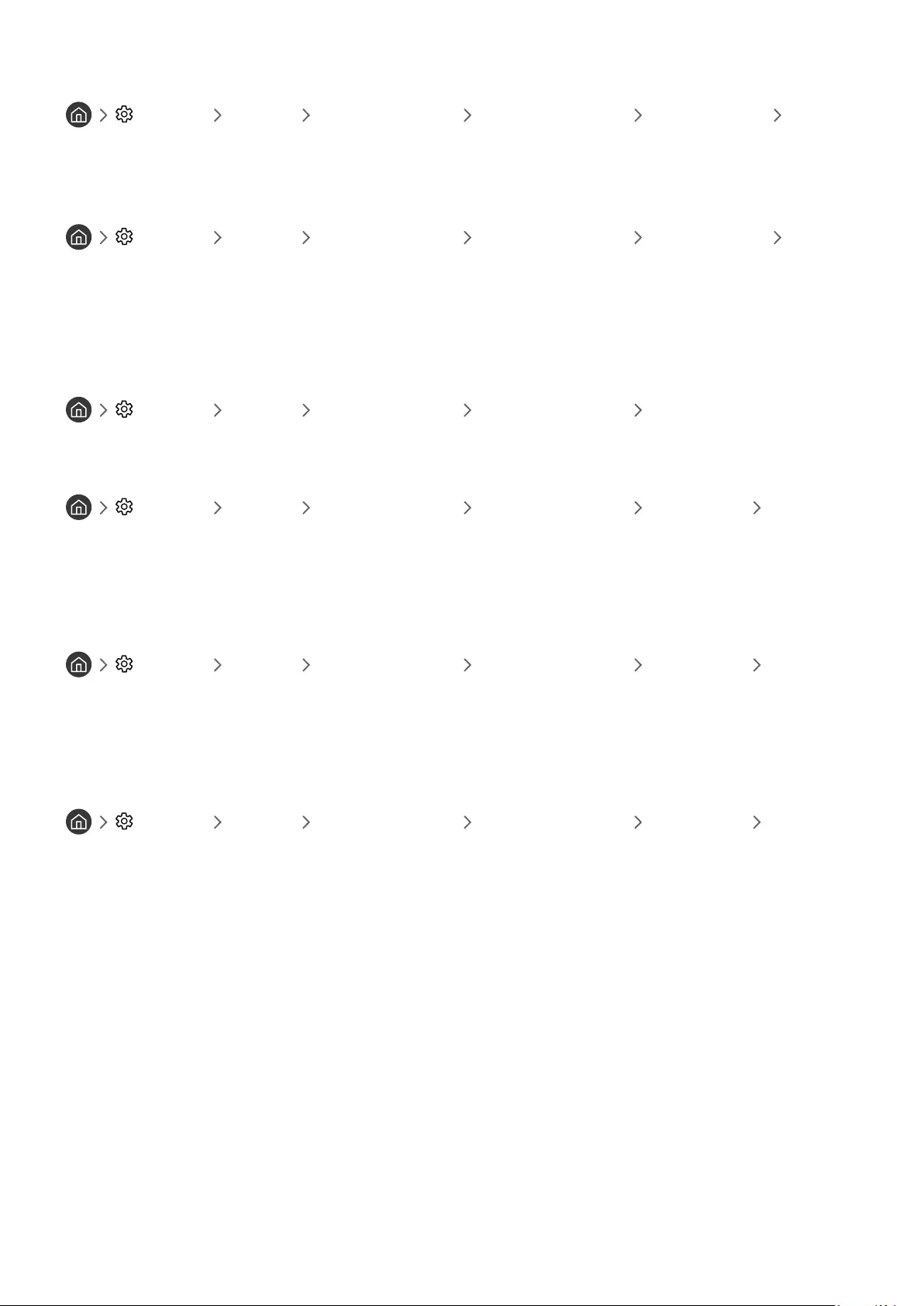
- 42 -
Creating a Samsung account using a Facebook account
Settings General System Manager Samsung Account (Add Account) Create
with Facebook
Creating a Samsung account using a PayPal account
Settings General System Manager Samsung Account (Add Account) Create
with PayPal
"This function is only available on certain models in specific geographical areas.
Signing in to a Samsung account
Settings General System Manager Samsung Account Sign In
Changing and adding information to a Samsung account
Settings General System Manager Samsung Account My Account Edit
profile
"To change the account information, you must be logged in to your Samsung account.
Managing payment information saved on the TV
Settings General System Manager Samsung Account My Account Payment
Info
"To manage the payment information, you must be logged in to your Samsung account.
Configure the sync internet settings
Settings General System Manager Samsung Account My Account Sync
Internet
"To configure the sync internet settings, you must be logged in to your Samsung account.

- 43 -
Deleting a Samsung account from the TV
Settings General System Manager Samsung Account My Account Remove
Account
"To remove account information, you must be logged in to your Samsung account.
Signing out of your Samsung account
To sign out of your Samsung account, move the focus to your account at Settings General System
Manager Samsung Account, and then press the Select button. When a pop-up message appears, select Yes.
Viewing the user agreement and privacy policy
Settings General System Manager Samsung Account My Account Samsung
account Privacy Policy
"To view the user agreement and privacy policy, you must be logged in to your Samsung account.
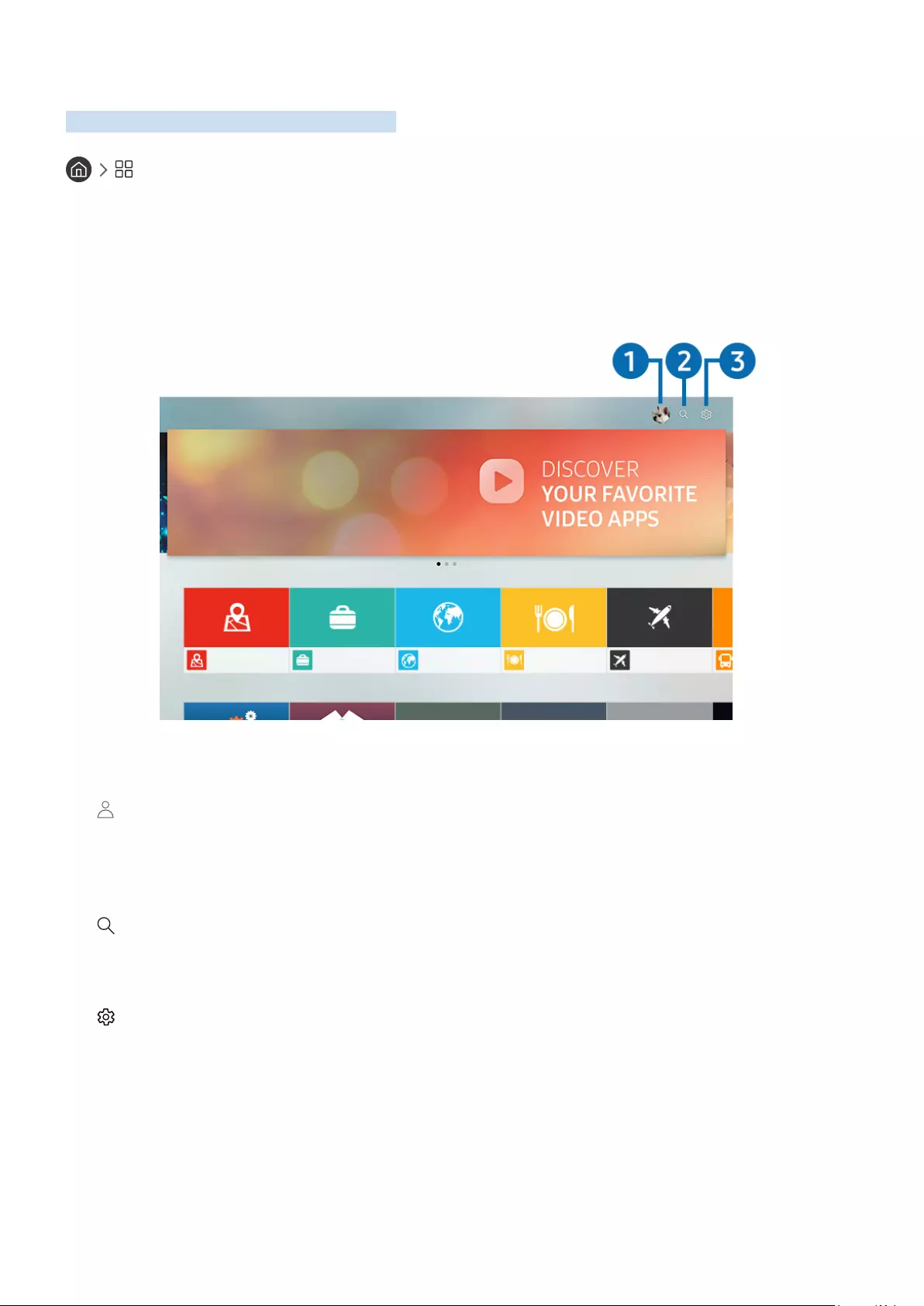
- 44 -
Using the Apps Service
Download and run various apps from Smart Hub.
APPS
You can enjoy a wide range of content including news, sports, weather, and games by installing the corresponding
apps on your TV.
"To use this feature, the TV must be connected to the Internet.
"When Smart Hub is launched for the first time, the default apps are automatically installed. The default apps may differ
with the geographical area.
APPS
Editor's Choice
Most Popular
"The image on your TV may differ from the image above depending on your model and geographical area.
1 Sign In
Selecting Sign In displays the Samsung Account screen on which you can create a Samsung account or log in to the
system.
2 App Search
You can search for available apps.
3 Settings
You can manage the installed apps.

- 45 -
Installing and running an app
Installing an app
1.
Move to the app you want to install, and then press the Select button. The detailed information screen appears.
2.
Select Install. When the installation is complete, you can run the app immediately.
"You can view installed apps on the Settings screen.
"When the TV's internal memory is insufficient, you can install an app on a USB device.
"You can run an app installed on a USB device only when the USB device is connected to the TV. If the USB device is
disconnected while an app is running, the app is terminated.
"You cannot run an app installed on a USB device on a PC or another TV.
Launching an app
You can run the app desired from Downloaded App.
The icons below appear within the selected app's icon and indicate the following:
● : The app is installed on a USB device.
● : The app has a password.
● : The app is installed.
● : The app needs to be updated.
● : The app supports Smart View.
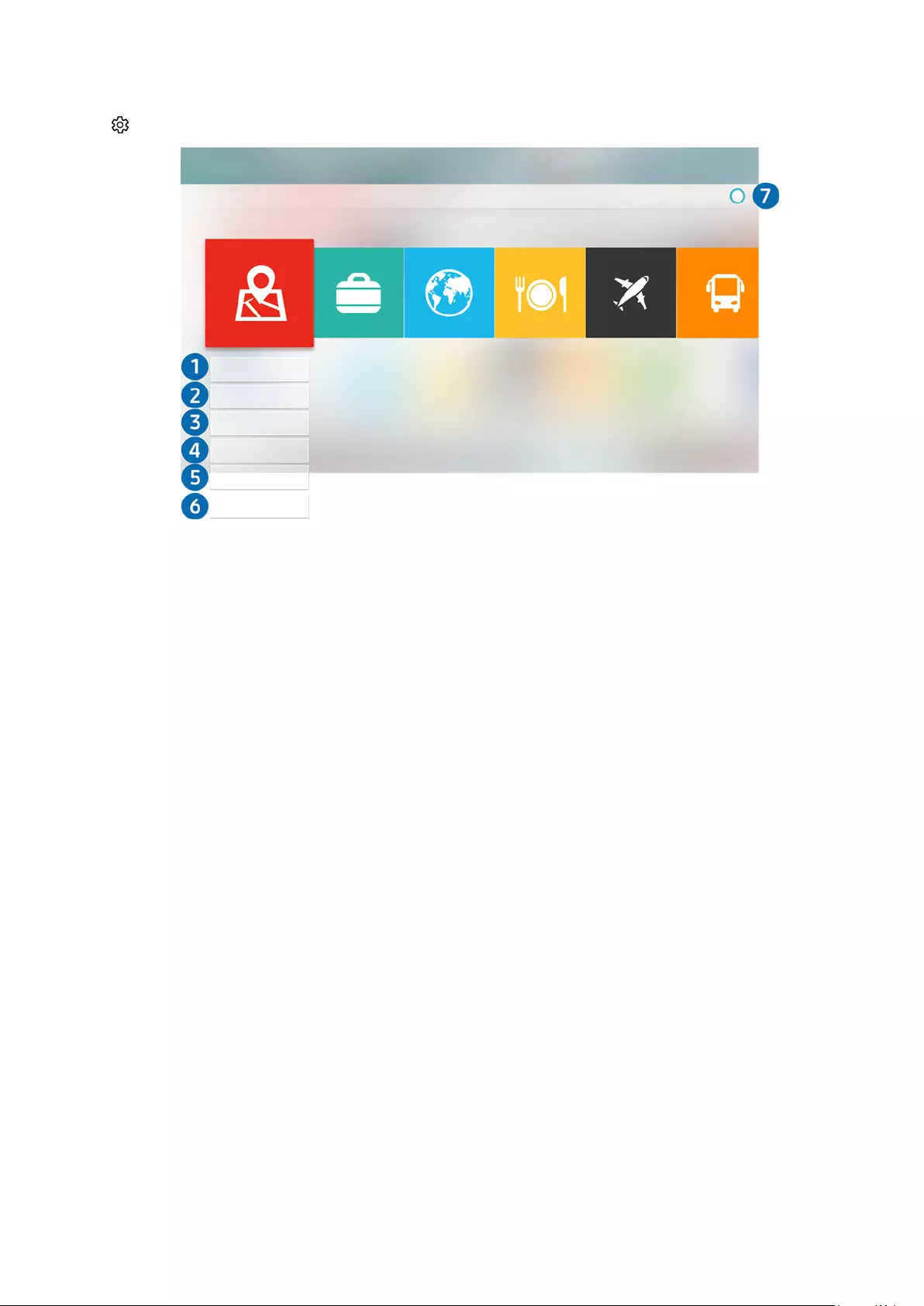
- 46 -
Managing purchased or installed apps
Select Settings on APPS. You can manage installed apps.
Settings
Auto update : On
Delete
Add to Home
Lock/Unlock
Move
Reinstall
View Details
"The image on your TV may differ from the image above depending on your model and geographical area.
1 Removing an app
1.
Select an app to delete.
2.
Select Delete. The selected app is deleted.
"Ensure that the related app data is also removed when you remove an app.
2 Adding apps to the Home Screen
1.
Select an app to add.
2.
Select Add to Home.
3.
After the Home screen appears, move the selected app to the desired location.
4.
Press the Select button. The selected app is added to the Home Screen.

- 47 -
3 Locking and unlocking apps
1.
Select an app to lock or unlock.
2.
Select Lock/Unlock. The selected app is locked or unlocked.
"To lock or unlock an app, enter the PIN. The default PIN is "0000." You can set the PIN in Settings General
System Manager Change PIN.
4 Moving apps
1.
Select an app to move.
2.
Select Move.
3.
Press the Select button.
"This function is not available on certain models in specific geographical areas.
5 Reinstalling an app
1.
Select the app to install again.
2.
Select Reinstall. Reinstallation starts.
6 Checking the app information details
1.
Select the app to check.
2.
Select View Details.
3.
The app information screen appears.
"You can rate an app on the detailed information screen using the left or right directional button on the remote.
7 Automatically updating apps
Installed apps can be automatically updated. If you do not want apps automatically updated, set Auto update to Off.
"Automatic update is enabled only when the TV is connected to the Internet.

- 48 -
Using the e-Manual
Control and read the manual embedded in your TV.
Launching the e-Manual
Settings Support Open e-Manual
You can view the embedded e-Manual that contains information about your TV's key features.
"Alternatively, you can download a copy of the e-Manual from Samsung's website.
"Words in blue (e.g., Picture Mode) indicate a menu item.
Using the buttons in the e-Manual
● (Search)
● (Index)
● (Recent pages)
● (Try Now): Allows you to access the corresponding menu item and try out the feature right away.
● (Link): Allows you to access the corresponding reference page.
"Some menu screens cannot be accessed from the e-Manual.
Using the Internet
Surf the Internet on your TV.
Internet
"When you select Internet, you can see recently viewed web sites or featured recommendations. When you select a
desired web site, you can get immediate access to it.
"You can use the Internet more easily after connecting a keyboard and mouse.
"You can scroll web pages with the Directional pad.
"The web pages may differ from those on a PC.
"For more information about the Internet, refer to "Read Before Using the Internet."
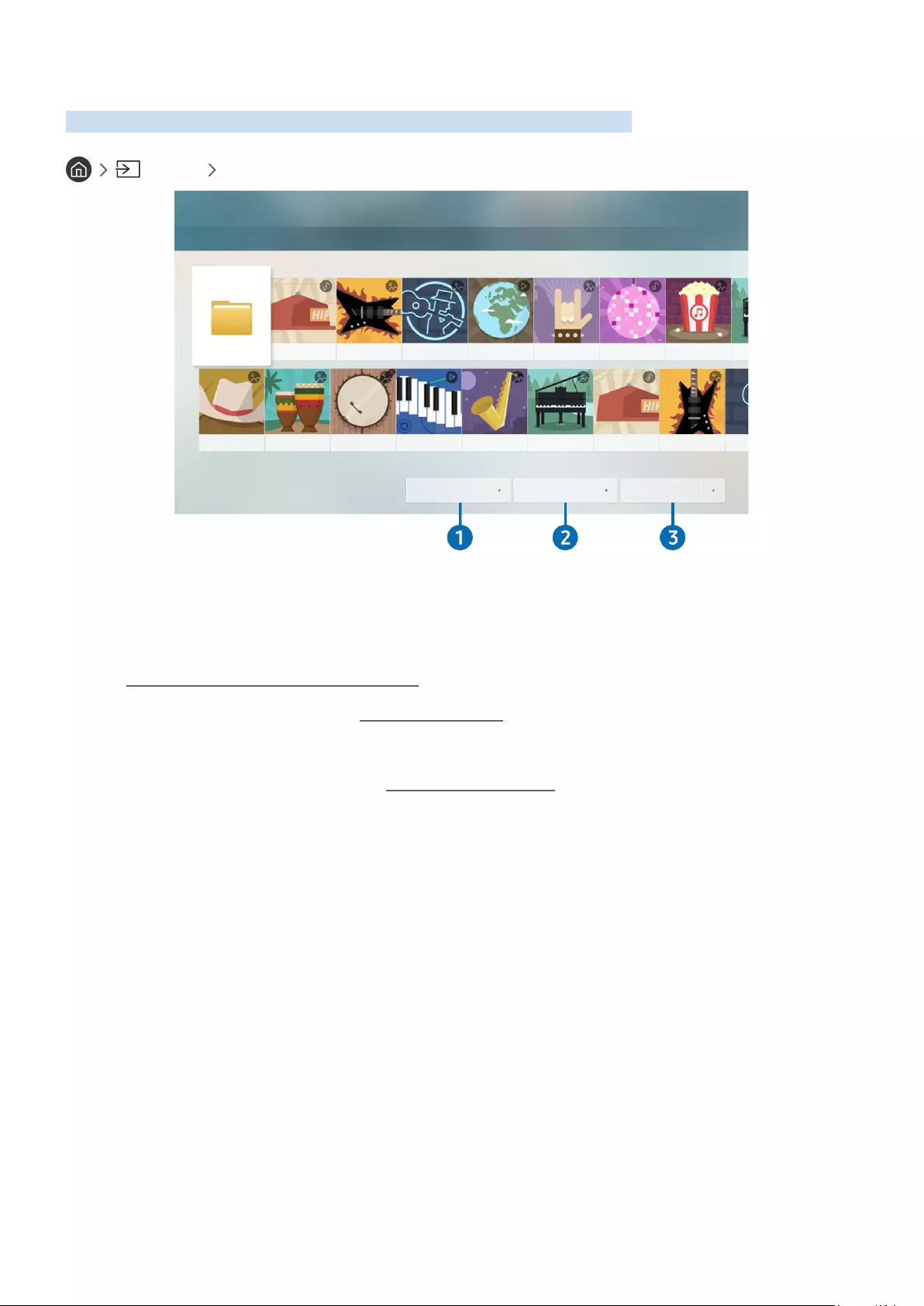
- 49 -
Playing pictures/video/music
Play media content stored on your TV, USB devices, smartphones, cameras, PCs, etc.
Source Connected Device
Samsung USB
Samsung USB
Filter By : All Sort By : Title Options
"The image on your TV may differ from the image above depending on your model and geographical area.
You can play media content saved on storage devices, such as USB devices, mobile devices, and cameras, on the TV.
"You cannot play media content if the content or the storage device is not supported by the TV. For more information, refer
to "Read Before Playing Photo, Video, or Music Files."
"To connect the TV to a computer, refer to "Connecting a Computer."
"Backup important files before connecting a USB device. Samsung is not responsible for damaged or lost files.
"To connect the TV to a mobile device, refer to "Connecting a Mobile Device."

- 50 -
You can use the following functions on the media content list screen of a storage device.
1 Filter By
Filters the media content by type of media. (music, photo, video, recorded contents, etc.)
2 Sort By
Sorts the content list.
3 Options
Deletes or plays the selected media content in the media content list. When you select Refresh, the content list is
reloaded.
"You can delete only the recorded content. To delete content, change the Filter By option to Recorded.
Playing media content
Playing multimedia content on USB device
1.
Connect a USB device to the USB port. A pop-up message appears that lets you move easily to the multimedia
content list on the device.
2.
Select a content item to play from the list. The content is played back.
Playing multimedia content on PC or mobile device
1.
Select a device with media content in Source. The media content list in the device appears.
2.
Select a media content item from the list. The content is played.
"For more information about buttons, refer to "Buttons and functions available while playing multimedia content."
"The content may not be played depending on the encoding method or file format. Furthermore, several functions may be
restricted.
"Content on devices connected to the TV via your network may not play smoothly due to the network communication
problems. If this occurs, use a USB device.
"For more information about connection to PC, refer to "Connecting a Computer."
"For more information about connection to mobile device, refer to "Connecting a Mobile Device."
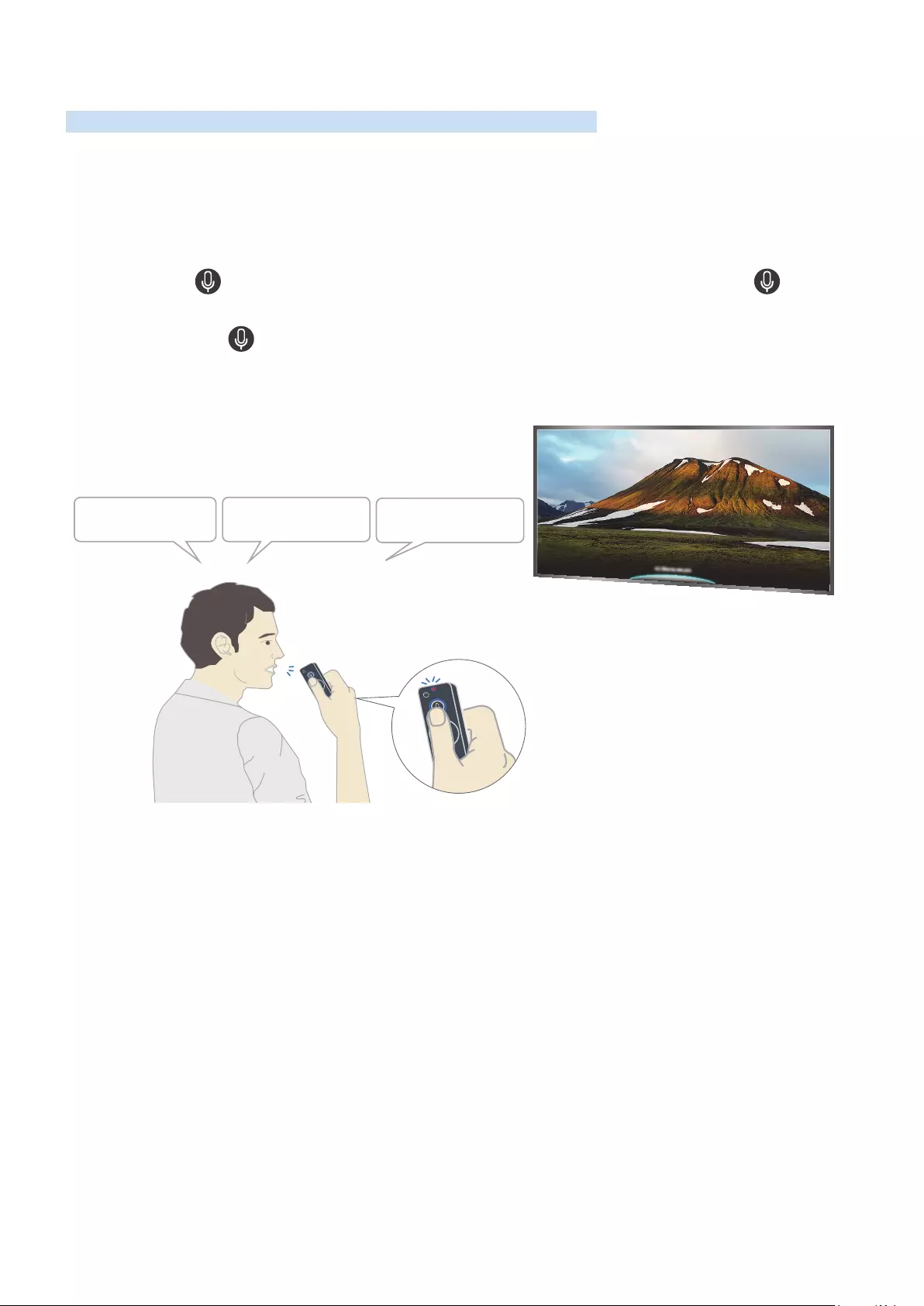
- 51 -
Using Voice Interaction
Speak into the microphone on your Samsung Smart Remote to control your TV.
"Availability depends on the specific model.
Running Voice Interaction
Press and hold the button on your Samsung Smart Remote, say a command, and then release the button.
The TV recognises the voice command.
"When you press the button once, the Help Guide is displayed. Use the Voice Interaction function as instructed in the
Guide.
"During voice analysis, the system cannot receive voice commands.
"SMART HUB" "HDMI" "USB"
●If you say an accessibility-related command such as "Subtitle" or "Voice Guide," the command is applied
directly and you will see a notification that the function is operating.
●When playing back media content, you can execute commands such as "Play," "Pause," "Stop," "Rewind," and
"Fast Forward."
"The function does not operate for all apps.

- 52 -
●You can set the timer with the command "Sleep reservation in 30 minutes."
●To change the source, say "HDMI," "TV," or "USB."
●To change the picture mode, say "Movie Picture Mode" or "Set Picture Mode to Standard."
●To search, say "Search ****" or "Search **** in YouTube."
●To view Help, say "Help," "What can I say" or "User guide."
"The supported language may differ by geographical region.
"When you press the button once, the Help Guide is displayed. Use the Voice Interaction function as instructed in
the Guide.
Read Before Using Voice Interaction
Precautions for voice interaction
●To use Voice Interaction, you must have a Samsung account. For more information, refer to "Using a Samsung
account."
●The supported voice interaction languages and features may differ by geographical region.
●If the language set differs from the language of your country, some features are not available.
●The function is available only when the TV is connected to the Internet.
●Voice interaction is available only on TVs that support it and come with remote controls that have a
microphone.

- 53 -
●Symbols including "-" and special characters are not supported. Consequently, if a word or sentence contains
numeric values or symbols, the function may not operate properly.
●Searched results may not provide complete results.
●You may be required to pay for some apps. Consequently, you may encounter a service application or contract.
●To change the current channel by saying channel names as voice commands, you must finish Set Up Service
Provider. ( Settings General Start Setup) Try Now
●To use the voice text input function and Smart search function, you must consent to provisions allowing third
parties to collect and use your voice data.
●To use the interactive voice interaction function, you must agree.
–Agree to Smart Hub's Terms of Use
–Agree to a guidance regarding the collection and use of personal information for the Smart Hub service.
–Consent to the collection and use of personal information for the voice interaction-based service.
Requirements for using voice interaction
●The voice interaction rate differs with the volume/tone, pronunciation, and ambient sound environment (TV
sound and ambient noise).
●The optimal volume for voice commands is between 75 dB and 80 dB.

- 54 -
TV Viewing
You can use convenient features while watching TV. Additionally, you can edit the channel list or create favourite
channel lists.
Viewing Digital Broadcast Information at a Glance
See an overview of each channel's programme lineup.
Using the guide
Live TV Guide
Guide Channel List Recordings
"The image on your TV may differ from the image above depending on your model and geographical area.
In the Guide, you can see the daily programme schedules for each broadcaster, see programme information, choose
a programme to watch, and set up a schedule viewing or recording.
"The Guide also appears when you press the CH button while watching TV.
"To see information about analogue channels and use the analogue channel functions of the Guide, you must finish the
service provider settings in initial setup.
"To view the Guide, you must first set the TV's clock ( Settings General System Manager Time Clock).

- 55 -
To start Scheduled viewing, Scheduled recording, and other function for a programme listed in the Guide, first move
the cursor to it and then operate the remote control as follows:
–For a programme currently being broadcast: Press and hold the Select button.
–For a programme scheduled to be broadcast: Press the Select button.
–To move to the Channel Filter or Schedule Manager screen: Press the button.
●Record: You can make a recording of a current programme.
●Timeshift: The current broadcasting programme you are viewing is automatically saved on a USB device so
that you can play, pause, rewind, fast forward, slow rewind, slow forward, and even perform slow motion on
the programme like a DVD title.
●Schedule Viewing: You can schedule viewing of a broadcast scheduled programme.
"For more information about watching or Schedule Viewing, refer to "Setting Up a Schedule Viewing."
●Schedule Recording: You can schedule recording of a broadcast scheduled programme.
"For more information about recording or Schedule Recording, refer to "Recording Programmes."
●Edit Recording Time: You can change the start and end times of scheduled programme recordings.
●Stop: You can stop the recording or Timeshift function that is currently running.
●Cancel Scheduled Viewing / Cancel Scheduled Recording: You can cancel scheduled viewings or recordings.
●View Details: You can see detailed information about the selected programme. The information may differ
with the broadcast signal. If information is not provided with the programme, nothing appears.
●Channel Filter: You can select a channel filter from a filter list to see a list of channels filtered accordingly.
●Schedule Manager: You can see the Recording & Schedule Manager screen.
●Aerial: You can change the broadcast signal to receive.

- 56 -
Recording Programmes
Record a current or upcoming programme using a USB device instead of a video recorder.
"Read all precautions before using the recording feature. Refer to "Before Using the Recording and Timeshift Functions" for
more information.
"You can record only the programmes that have been received through an aerial.
"The appears next to the programmes and channels scheduled for recording.
"This function is only available on certain models in specific geographical areas.
"If you go to Live TV while no USB device is connected, the Schedule Manager screen appears in place of the
Recordings screen.
Recording programmes
Using the instant and schedule recording options from the guide screen
●Instant Recording
Select a live programme from the Guide, press and hold the Select button, and then select Record from the
pop-up menu to start recording immediately.
●Schedule Recording
Select a programme scheduled to be broadcast, press the Select button, and then select Schedule Recording
to set up a schedule recording of the scheduled programme.
Using the instant and schedule recording options while watching a programme
●Instant Recording
If you select Record after pressing the button while watching a broadcast, recording starts.
●Schedule Recording
Press the Select button while watching a programme to display the programme info window. Use the left or
right directional button to select a scheduled programme. Press the Select button, and then select Schedule
Recording to set up a schedule recording of the scheduled programme.

- 57 -
Scheduling a video recording after entering the date and time
Live TV Schedule Manager or Recordings Schedules Add Recording
To schedule a recording, set the values for Aerial, Channel, Repeat, Date, Start Time, and End Time of the broadcast
programme to record, and then select Save.
"Check the current time in Settings General System Manager Time Clock.
Managing the schedule recording list
Live TV Schedule Manager or Recordings Schedules
You can change scheduled recording information or cancel scheduled recordings.
"You can schedule up to 30 recordings or viewings at once using Schedule Recording and Schedule Viewing.
Setting the Schedule Recording Time
Live TV Schedule Manager or Recordings Schedules Edit
You can set the start and end times for a schedule recording. You can set the start time up to 10 minutes before the
programme starts and the end time up to 10 minutes after the programme ends.
Canceling a schedule recording
Live TV Schedule Manager or Recordings Schedules Delete
Checking scheduled recordings
Live TV Schedule Manager or Recordings Schedules View Details
Viewing recorded programmes
Live TV Schedule Manager or Recordings Recordings
Select a file containing a recording from the list. The file is played back.
"Buttons that appear may differ depending on the file being played. For more information about control buttons, refer to
"Buttons and functions available while recording a programme or Timeshift."
"This function is only available on certain models in specific geographical areas.

- 58 -
Setting Up a Schedule Viewing
Configure the TV to show a specific channel or programme at a specific time and date.
"The appears next to programmes that have been configured for a schedule viewing.
"To set up a schedule viewing, you must first set the TV's clock ( Settings General System Manager Time
Clock).
Setting up a schedule viewing for a channel
Using the schedule viewing options from the guide screen
On the Guide screen, select a programme you would like to view, press the Select button, and then select Schedule
Viewing in the pop-up menu that appears.
Using the schedule viewing options in the programme info window
Press the Select button while watching TV. The Programme Info window appears. Select a programme that will be
broadcast using the left or right directional buttons. Press and hold the Select button, and then select Schedule
Viewing to schedule viewing of that programme.
Using schedule viewing to view programmes at a specified time on a specified date
Live TV Schedule Manager or Recordings Schedules Add Viewing
To schedule a Viewing, set the values for Aerial, Channel, Repeat, Date, and Start Time of the broadcast programme
to record, and then select Save.
Check the current time in Settings General System Manager Time Clock.

- 59 -
Editing a schedule viewing
Live TV Schedule Manager or Recordings Schedules
"You can set up a maximum total of 30 Schedule Viewing and Schedule Recording entries.
Setting the Schedule Viewing Time
Live TV Schedule Manager or Recordings Schedules Edit
"You can set the start time of a schedule viewing. The start time can be set up to 10 minutes before the programme starts.
Canceling a schedule viewing
Live TV Schedule Manager or Recordings Schedules Delete
Checking scheduled viewings
Live TV Schedule Manager or Recordings Schedules View Details
Using Timeshift
Play, pause, or rewind live TV.
You can pause and rewind live TV by using Timeshift. Activating this function disables the Broadcasting function.
To activate the Timeshift function while watching TV, press the button and then select Timeshift, or press the
button.
"When the Timeshift function is running, some of function is not available in Settings Broadcasting.
"To use Timeshift, you must connect a USB device for recording.
"Read all precautions before using the Timeshift function. For more information, refer to "Before Using the Recording and
Timeshift Functions."
"This function is only available on certain models in specific geographical areas.
"For more information about control buttons, refer to "Buttons and functions available while recording a programme or
Timeshift."

- 60 -
Buttons and functions available while recording a programme or Timeshift
"The available buttons and functions may differ with the functions.
If you press the down directional button, the following buttons appear.
●Edit Recording Time
You can set for what period of time the programme will be recorded.
"This function is only available when a programme is being recorded.
●Record
You switch from the Timeshift function to the recording function. When switching to the recording function,
you can include the content recorded by the Timeshift function into the new recording.
"This function is only available when the Timeshift function is running.
●Go to Live TV
Select to return to the current scenes of the programme when the recording or Timeshift function is playing
its past scenes.
●Stop Recording / Stop Timeshift
Ends the recording or Timeshift function.
●Info
Displays the programme info window about the programme on which the recording or Timeshift function is
working.
●Pause / Play
You can use the following functions when the video is paused. (Note that with the video paused, the TV does
not play audio.)
–Slow Rewind or Slow Forward: Allows you to play the video slowly (1/8, 1/4, 1/2) backward or forward by
selecting the or button. To increase the rewind or forward speed in slow mode up to 3 times, select
the button repeatedly. To return to normal speed, select the button.
"When the Slow Rewind function is activated, you can view the difference between the current recording time
and the current rewind time.
–Jump Backward / Jump Forward: Allows you to move backward or forward by 10 seconds in the video by
selecting the left or right directional button in the playback control bar.
"When the Jump Backward function is activated, you can view the difference between the current recording time
and the current rewind time.
●Rewind / Fast Forward
"This function is not available while you are watching a programme that is currently being broadcast.

- 61 -
Using the Channel List
Change the channel or check programmes on other digital channels.
Live TV Channel List
Using the Channel List, you can change the channel or check programmes on other digital channels while watching
TV. On standard remote control, press the CH LIST button.
The All screen contains the following icons:
● : A favourite channel
● : A locked channel.
If you press the right directional button when viewing the Channel List screen, you can use the following functions:
●All
Displays the channels that have been automatically searched.
●TV PLUS
While the TV is connected to the Internet, you can watch popular programmes or highlights for each theme
through a virtual channel at any time. As in a general channel, it provides the daily programme schedules of
TV PLUS.
"This option is only available on certain models in specific geographical areas.
●Favourites
Displays favourites lists 1 to 5.
●Channel Type
Sorts the list so that it includes channels of a selected genre only. However, Channel Type can only be used
channels contain the genre information.
●Sort
Sorts the list by Channel Number or by Name.
"This option is only available on digital channels.
●Aerial
Allows you to choose between Terrestrial, Cable, and Satellite.
"This option is only available on certain models in specific geographical areas.

- 62 -
Editing channels
Edit the channels stored on your TV.
Live TV Channel List All Edit Channels
The Edit Channels screen icons indicate the following:
● : A favourite channel
● : A locked channel.
Removing registered channels
To remove a channel, select it, and then select Delete.
Editing registered channels
You can access the following options by selecting All Edit Channels:
●Locking or unlocking a channel
After selecting a target channel in Edit Channels, select Lock or Unlock. Then the channel is locked or
unlocked. A locked channel cannot be viewed.
"If you want to set the password, set Settings Broadcasting Apply Channel Lock to On.
"For more information about how to set your password, refer to "Setting up a password."
●Changing a channel name
After selecting a channel to change in Edit Channels, select Rename channel to change the channel name.
"This function is only available for selected channels.
"This function is only available for analogue broadcasts.
●Change Number
"This function is only available on certain models in specific geographical areas.
"When a channel number is changed, its channel information is not updated automatically.
●Restore TV PLUS
You can re-scan and store TV PLUS channels that have been received.
"This function is only available on certain models in specific geographical areas.
"If there are TV PLUS channels on the TV, after deleting the stored channels, the system stores the newly scanned
channels.
"If the TV has saved TV PLUS channels, Restore TV PLUS deletes the existing list, and then saves the newly scanned
channels.

- 63 -
Creating a Personal Favourites List
Designate frequently watched channels as favourite channels.
Favourite channels are highlighted in the Edit Channels and All screens with the symbol.
Registering channels as favourites
Live TV Channel List
1.
Press the right directional button on your remote control.
2.
Select Favourites.
3.
Select one of the five favourites lists.
4.
Move to Edit Favourites.
5.
Select a channel to add to the favourites list.
6.
Select . The selected channel is registered in the favourites list.
Viewing and selecting channels on Favourites lists only
Live TV Channel List
1.
Press the right directional button on your remote control.
2.
Select Favourites.
3.
Select the desired list among the five favourites lists on the screen. The channels in the selected favourites list
appear.
"Only favourites lists that contain registered channels will display channels.

- 64 -
Editing a Favourites List
Edit a favourites channel list.
Live TV Channel List
After pressing the right directional button on your remote control, select Favourites Favourites 1 - Favourites 5
Edit Favourites. The Edit Favourites screen appears.
Adding channels to favourites list
Select channels to add and select the icon. The selected channels are added to Favourites.
Removing channels from a favourites list
Select channels in a favourites list, and then select the button.
Rearranging a favourites list
Select one or more channels, and then select Change order. The Change order highlight appears. Press the up/down
directional buttons to indicate the new location for the channels. Press the Select button to set the channels into
their new location.
Renaming a favourites list
Select the favourites list you want to rename, and then select Rename Favourites. Enter a new name using the on-
screen keyboard that appears, and then select Done.

- 65 -
TV-Viewing Support Functions
Use the functions that are supported by digital or analogue channels.
Changing the broadcast signal
Live TV Channel List
After pressing the right directional button on your remote control, select Aerial to choose Terrestrial or Cable.
"You do not need to use this function if your TV is connected to a cable or satellite box.
Scanning for available channels
Settings Broadcasting Auto Tuning Try Now
"This function is only available on certain models in specific geographical areas.
"If the TV is connected to a cable box or satellite receiver, you do not need to do this.
"DVB-T2 system may not be available in specific geographical areas.
Restricting Viewing to Specific Channels
Settings Broadcasting Apply Channel Lock Try Now
By selecting the Select button on the menu, you can turn on or off the channel lock function.

- 66 -
Selecting the broadcasting audio option
Settings Broadcasting Dual Sound Try Now
Set audio options for stereo or bilingual broadcasts. For more information, refer to "Supported broadcasting audio
options."
"This function is not available on certain models in specific geographical areas.
Using Programme Rating Lock
Settings Broadcasting Programme Rating Lock Try Now
"This function is dependent on the specific model and area.
The Programme Rating Lock blocks programmes with ratings higher than those desired. This is useful for controlling
what children watch on TV. This will not function for programmes originating from external sources, such as DVD
players or USB files.
This PIN is required to watch a blocked programme.
"The Broadcasting is not available in HDMI or Component mode.
"Programme Rating Lock may not be supported depending on your input signal.
Configuring advanced broadcasting settings
Settings Broadcasting Expert Settings Try Now

- 67 -
Selecting the broadcast audio language
Settings Broadcasting Expert Settings Audio Options
This is the language you will hear while watching TV if the language is included in the broadcast signal. Audio
Options functions differently for analogue and digital channels.
"This function is not available on certain models in specific geographical areas.
Selecting a Language
Settings Broadcasting Expert Settings Audio Options Audio Language
Settings
"The available language may differ with the broadcast.
Selecting a Audio Format
Settings Broadcasting Expert Settings Audio Options Audio Format
"The supported audio format may differ with the broadcast programme.
"This option is only available on digital channels.

- 68 -
Tuning broadcast signals manually
Settings Broadcasting Expert Settings Manual Tuning
You can scan for all the channels manually and store the scanned channels in the TV. To stop scanning, select Stop.
"This function is only available on certain models in specific geographical areas.
Tuning digital channels
Settings Broadcasting Expert Settings Manual Tuning Digital Channel Tuning
Select New Search to scan for digital channels automatically and store the scanned channel list in the TV.
Tuning analogue channels
Settings Broadcasting Expert Settings Manual Tuning Analogue Channel
Tuning
Select New and configure Programme, Colour System, Sound System, Channel, and Search to scan for analogue
channels. Then, select Store to store the scanned channels in the TV.
"This function is only available for analogue broadcasts.
Channel mode
●P (programme mode)
When tuning is complete, the broadcasting stations in your area have been assigned to position numbers from
P0 to P99. You can select a channel by entering the position number in this mode.
●C (aerial channel mode) / S (cable channel mode)
These two modes allow you to select a channel by entering the assigned number for each aerial broadcasting
station or cable channel.
Fine-tuning analogue broadcasts
Settings Broadcasting Expert Settings Fine Tune
"This function is only available for analogue broadcasts.

- 69 -
Setting satellite system
Settings Broadcasting Expert Settings Satellite System
You can configure a set of satellite dish settings before performing a channel scan.
"This function is only available on certain models in specific geographical areas.
Changing teletext language
Settings Broadcasting Expert Settings Teletext Language Settings Teletext
Language
You can set or change the teletext language. To watch the teletext broadcast in your preferred language, select
a language to use in Primary Teletext Language. If this language is not supported, you can watch the teletext
broadcast in your secondary preferred language set in Secondary Teletext Language.
"This function is only available on certain models in specific geographical areas.

- 70 -
Picture and Sound
You can change the settings for the picture and the sound according to your preference.
Adjusting the Picture Quality
Change the Picture Mode and adjust Expert Settings.
Choosing a picture mode
Settings Picture Picture Mode Try Now
You can select the Picture Mode that provides the best viewing experience.
●Dynamic
Makes the picture brighter and clearer in bright viewing environments.
●Standard
Is the default mode suitable for general viewing environments.
●Natural
Reduces eye strain for a comfortable viewing experience.
●Movie
Is suitable for watching TV or movies in a dark room.

- 71 -
Configuring advanced picture settings
Settings Picture Expert Settings Try Now
Configure the screen settings to your taste by using the following functions:
●Backlight
●Brightness
●Contrast
●Sharpness
●Colour
●Tint (G/R)
●Apply Picture Settings
●Digital Clean View
●Auto Motion Plus Settings
"When LED Clear Motion is set to On, the screen appears darker than when it is Off.
●Local Dimming
"Controls the brightness of individual areas on the screen to maximise contrast automatically.
"This function is not available on certain models in specific geographical areas.

- 72 -
●Contrast Enhancer
●HDR+ Mode
Automatically provide an optimal HDR effect based on the video source.
The HDR (High Dynamic Range) technology implements video images that are very similar to the images seen
through human eyes by finely adjusting the contrast of the source.
"This function is only available on certain models in specific geographical areas.
●Film Mode
"This function is only available when the input signal is TV, AV, Component (480i, 1080i), or HDMI (1080i).
●Colour Tone
"Cool and Standard are only available when Picture Mode is set to Dynamic.
"Colour Tone is only available when the TV is connected to a computer via an HDMI-to-DVI cable.
●White Balance
●Gamma
●RGB Only Mode
●Colour Space Settings
●Reset Picture

- 73 -
Setting the Viewing Environment for External Devices
You can optimise the TV for viewing specific video formats.
Playing games on an optimised screen
Settings General External Device Manager Game Mode
You can enable the game mode to optimise the TV's settings for playing video games with a gaming console, such as
a PlayStation™ or Xbox™.
"The game mode is not available for normal TV viewing.
"The screen may shake somewhat.
"When Game Mode is enabled, Picture Mode and Sound Mode are switched to Game automatically.
"To use other external device on the same port, remove the game console connection, turn off the function, and then
connect the external device to the port.
Viewing UHD videos
Settings General External Device Manager HDMI UHD Color
If an external UHD player is connected to the TV, use the HDMI UHD Color function to convert the TV's HDMI
connector to a mode optimised for the UHD 50P/60P signals.
"When you set the HDMI connection to On, the TV screen flickers.
"The HDMI connection with HDMI UHD Color set to Off supports up to UHD 50P/60P 4:2:0 input signals, while the
HDMI connection with HDMI UHD Color set to On supports up to UHD 50P/60P 4:4:4 and 4:2:2 input signals. For more
information, refer to "Supported Resolutions for UHD Input Signals."
"When you connect the TV to an external device that supports only the UHD 24 or 30 Hz frequency or any FHD frequency, the
HDMI UHD Color function may not be available. In this case, set HDMI UHD Color to Off.
Using HDMI black level
Settings General External Device Manager HDMI Black Level
Use HDMI Black Level to adjust the black level to compensate for low black levels, low contrast, or dull colours
generated by external devices connected to the TV via an HDMI cable.
"This function is only available when the input signal, connected to the TV via an HDMI connector, is set to RGB444.

- 74 -
Registering the TV as a DivX-certified device (watching for pay DivX movies)
Settings General External Device Manager DivX® Video On Demand
"Digital Rights Management (DRM) is a technical security mechanism that protects the content provider's copyright.
"You can watch recorded movies or free DivX movies without registration.
"Visit the DivX website (http://www.divx.com) and log in to your user account before registering the TV as a DivX-certified
device. If you do not have an account, create one.
Picture Support Functions
Configure the picture settings for your TV.
Changing the picture size
Settings Picture Picture Size Settings Picture Size Try Now
You can change the size of the picture displayed on the TV screen.
●16:9 Standard
●Custom
●4:3

- 75 -
[ Do not watch TV in 4:3 mode for an extended period of time. This may cause black bars to appear and rest for a
while at the top, bottom, left, and right sides of the screen. Note that this information is not presented on the
warranty.
"Supported picture sizes differ with the input signal. For more information about supported picture sizes, refer to "Picture
sizes and input signals."
Changing the picture size automatically
Settings Picture Picture Size Settings Auto Wide
"This function is not available on certain models in specific geographical areas.
Changing the picture size in 4:3 or Screen Fit mode
Settings Picture Picture Size Settings 4:3 Screen Size
You can select a picture size suitable for your geographical area while you are watching TV in the 4:3 or Fit to screen
mode. The supported screen sizes differ with the country and this function allows you to adjust the picture size in
this case.
"The 4:3 mode is not available when an external device is connected to the TV via a Component connector or an HDMI
connector.
"This function is not available on certain models in specific geographical areas.
Fitting the picture to the screen
Settings Picture Picture Size Settings Fit to screen
"The availability of this function depends on the Picture Size.
"The availability of this function depends on broadcasting signals.
Adjusting the picture size and/or position
Settings Picture Picture Size Settings Zoom and Position
"This function is available only if Picture Size is set to Custom.
"To change the picture position on analogue channels, first enlarge the picture and then change the position.

- 76 -
Adjusting the Sound Quality
Change the Sound Mode and adjust Expert Settings.
Choosing a sound mode
Settings Sound Sound Mode Try Now
You can select a favourite sound mode suitable for the content type or the listening environment.
●Standard
●Optimised
●Amplify
Configuring advanced sound settings
Settings Sound Expert Settings Try Now
You can personalise the sound quality by adjusting the following settings.
●Balance
●Equaliser
●HDMI Input Audio Format
●Digital Output Audio Format
"If you use a receiver that does not support Dolby Digital Plus, you will hear no sound if you select Dolby Digital+.
"The Dolby Digital+ option is only available via ARC(HDMI) for external devices that support the format.
●Audio Delay
●Sound Feedback
●Reset Sound
"Standard audio signals are sampled at 48 kHz while HD audio signals are sampled at 96 kHz.
"Some S/PDIF receivers may not be compatible with HD audio format.

- 77 -
Using the Sound Support Functions
Configure the sound settings for your TV.
Selecting speakers
Settings Sound Sound Output Try Now
You can select which speakers the TV uses for audio output.
"External speakers may not be controlled with the Samsung Smart Remote. When an external speaker is enabled, some
sound menus are not supported.
Listening to the TV through Bluetooth devices
Settings Sound Sound Output Speaker List
You can connect Bluetooth audio devices to the TV. They must be paired using the TV's Bluetooth function. For more
information on pairing, refer to the Bluetooth audio device's operating manual.
"This function is not available on certain models in specific geographical areas.
"If the TV fails to find a Bluetooth audio device, place the device closer to the TV, and then select Refresh.
"When you turn on a paired Bluetooth audio device, the TV detects it automatically, and then displays a pop-up window. Use
this pop-up window to activate/deactivate the Bluetooth audio device.
"The sound quality may be affected by the condition of the Bluetooth connection.
"Before using a Bluetooth audio device, refer to “Read Before Using Bluetooth Devices."

- 78 -
Listening to the TV through a Multiroom speaker
For more information about connection and usage, refer to the user manual of the multi-room audio device.
"This function is not available on certain models in specific geographical areas.
Using the surround effect function and Multiroom speakers to create a surround sound
configuration
Settings Sound Wi-Fi Speaker Surround Setup Try Now
If you've connected one or more multiroom speakers to the TV, you can create an optimal sound set up by
configuring the surround effect settings. You can select any of the Multiroom speaker configurations, with or without
a sound bar.
After you have configured the surround effect, you can hear the TV's audio through the Multiroom speaker(s).
"The Wi-Fi Speaker Surround Setup function is only available when at least one Samsung Multiroom Link compatible
speaker is connected to the TV.
"The Multiroom Link function is deactivated when you activate Smart View (Screen Mirroring).
"The audio from the secondary device(s) may lag behind the audio and video of the main device that is playing the source
content.
"For more information, refer to the Multiroom Link manual on the Samsung web site. (www.samsung.com)
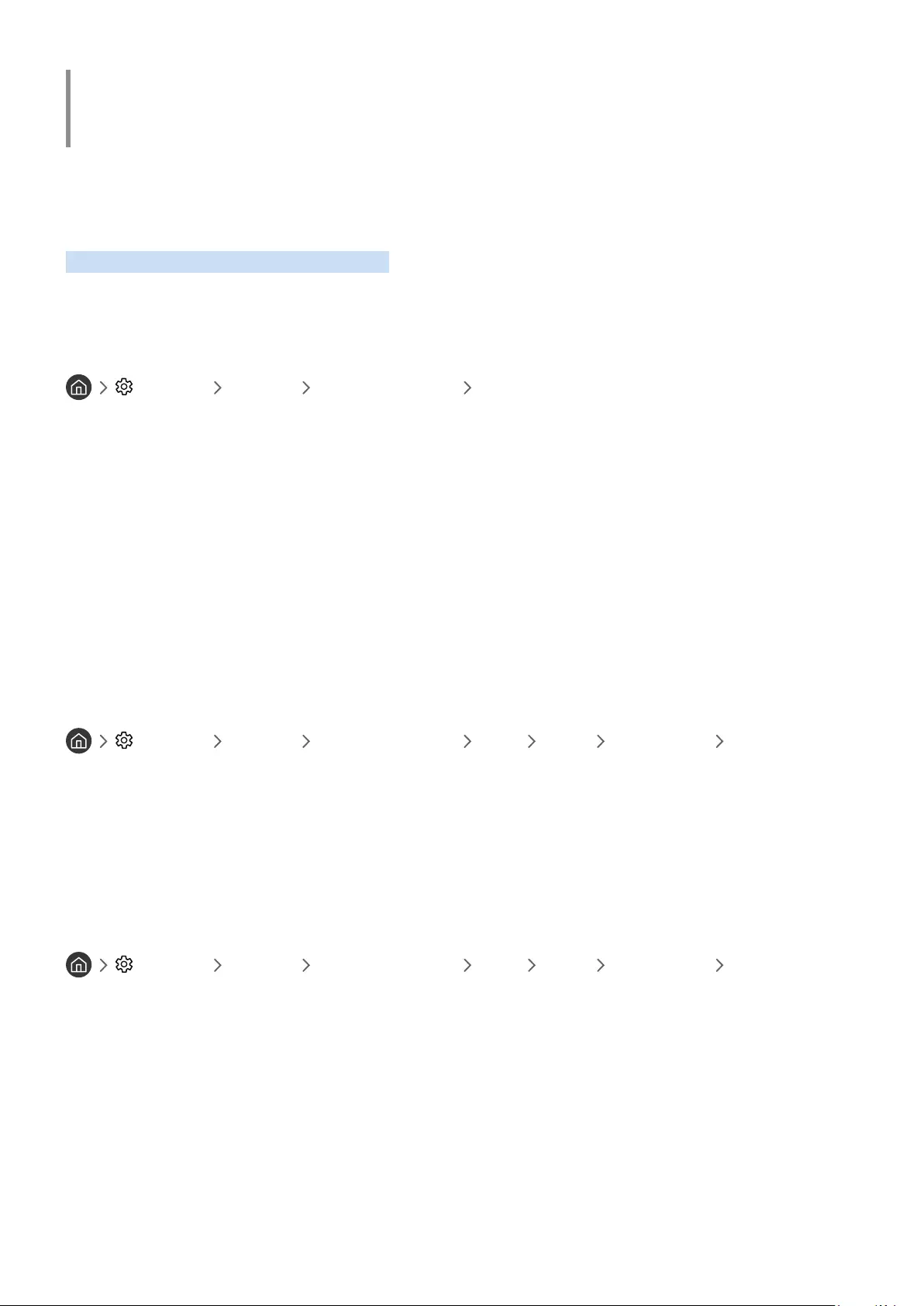
- 79 -
System and Support
You can configure system and support settings such as time, screen burn protection, software update, etc.
Setting the Time and Using the Timer
Set the current time and use the timer function.
Setting the current time
Settings General System Manager Time
You can set the Clock manually or automatically. Once the Clock is set, you can view the current time on the TV
anytime.
You must set the clock in the following cases:
●The power cable is disconnected and then connected.
●The Clock Mode is changed from Manual to Auto.
●The TV is not connected to the Internet.
●No broadcast signals are received.
Setting the clock automatically
Settings General System Manager Time Clock Clock Mode Auto
"This function works only when the TV is connected to the Internet or is receiving digital broadcasts through an antenna
connected.
"Depending on the broadcast signal, the displayed time may differ.
"The accuracy of the time information received may differ with the channel and signal.
Setting the clock manually
Settings General System Manager Time Clock Clock Mode Manual
When Clock Mode is set to Manual, you can directly enter the current time. Select the date and time by using the
arrow buttons on the remote control.

- 80 -
Setting the clock automatically
Settings General System Manager Time Clock Time Zone
Selects your time zone.
"This function is only available when the Clock Mode is set to Auto.
"This function is only available in specific geographical areas.
Changing the current time
Settings General System Manager Time Clock Time Offset
"Time Offset adjusts the time through a network connection. This function is only available if Clock Mode is set to Auto and
the TV is connected to the Internet though a local area network.
"Time Offset adjusts the time if the TV fails to receive time information through normal digital broadcast signals.
Using the timers
Using the sleep timer
Settings General System Manager Time Sleep Timer
You can use this function to automatically shut off the TV after a pre-set period of time. You can set the sleep timer
to up to 180 minutes to automatically turn off the TV.
Turning off the TV using the off timer
Settings General System Manager Time Off Timer
You can set Off Timer to shut off the TV automatically at a specific time. Off Timer is only available if the Clock has
been set.

- 81 -
Using the Screen Burn Protection and Energy Saving Functions
Protect the screen from screen burn-in and reduce the TV's energy consumption.
Preventing screen burn
Settings General System Manager Auto Protection Time
Still images can leave burned-in after-images if left on the screen for a long period of time. If a still image continues
for two hours, the screen burn protection function can be activated automatically to protect the screen from burned-
in after-images.
Reducing the energy consumption of the TV
Settings General Eco Solution Try Now
You can adjust the brightness level of the TV, reduce overall power consumption, and prevent overheating.
●Ambient Light Detection
Automatically adjusts the brightness level of the TV, according to the ambient light level, to reduce power
consumption. If the Ambient Light Detection has adjusted the screen brightness to a too bright or dark level,
you can select Minimum Backlight to manually adjust the minimum screen brightness.
●Minimum Backlight
When the Ambient Light Detection is turned on, you can manually adjust the minimum brightness of the TV
screen to consider the brightness level of the surroundings. This function acts only when the value is less than
the setting in Settings Picture Expert Settings Backlight.
●Energy Saving Mode
Allows you to select a brightness setting from the list to reduce the TV's power consumption.
●Motion Lighting
Adjusts the brightness in response to on-screen movements to reduce power consumption.
●Auto Power Off
Automatically turns off the TV to reduce unnecessary power consumption if there is no operation for 4 hours.
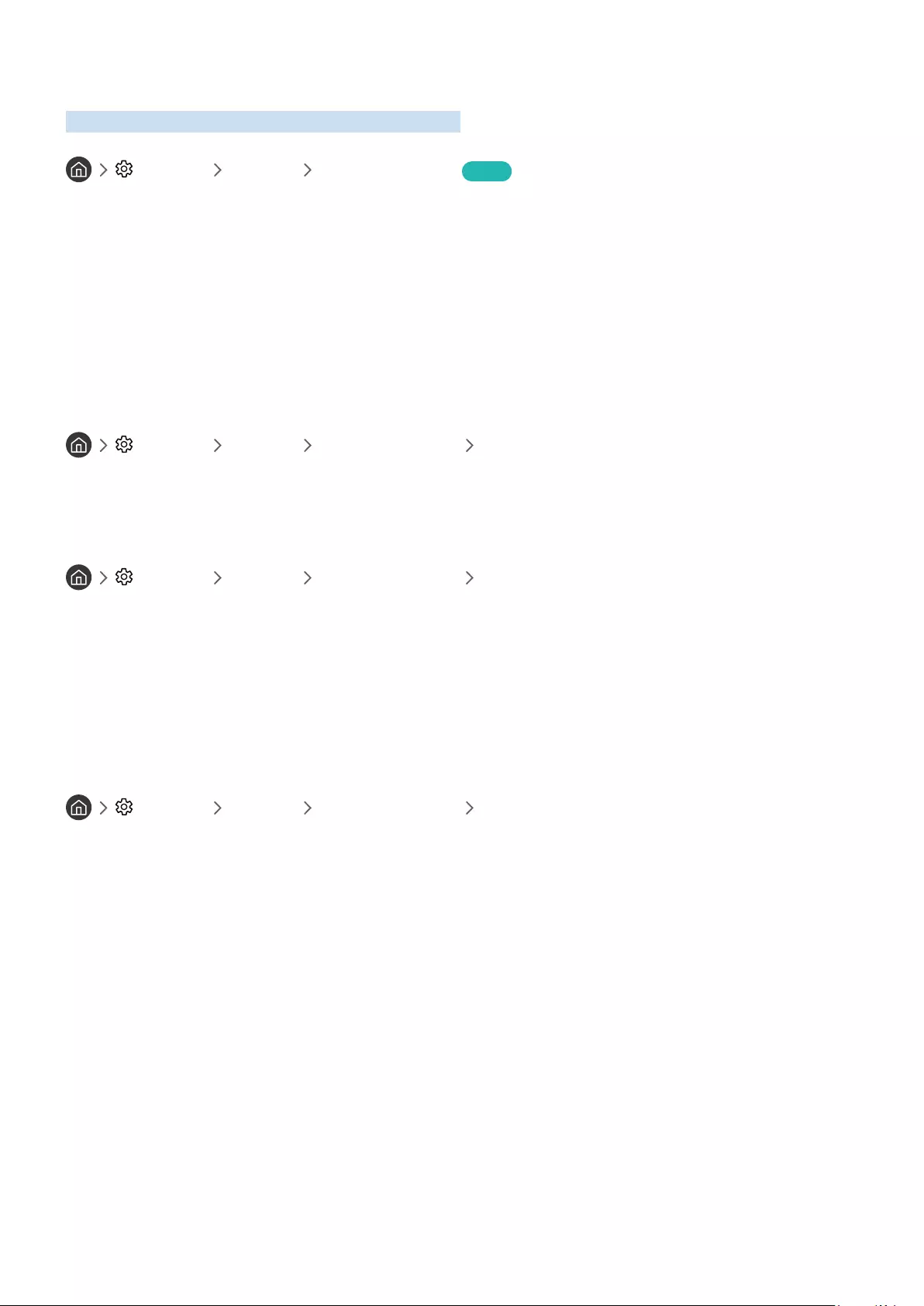
- 82 -
Updating the TV’s Software
View your TV's software version and update it if necessary.
Settings Support Software Update Try Now
Updating the TV’s software to the latest version
[ DO NOT turn off the TV’s power until the update is complete. The TV will turn off and on automatically after
completing the software update. Video and audio settings will be reset to their defaults after a software
update.
Updating through the Internet
Settings Support Software Update Update Now
"Updating from the Internet requires an active Internet connection.
Updating through a USB device
Settings Support Software Update Update Now
After downloading the update file from the Samsung website and storing it on a USB device, connect the USB device
to the TV to update.
"To update using a USB flash drive, download the update package from Samsung.com to your computer. Then, save the
update package in the USB device's top-level folder. Otherwise, the TV will not be able to locate the update package.
Updating the TV automatically
Settings Support Software Update Auto update
If the TV is connected to the Internet, you can have the TV update its software automatically while you are watching
the TV. When the background update is completed, it is applied the next time the TV is turned on.
If you agree to the Smart Hub terms and conditions, Auto update is set to On automatically. If you want this function
disabled, use the Select button to turn it off.
"This function may take a longer time if another network function is running concurrently.
"This function requires an Internet connection.

- 83 -
Protecting the TV from Hacking and Malicious Code
Protect your TV from hacking attempts and malicious code.
Settings General System Manager Smart Security
You can use Smart Security to protect the TV from hacking and malicious code when it is connected to the Internet.
Scanning the TV and connected storage for malicious code
Settings General System Manager Smart Security Scan
If malicious code is found, the results of the scan will appear on the screen. This result window displays all malicious
code found. You can quarantine (isolate) the code. Quarantining prevents it from executing.
1.
Select all the malicious code to quarantine.
2.
Select Isolate. The selected malicious code is relocated to the Isolated List.
"The Isolated List displays all quarantined malicious codes.
Using Other Functions
View other functions.
Running the accessibility functions
Settings General Accessibility Try Now
The Accessibility Shortcuts provide access to the accessibility functions. To display the Accessibility Shortcuts, press
and hold the Volume button for 1 second or more. You can easily turn on or turn off the functions such as Voice Guide,
Audio Description, High Contrast, Enlarge, Learn TV Remote, Menu Learning Screen, Subtitle, Multi-output Audio,
etc.
"Even if the Voice Guide is set to Off or muted, the voice guide for Accessibility Shortcuts is enabled.

- 84 -
Enabling voice guides for the visually impaired
Settings General Accessibility Voice Guide Settings
You can activate voice guides that describe the menu options aloud to aid the visually impaired. To activate this
function, set Voice Guide to On. With Voice Guide on, the TV provides voice guides for channel change, volume adjust,
information on current and upcoming programmes, schedule viewing, other TV functions, various content in the Web
Browser, and in Search.
"The Voice Guide is provided in the language that is specified on the Language screen. However, some languages are not
supported by Voice Guide even though they are listed in the Language screen. English is always supported.
Changing the volume, speed, and pitch of the Voice Guide
You can configure the volume, pitch, speed, and level of the Voice Guide.
Audio Description
Settings General Accessibility Audio Description Settings
You can use the Audio Stream for the Audio Description (AD) which is sent along with the Main audio from the
broadcaster. Adjust the audio description volume using Audio Description Volume.
"This function is only available on digital channels.
●Audio Description
Turns the audio description function on or off.
●Audio Description Volume
Adjusts the audio description volume.

- 85 -
Watching TV broadcasts with subtitles
Settings General Accessibility Subtitle Settings
Set Subtitle to On. Then you can watch the programme with the subtitle displayed.
"The actual name may differ with the geographical area. (Subtitle or Caption)
"This function is only available on certain models in specific geographical areas.
"The TV cannot control or modify DVD or Blu-ray subtitles. To control DVD or Blu-ray subtitles, use the sub-title feature of
the DVD or Blu-ray player and the player's remote control.
●Subtitle
Turns on or off the subtitle.
●Subtitle Mode
Sets the subtitle mode.
●Subtitle Language
Sets the subtitle language.
"The TV cannot control or modify DVD or Blu-ray subtitles. To control DVD or Blu-ray subtitles, use the subtitle feature
of the DVD or Blu-ray player and the player's remote control.
Selecting the broadcasting subtitle language
You can select the default subtitle language. The list of modes may vary depending on the broadcast.
●Primary Subtitle Language
Sets the primary subtitle language.
●Secondary Subtitle Language
Sets the secondary subtitle language.

- 86 -
White text on black background (high contrast)
Settings General Accessibility High Contrast
You can change major service screens to white text on a black background or change the transparent TV menus to
opaque so that text can be more easily read. To activate this function, set High Contrast to On.
Enlarging the font (for the visually impaired)
Settings General Accessibility Enlarge
You can enlarge the size of the font on the screen. To activate this function, set Enlarge to On.
Learning about the remote control (for the visually impaired)
Settings General Accessibility Learn TV Remote
This function helps individuals with a visual impairment to learn the positions of the buttons on the remote control.
When this function is activated, you can press a button on the remote control and the TV will tell you its name. To
return to the previous screen, press the button twice. To exit, press and hold the button.
"This function is only available when Voice Guide is enabled.
Learning about the TV menu
Settings General Accessibility Menu Learning Screen
Learn the menus on the TV screen. Once enabled, your TV will tell you the structure and features of the menus you
select.
Listening to the TV through Bluetooth devices (for the hearing impaired)
Settings General Accessibility Multi-output Audio
You can turn on both the TV speaker and Bluetooth devices at the same time. When this function is active, you can
set the volume of the Bluetooth devices higher than the volume of the TV speaker.
"This function is not available on certain models in specific geographical areas.
"When you connect Bluetooth devices to the TV, Multi-output Audio is activated. For more information about connecting
Bluetooth devices to the TV, refer to "Listening to the TV through Bluetooth devices."
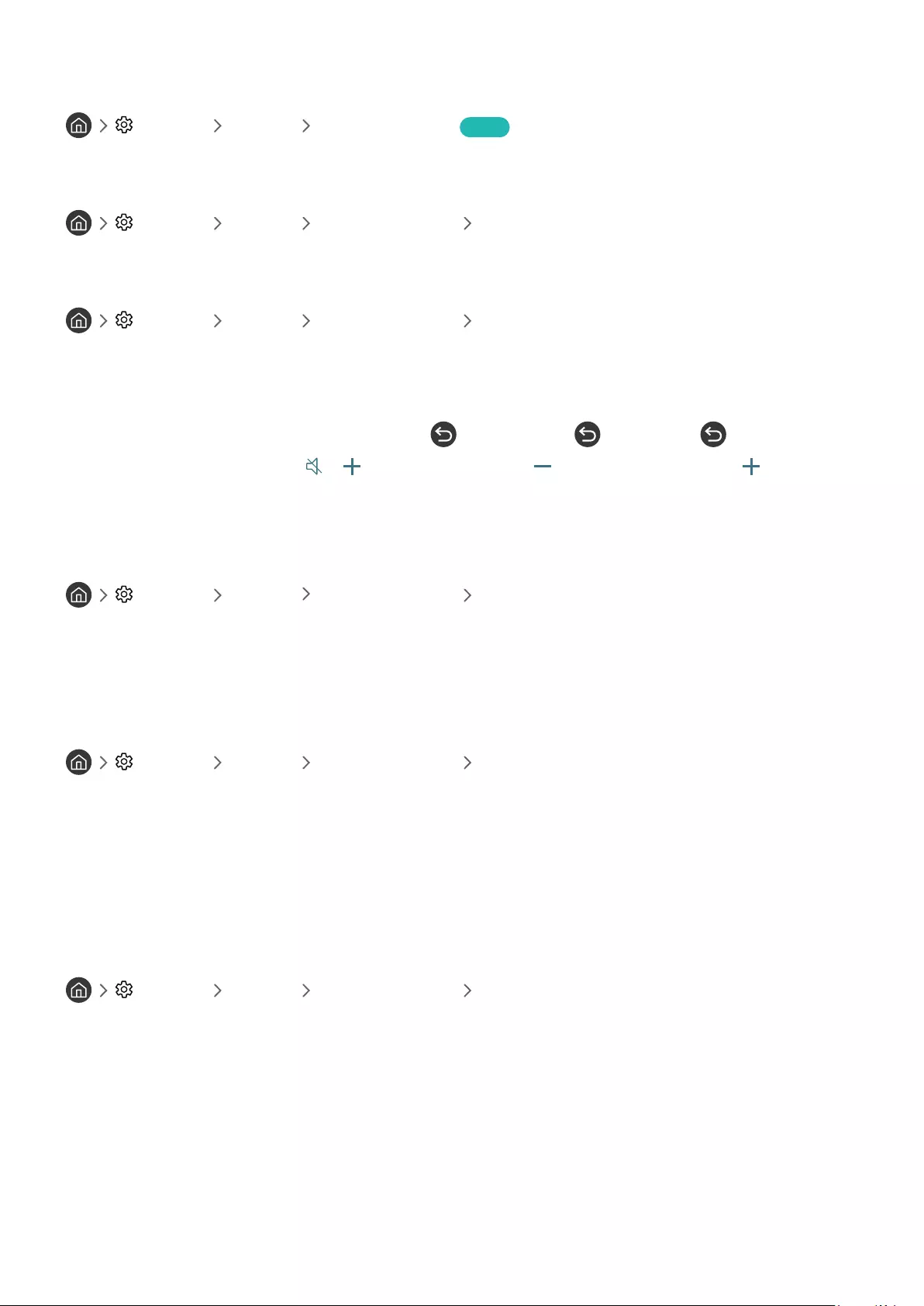
- 87 -
Configuring advanced system settings
Settings General System Manager Try Now
Changing the menu language
Settings General System Manager Language
Setting up a password
Settings General System Manager Change PIN
The PIN input window appears. Enter a PIN. Enter it again to confirm it. The default PIN is 0000.
"If you forget your PIN, you can reset it with your remote control. With the TV turned on, press the following buttons on the
remote control in the order shown to reset the PIN to 0000.
On the Samsung Smart Remote: VOL → Volume Up → → Volume Down → → Volume Up → .
On the standard remote control: → ( ) (Volume Up) → RETURN → ( ) (Volume Down) → RETURN → ( ) (Volume Up)
→ RETURN.
Enabling/Disabling the front indicators
Settings General System Manager Light Effect
"The colour of the TV's indicator lights may differ by the model.
"This function is not available on certain models in specific geographical areas.
Checking Notifications
Settings General System Manager View Notifications
You can view the list of event messages generated by the TV. View Notifications appears on the screen when events
such as an update release for an app or a Samsung account login/logout occurs.
"To delete all notifications, select Delete All.
"To check the SMART TV's service notifications in a Internet, select Service Notice.
Using the TV as a display model (for retail stores)
Settings General System Manager Usage Mode
You can turn the TV into a display model for retail environments by setting Usage Mode to Retail Mode.
"For all other uses, select Home Mode.
"With Retail Mode, some functions are disabled, and the TV automatically resets itself after a preset amount of time.

- 88 -
Checking digital channel signal info and strength
Settings Support Self Diagnosis Signal Information
"If your TV is attached to a separate, over-the-air antenna, you can use the signal strength information to adjust the antenna
for increased signal strength and improved HD channel reception.
Restoring the TV to the factory settings
Settings Support Self Diagnosis Reset
You can restore all TV settings (excluding the Internet and network settings) to the factory defaults.
1.
Select Reset. The security PIN entry window appears.
2.
Enter the security PIN, and then select Reset. All settings are then reset. The TV turns off and on again
automatically and displays the Start Setup screen.
"For more information on Start Setup, refer to the user manual that came with the TV.

- 89 -
HbbTV
Access services from entertainment providers, online providers and CE manufactures through HbbTV.
"This function is only available on certain models in specific geographical areas.
"Some channels may not include the HbbTV service.
In some countries, HbbTV is disabled by default. In this case, HbbTV can be used by installing the HbbTV widget (the
HbbTV Activation Widget) from Samsung APPS.
To set the HbbTV automatic start to on or off, access Settings Broadcasting Expert Settings HbbTV
Settings and set HbbTV to on or off. (Depending on the country)
If you want this function enabled or disabled, use the Select button to turn it on or off.
●HbbTV is not available when Timeshift is running or when a recorded video is being played back.
●An application on HbbTV may malfunction temporarily depending on the circumstances of the broadcast
station or application provider.
●An application is only available for use on HbbTV when the TV network is connected to an external network.
The application may malfunction depending on the network conditions.
●It is possible to use both Digital Teletext and Traditional Teletext in several limited channels by pressing the
TTX/MIX button in a toggling manner.
Using HbbTV:
●When the screen indicates (with the red colour button etc.) that HbbTV is being accessed.
●Select TTX using the remote once to enter the HbbTV text-input mode.
●Select TTX using the remote twice to enter the non-HbbTV text-input mode.

- 90 -
Teletext Feature
Learn how to use Teletext and run the functions provided by Teletext Service.
"This function is only available on certain models in specific geographical areas.
The index page of the Teletext service gives you information on how to use the Service. For Teletext information to
be displayed correctly, channel reception must be stable. Otherwise, information may be missing or some pages may
not be displayed.
"You can change Teletext pages by select numeric using your remote control.
/ Teletext on / mix / off: Activates the Teletext mode for the current channel. Press twice to overlap the
Teletext mode with the current broadcasting screen. Press it one more time to exit teletext.
8 Store: Stores the Teletext pages.
4 Size: Displays the teletext on the upper half of the screen in double-size. To move the text to the lower half of the
screen, press it again. For normal display, press it once again.
9 Hold: Holds the display at the current page, in the case that there are several secondary pages that follow
automatically. To undo, press it again.
Colour buttons (red, green, yellow, blue): If the FASTEXT system is used by the broadcasting company, the different
topics on a Teletext page are colour-coded and can be selected by coloured buttons. Press the colour corresponding
to the topic of your choice. A new colour coded page appears. Items can be selected in the same way. To display the
previous or next page, select corresponding coloured button.
0 Mode: Selects the Teletext mode (LIST / FLOF). If pressed during LIST mode, switches the mode to List save
mode. In List save mode, you can save a Teletext page into a list using the 8 (store) button.
1 Sub-page: Displays the available sub-page.
2 Page up: Displays the next Teletext page.
3 Page down: Displays the previous Teletext page.
6 Index: Displays the index (contents) page at any time while you are viewing Teletext.
5 Reveal: Displays the hidden text (answers to quiz games, for example). To display the normal screen, press it
again.
7 Cancel: Shrinks the Teletext display to overlap with the current broadcast.

- 91 -
Typical Teletext page
Part Contents
A Selected page number.
B Broadcasting channel identity.
C Current page number or search indications.
DDate and time.
E Text.
F Status information. FASTEXT information.

- 92 -
Troubleshooting
If you have a problem with your TV, you can access various solutions while watching TV. If your problem is not
addressed in the Troubleshooting section, contact the Samsung Call Centre.
Getting Support
Get help directly from Samsung if you have a problem with your TV.
Getting support through Remote Management
Settings Support Remote Management Try Now
After consenting to our service agreement, you can use Remote Management to access Remote Support and have
a Samsung service technician diagnose your TV, correct problems, and update your TV's software remotely, via the
web. You can also turn Remote Management on and off.
"This function requires an Internet connection.
"You can also start Remote Management function by pressing and holding the button for 5 or more seconds.
What is Remote Support?
Samsung Remote Support service offers you one-on-one support with a Samsung Technician who can remotely:
●Diagnose your TV
●Adjust the TV settings for you
●Perform a factory reset on your TV
●Install recommended firmware updates
How does Remote Support Work?
You can easily have a Samsung Tech service your TV remotely:
1.
Call the Samsung Contact Centre and ask for remote support.
2.
Open the menu on your TV and go to the Support section.
3.
Select Remote Management, then read and agree to the service agreements. When the PIN screen appears,
provide the PIN number to the agent.
4.
The agent will then access your TV.

- 93 -
Finding the contact information for service
Settings Support About This TV Try Now
You can view the address of the Samsung website, the call centre phone number, your TV's model number, your TV's
software version, Open Source Licence and other information you may need to get service support from a Samsung
call agent or the Samsung website.
"You can also view information by scanning the QR code of your TV.
"You can also start this function by pressing and holding the button for 5 or more seconds.
Requesting service
Settings Support Request Support Try Now
You can request service when you encounter a problem with the TV. Select the item matching the problem that
you encountered, and then select Request Now or Schedule Appointment Send. Your service request will be
registered. The Samsung Contact Centre will contact you to set up or confirm your service appointment.
"You must agree to the terms and conditions for the service request.
"This function is not available in specific geographical areas.
"This function requires an Internet connection.
Diagnosing TV operational issues
You can diagnose issues with your TV and Smart Hub and run reset functions.
Settings Support Self Diagnosis Try Now
You can use the Picture Test to help diagnose video issues and the Sound Test to diagnose sound issues. You can also
view signal strength information for over-the-air digital signals, test the Smart Hub Internet connection, and run the
Smart Hub and TV factory reset functions.
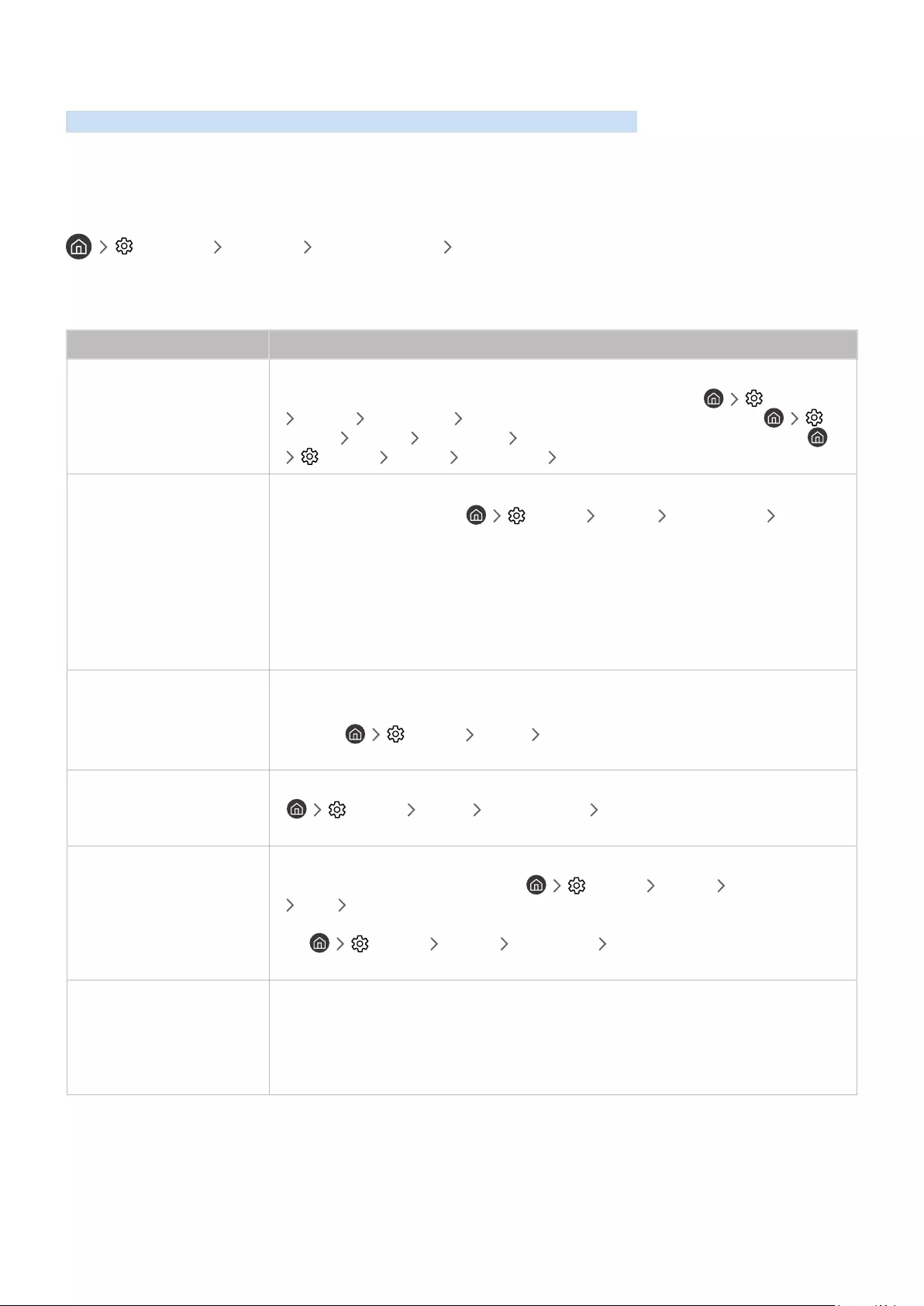
- 94 -
There Is a Problem with the Picture
When the TV has trouble with the picture, these steps may help resolve the problem.
Testing the picture
Settings Support Self Diagnosis Start Picture Test
Before you review the list of problems and solutions below, use Start Picture Test to determine if the problem is
caused by the TV. Start Picture Test displays a high definition picture you can examine for flaws or faults.
The problem Try this!
Flickering and Dimming
If your Samsung Television is flickering or dimming sporadically, you may need to disable
some of the energy efficiency features. Disable Energy Saving Mode ( Settings
General Eco Solution Energy Saving Mode), Ambient Light Detection (
Settings General Eco Solution Ambient Light Detection), or Motion Lighting (
Settings General Eco Solution Motion Lighting).
Component Connections/
Screen Colour
If the colour on your Samsung television screen is not correct or the black and white colours
are off, run Start Picture Test ( Settings Support Self Diagnosis Start
Picture Test).
If the test results indicate that the problem is not caused by the TV, do the following:
●Confirm that the video input connectors are connected to the correct external device
video output connectors.
●Check the other connections as well. If the TV is connected to an external device via
a component cable, confirm that the Pb, Pr, and Y jacks are plugged into their proper
connectors.
Screen Brightness
If the colours on your Samsung TV are correct but just a little too dark or bright, try
adjusting the following settings first.
●Select Settings Picture Expert Settings and adjust the Backlight,
Contrast, Brightness, Sharpness, Colour, or Tint (G/R) settings.
Ghosting, Blurring, or
Juddering
If you notice ghosting or blurring on the screen, use the Auto Motion Plus Settings function
( Settings Picture Expert Settings Auto Motion Plus Settings) to resolve
the issue.
Unwanted Powering Off
If your Samsung TV appears to turn off by itself, try disabling some of the TV's energy
efficiency functions. See if Sleep Timer ( Settings General System Manager
Time Sleep Timer) has been enabled. The Sleep Timer automatically turns the TV off
after a specified period of time. If the Sleep Timer has not been enabled, see if Auto Power
Off ( Settings General Eco Solution Auto Power Off) has been enabled
and disable it.
Problems Powering On
If you are having problems powering on your Samsung television, there are a number of
things to check before calling the service department. Confirm that the TV's power cord is
connected correctly at both ends and that the remote control is operating normally. Make
sure that the antenna cable or cable TV cable is firmly connected. If you have a cable or
satellite box, confirm that it is plugged in and turned on.
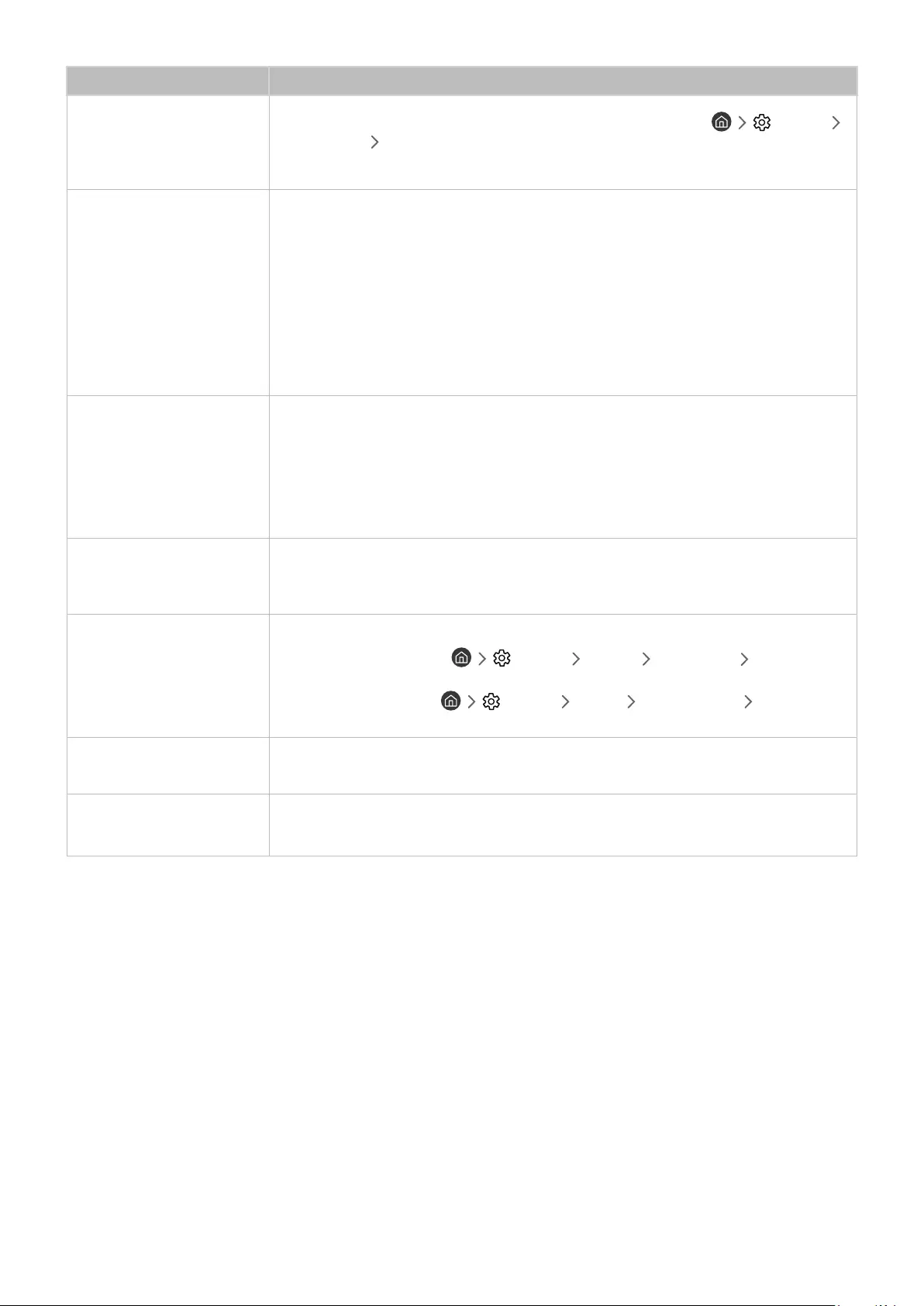
- 95 -
The problem Try this!
Unable to find a Channel
If your TV is not connected to a cable or satellite box, run Auto Tuning ( Settings
Broadcasting Auto Tuning).
"This function is only available on certain models in specific geographical areas.
The TV image does not look
as good as it did in the store.
Store displays are all tuned to digital, HD (high definition) channels.
If you have an analogue cable or satellite box, upgrade to a digital cable or satellite box. Use
HDMI or Component cables to deliver HD (high definition) picture quality.
Many HD channels are upscaled from SD (Standard Definition) content. Look for a channel
that is broadcasting HD content.
●Cable/Satellite Subscribers: Try HD channels from the channel lineup.
●Terrestrial/Cable Antenna Connection: Try HD channels after running the Auto Tuning
function.
Adjust the cable or satellite box's video output resolution to 1080i or 720p.
The picture is distorted.
The compression of video content may cause picture distortions, especially in fast moving
pictures from sports programmes and action movies.
If the signal reception is weak or poor, screen distortion may be visible but it is not a
malfunction.
Mobile phones used close to the TV (within 1 m) may cause noise on analogue and digital
channels.
The colour is wrong or
missing.
If you’re using a Component connection, make sure that the Component cables are
connected to the correct jacks. Incorrect or loose connections may cause colour problems or
a blank screen.
The colour is poor or the
picture is not bright enough.
Go to Picture and then adjust the Picture Mode, Brightness, Sharpness, and Colour settings.
See if Energy Saving Mode ( Settings General Eco Solution Energy Saving
Mode) has been enabled.
Try resetting the picture. ( Settings Picture Expert Settings Reset
Picture)
There is a dotted line on the
edge of the screen. Change Picture Size to 16:9 Standard.
The picture is black and
white.
If you are using AV, analogue equipment, disconnect the adapter from the Component (Blue)
input jack on the TV and connect it to the AV In (Yellow) input jack.
"If the test picture does not appear or there is noise or distortion, the TV may have a problem. Contact Samsung’s Call Centre
for assistance.
"If the test picture is displayed properly, there may be a problem with an external device. Please check the connections.
"If the problem persists, check the signal strength or refer to the external device’s user manual.
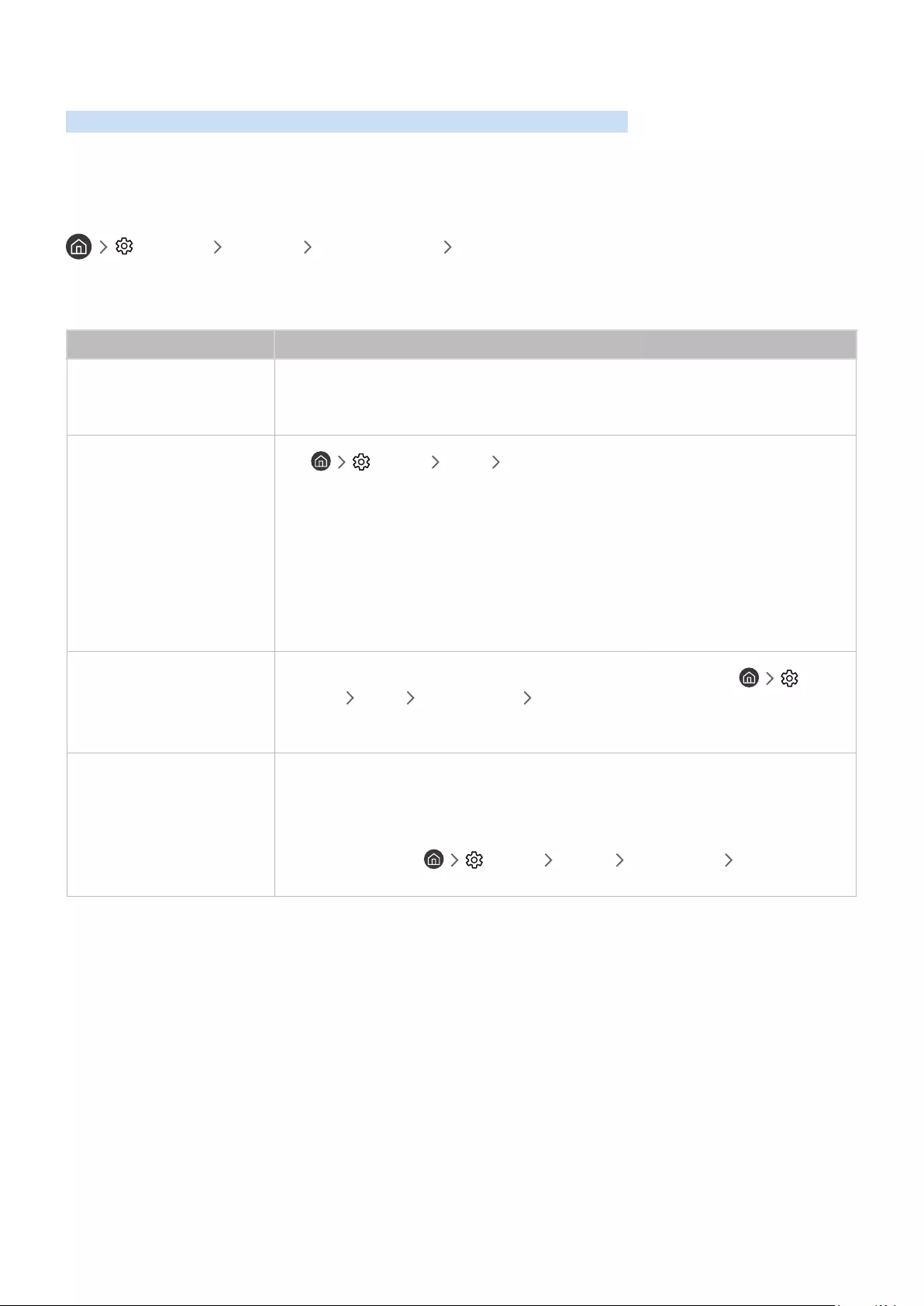
- 96 -
I Can't Hear the Sound Clearly
When the TV has difficulties with sound, these steps may help resolve the problem.
Testing the sound
Settings Support Self Diagnosis Start Sound Test
If the TV plays the Start Sound Test melody without distortion, there may be a problem with an external device or the
broadcast signal's strength.
The problem Try this!
There is no sound or the
sound is too low at maximum
volume.
Check the volume control of the device (cable or satellite box, DVD, Blu-ray, etc.)
connected to your TV.
The picture is good but there
is no sound.
Set Settings Sound Sound Output to TV Speaker.
If you are using an external device, check the device’s audio output option. (For example,
you may need to change your cable box’s audio option to HDMI if the box connected to your
TV is using an HDMI cable.)
To listen to computer sound, connect an external speaker to the computer’s audio output
connector.
If your TV has a headphone jack, make sure there is nothing plugged into it.
Reboot the connected device by disconnecting and then reconnecting the device’s power
cable.
No sound is heard.
Check whether the Digital Output Audio Format is set to Dolby Digital+ in
Settings Sound Expert Settings Digital Output Audio Format. If you are using a
receiver that does not support Dolby Digital Plus, you will hear no sound when you select
Dolby Digital+.
The speakers are making an
odd sound.
Make sure that the audio cable is connected to the correct audio output connector on the
external device.
For antenna or cable connections, check the signal information. A low signal level may
cause sound distortions.
Run Start Sound Test ( Settings Support Self Diagnosis Start Sound
Test).
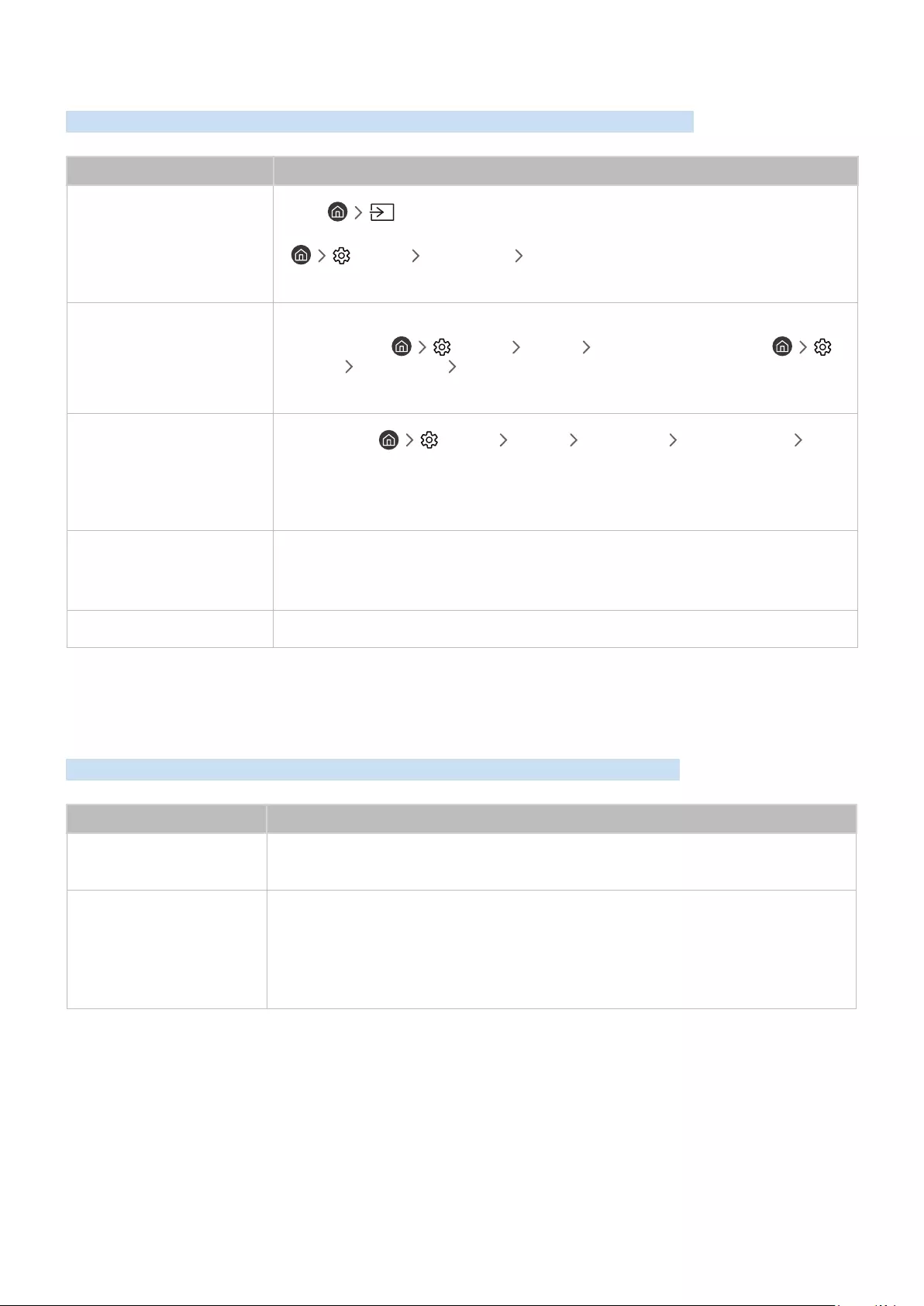
- 97 -
There Is a Problem with the Broadcast
When the TV has difficulties receiving broadcasts, these steps may help resolve the problem.
The problem Try this!
“Weak or No Signal”
displayed in TV mode/cannot
find channel.
Select Source to confirm that the correct input source has been selected.
If the TV is not connected to a cable or satellite box, run Auto Tuning to search for channels
( Settings Broadcasting Auto Tuning).
"This function is only available on certain models in specific geographical areas.
The TV is not receiving all
channels.
Confirm that the coaxial cable is securely connected to the TV.
Run Start Setup ( Settings General Start Setup) or Auto Tuning (
Settings Broadcasting Auto Tuning).
"This function is only available on certain models in specific geographical areas.
There are no subtitles with
digital channels.
Go to Subtitle ( Settings General Accessibility Subtitle Settings
Subtitle) and change the Subtitle Mode.
Some channels may not have subtitle data.
"The actual name may differ with the geographical area. (Subtitle or Caption)
The picture is distorted.
The compression of the video content may cause picture distortions. This is especially true
with fast moving pictures from sports programmes and action movies.
A weak signal can cause picture distortions. This is not a problem with the TV.
The picture quality is low. Select high definition (HD) channels or programmes.
My Computer Won't Connect
When the TV has difficulties connecting to a PC, these steps may help resolve the problem.
The problem Try this!
The "Mode Not Supported"
message appears. Set your PC’s output resolution so it matches a resolution supported by the TV.
The video is OK but there is
no audio.
If you are using an HDMI connection, check the audio output setting on your PC.
If you are using an HDMI-to-DVI cable, a separate audio cable is required. Note that the
HDMI-to-DVI connection is only supported by the HDMI (DVI) port and does not transmit
audio. To listen to the computer sound, connect external speakers to the audio output
connection of the computer.
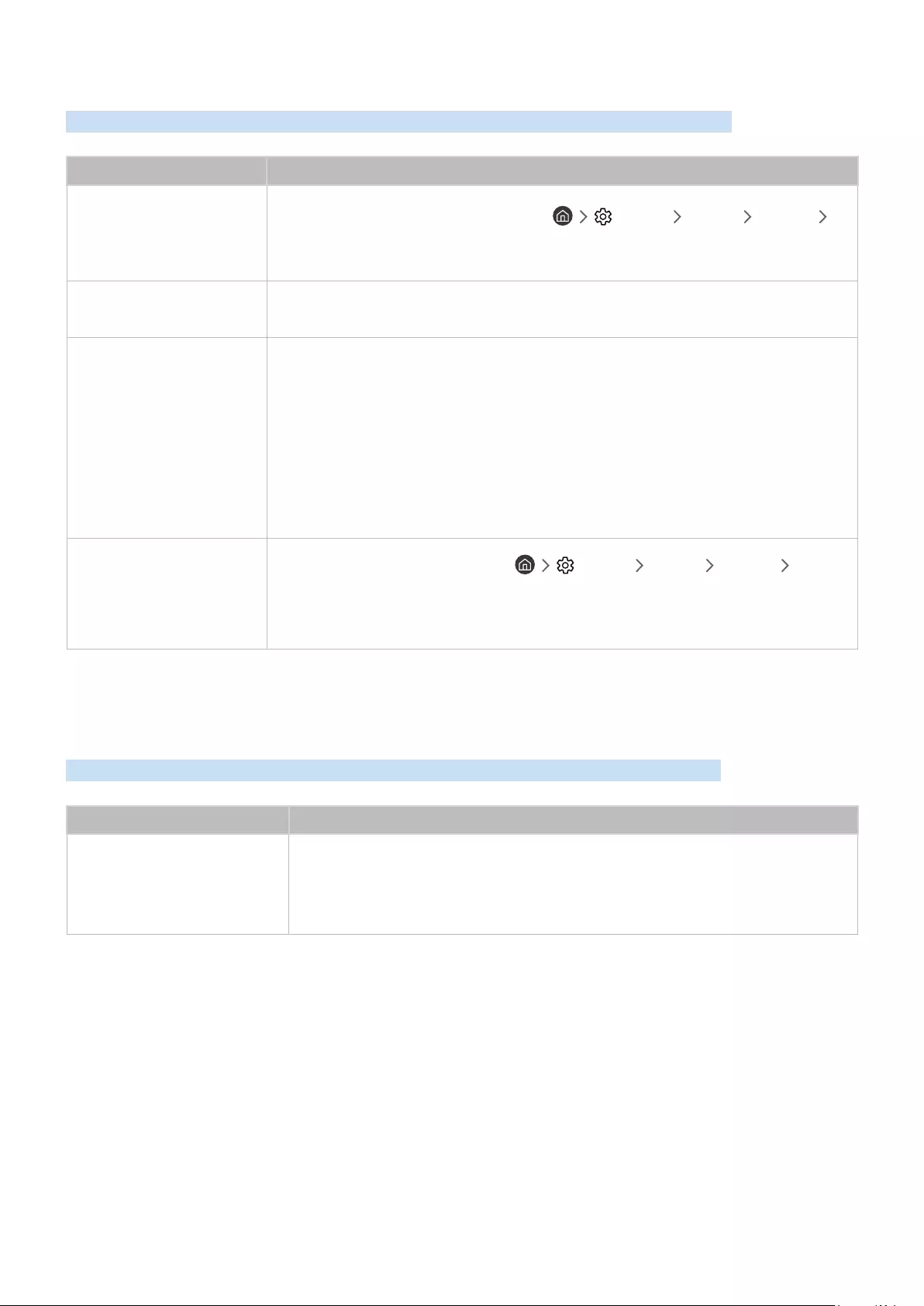
- 98 -
The TV Won't Connect to the Internet
When the TV has difficulties connecting to the Internet, these steps may help resolve the problem.
The problem Try this!
The TV cannot connect to
your network or apps (for
Internet compatible models
only).
Make sure the TV has a network connection ( Settings General Network
Network Status).
Contact your Internet service provider.
The wireless network
connection failed. Confirm your wireless modem/router is on and connected to the Internet.
The wireless network signal
is too weak.
Position your wireless router, modem router, or access point in a central location. Avoid
putting it in a corner.
Use a wireless repeater to get an instant boost in your wireless signal strength. Place the
repeater halfway between your wireless router and your TV.
The most common wireless technology, 802.11g (wireless-G), operates at a frequency of
2.4 GHz. This frequency is widely used by many cordless phones, microwave ovens, baby
monitors, garage doors, and other wireless devices. Reduce interference by not using
or turning off wireless devices that use the 2.4 GHz frequency. Instead, use devices that
communicate via the 5.0 GHz frequency.
The software update over
the Internet has failed.
Check the network connection status ( Settings General Network
Network Status).
If the TV is not connected to a network, connect it to a network.
The upgrade stops if you already have the latest software version.
The Schedule Recording/Timeshift Function Isn't Working
When Timeshift or Schedule recording aren't working, these steps may help resolve the problem.
The problem Try this!
Schedule Recording cannot be
used.
Check if there is a USB device connected to the TV.
Recording will automatically stop if the signal becomes too weak. Check the free space
on the USB device. The function will not work if there isn't enough storage space on the
USB device.
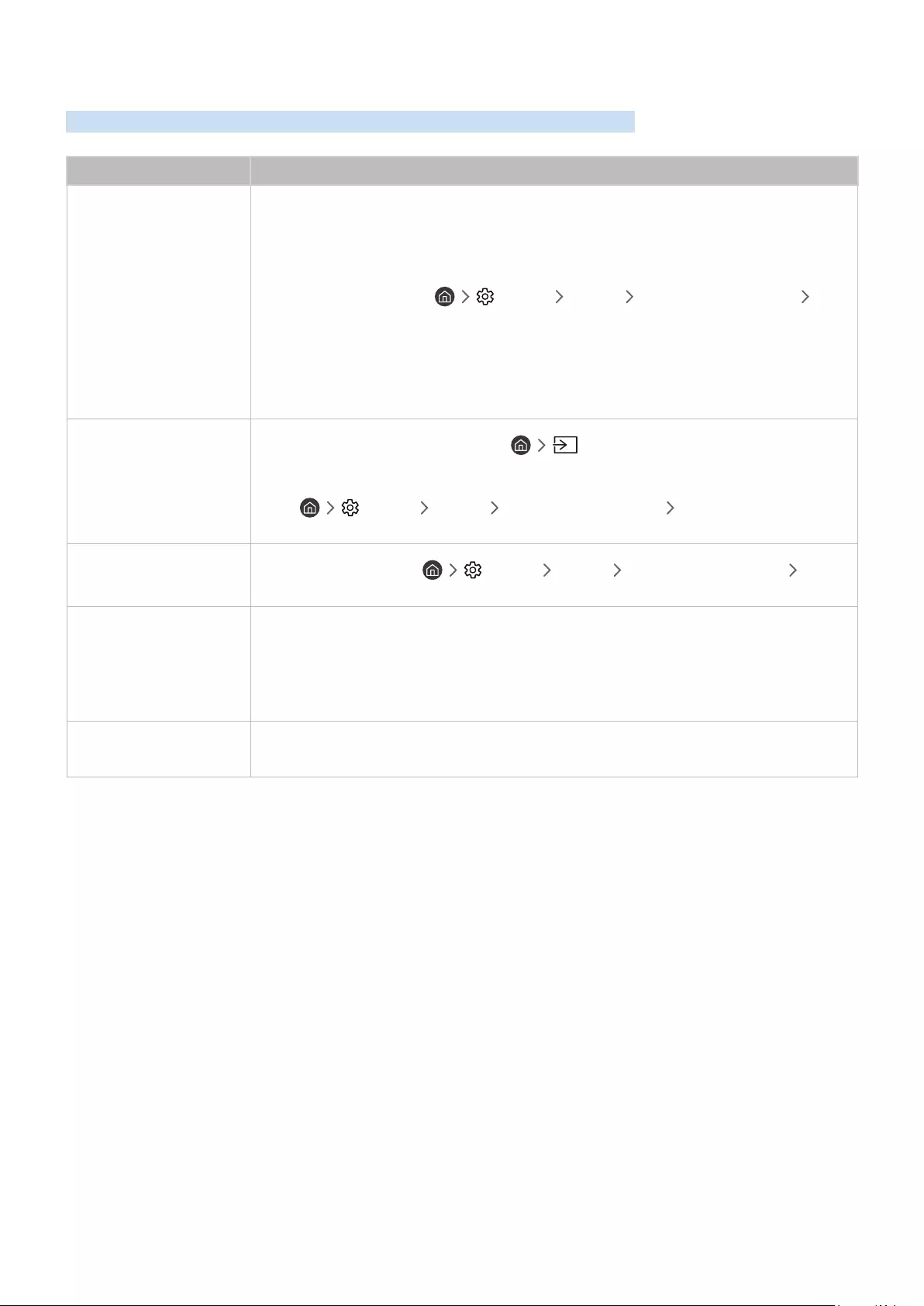
- 99 -
Anynet+ (HDMI-CEC) Isn't Working
When Anynet+ (HDMI-CEC) isn't working, these steps may help resolve the problem.
The problem Try this!
Anynet+ does not work.
Confirm that the device is an Anynet+ device. The Anynet+ system supports Anynet+ devices
only.
Check if the power cord of the Anynet+ device is properly connected.
Check the cable connections of the Anynet+ device.
Go to Anynet+ (HDMI-CEC) ( Settings General External Device Manager
Anynet+ (HDMI-CEC)) and see if Anynet+ (HDMI-CEC) has been set to On.
Anynet+ may not function when some other functions are active, including Channel Search,
Smart Hub, Initial Setup, etc.
If you have disconnected and then reconnected the HDMI cable, scan for devices again or turn
your TV off and on.
I want to start Anynet+.
Move the focus to the Anynet+ device at Source, and then press the up directional
button.
Check if the Anynet+ device is properly connected to the TV, and then select Anynet+ (HDMI-
CEC) ( Settings General External Device Manager Anynet+ (HDMI-CEC))
menu to see if Anynet+ (HDMI-CEC) is set to On.
I want to exit Anynet+. Set Anynet+ (HDMI-CEC) ( Settings General External Device Manager
Anynet+ (HDMI-CEC)) to Off.
The message "Connecting
to Anynet+ device..." or
"Disconnecting from
Anynet+ device" appears
on the screen.
You cannot use the remote control when the TV is configuring Anynet+ or switching to a
viewing mode. Use the remote control after the TV has completed the Anynet+ configuration or
has switched to a viewing mode.
The Anynet+ device won't
play. You cannot use the play function when Start Setup is in progress.

- 100 -
The problem Try this!
The connected device is
not displayed.
Check whether the device supports Anynet+.
Check whether the HDMI cable is properly connected.
Go to Anynet+ (HDMI-CEC) ( Settings General External Device Manager
Anynet+ (HDMI-CEC)) and see if Anynet+ (HDMI-CEC) has been set to On.
Scan for Anynet+ devices again.
Anynet+ devices must be connected to the TV using an HDMI cable. Make sure the device is
connected to your TV with an HDMI cable. Some HDMI cables may not support Anynet+.
If the connection is terminated because there has been a power failure or the HDMI cable has
been disconnected, please scan for the device again.
The TV audio is not being
played through the
receiver.
Connect an optical cable to the TV and the receiver.
ARC enables the TV to output digital sound via the HDMI (ARC) port.
However, ARC is only available when the TV is connected to an audio receiver that supports
ARC.
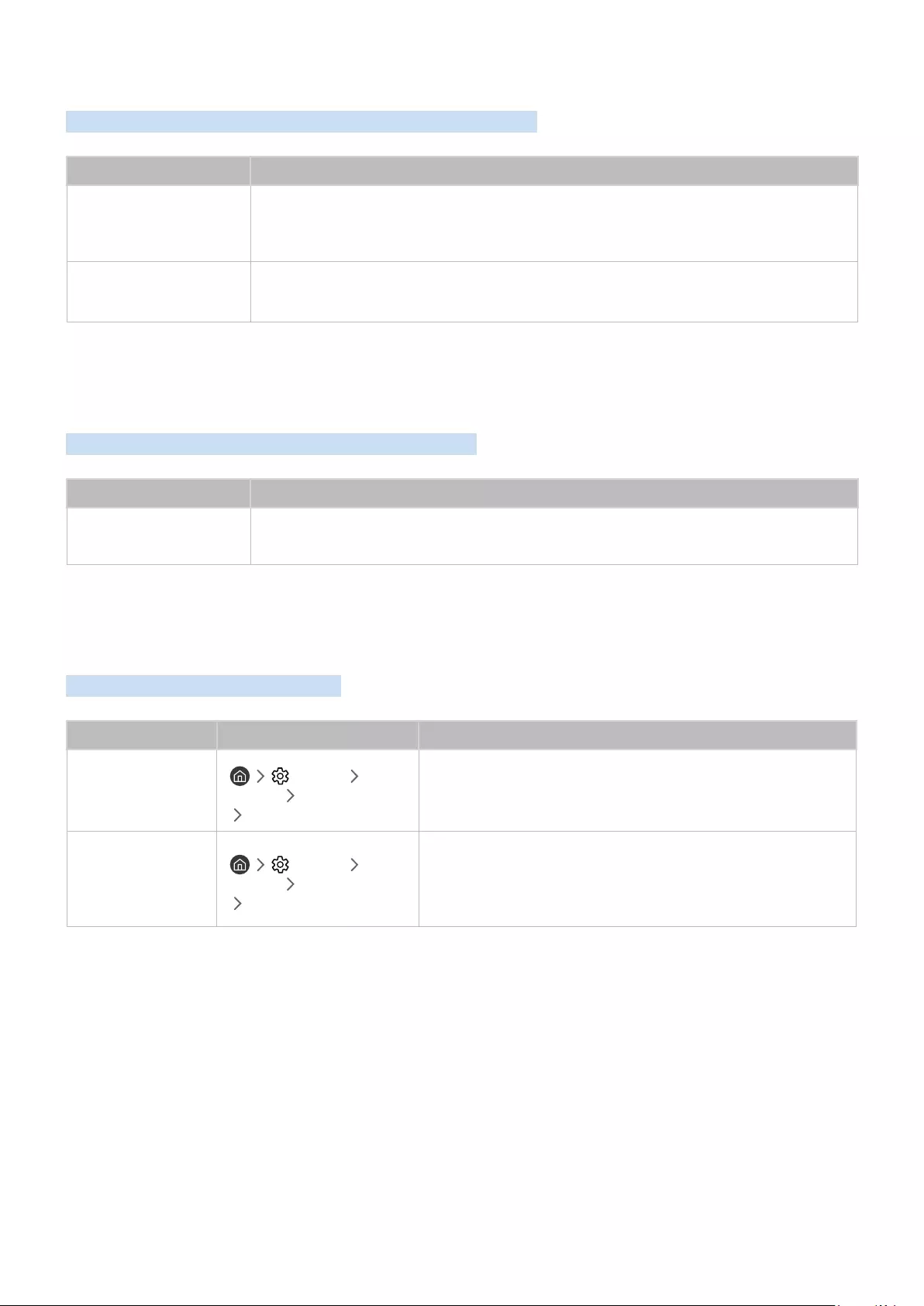
- 101 -
I Have Trouble Launching/Using Apps
When apps aren't working, these steps may help resolve the problem.
The problem Try this!
I launched an app, but
it's in English. How can I
change the language?
Languages supported by the app may be different from the user interface language. The ability
to change the language depends on the service provider.
My application is not
working.
Check with the service provider.
Refer to the Help section on the application service provider's website.
My File Won't Play
When files aren't playing, this may help resolve the problem.
The problem Try this!
Some files can't be
played.
This problem may occur with high-bitrate files. Most files can be played back, but you might
experience problems with high-bitrate files.
I Want to Reset the TV
Initialise the settings to factory defaults.
Reset Path Description
Reset Settings
Settings
Support Self Diagnosis
Reset
Resets Picture, Sound, Broadcasting, and all other settings, except
for the network settings, to the default settings.
Reset Smart Hub
Settings
Support Self Diagnosis
Reset Smart Hub
Resets all Smart Hub settings to their factory defaults and
deletes all information related to Samsung accounts, linked
service accounts, Smart Hub service agreements, and Smart Hub
applications.

- 102 -
Other Issues
Use these procedures to resolve other issues that may occur.
The problem Try this!
The TV is hot.
Watching TV for an extended period of time causes the panel to generate heat. The heat
from the panel is dissipated through internal vents running along the top of the TV. The
bottom, however, may feel hot to the touch after extended use. Children watching TV need
constant adult supervision to prevent them from touching the TV. This heat, however, is not
a defect and does not affect the TV's functionality.
The picture won’t display in
full screen.
HD channels will have black bars on either side of the screen when displaying upscaled SD
(4:3) content.
Black bars will appear at the top and bottom of the screen when you watch movies that have
aspect ratios different from your TV.
Adjust the picture size options on your external device or set the TV to full screen.
The "Mode Not Supported"
message appears.
The output resolution of the attached device is not supported by the TV. Check the TV's
supported resolutions and adjust the external device’s output resolution accordingly.
The Subtitles item in the TV
is greyed out.
When an external device is connected with an HDMI or Component cable, the Subtitle
function is unavailable. Adjust the subtitle setting on the external device.
"The actual name may differ with the geographical area. (Subtitle or Caption)
The TV smells of plastic. This smell is normal and will dissipate over time.
Signal Information under
Self Diagnosis isn't
activated.
Verify that the current channel is a digital channel.
Signal Information is only available for digital channels.
The TV is tilted to the side. Remove the base stand from the TV and reassemble it.
The stand is wobbly or
crooked. Make sure the indicator arrows on the stand and stand holder are properly aligned.
The remote control and/or
voice control does not work.
The TV ships with protective stickers covering some of the sensors. Make sure all of the
stickers have been removed.
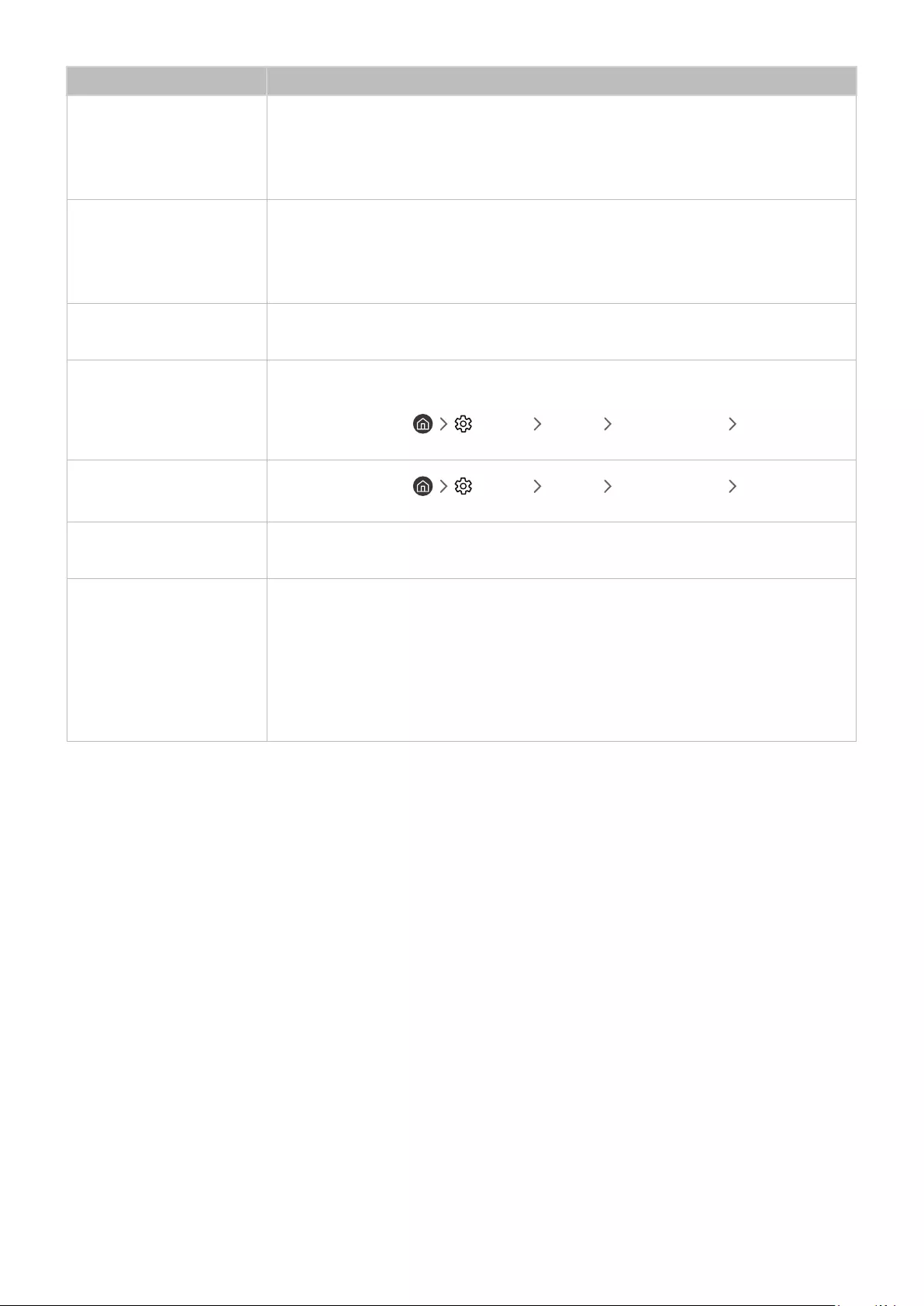
- 103 -
The problem Try this!
The Broadcasting function
has been deactivated.
Broadcasting is only available when the Source is set to TV.
Broadcasting cannot be accessed while you watch TV using a cable or satellite box.
Broadcasting cannot be accessed while a recording is in progress or the Timeshift function
is running.
There is an intermittent loss
of audio or video.
Check the cable connections and reconnect them.
Loss of audio or video can be caused by using overly rigid or thick cables.
Make sure the cables are flexible enough for long term use. If you are mounting the TV to a
wall, we recommend using cables with 90-degree connectors.
There are small particles on
the TV's bezel. This is part of the product’s design and is not a defect.
The settings are lost after
5 minutes or every time the
TV is turned off.
If Usage Mode is set to Retail Mode, the TV's audio and video settings are automatically
reset every 5 minutes.
Change Usage Mode ( Settings General System Manager Usage Mode) to
Home Mode.
A POP (TV’s internal banner
ad) appears on the screen.
Change Usage Mode ( Settings General System Manager Usage Mode) to
Home Mode.
The TV is making a popping
noise.
The expansion and contraction of the TV's outer casing may cause a popping noise. This does
not indicate a product malfunction. The TV is safe to use.
The TV is making a
humming noise.
Your TV utilises high-speed switching circuits and high levels of electrical current.
Depending on the TV's brightness level, the TV may seem slightly noisier than a
conventional TV.
Your TV has undergone strict quality control procedures that meet our demanding
performance and reliability requirements.
Some noise coming from the TV is considered normal and is not an acceptable cause for an
exchange or refund.

- 104 -
Precautions and Notes
You can get instructions and information that you must read after installation.
Before Using the Recording and Timeshift Functions
Read these instructions before using Recording and Timeshift.
"This function is only available on certain models in specific geographical areas.
Before using the recording and schedule recording functions
●To set up a Schedule Recording, you must first set the TV's clock. Set the Clock ( Settings General
System Manager Time Clock).
●You can set up a maximum total of 30 Schedule Viewing and Schedule Recording entries.
●Recordings are DRM-protected and therefore cannot be played back on a computer or on a different TV. In
addition, these files cannot be played back on your TV if its video circuit has been replaced.
●A USB hard drive with a speed of 5,400 rpm or above is recommended. However, RAID-type USB hard drives
are not supported.
●USB memory sticks are not supported.
●The total recording capacity may differ with the amount of available hard drive space and the recording
quality level.

- 105 -
●Schedule Recording requires at least 100 MB of free space on the USB storage device. Recording will stop if
the available storage space falls below 50 MB while recording is in progress.
●If the available storage space falls below 500 MB while both the Schedule Recording and Timeshift functions
are in progress, only the recording will stop.
●The maximum recording time is 720 minutes.
●Videos are played according to the TV settings.
●If the input signal is changed while recording is in progress, the screen will go blank until the change is made.
In this case, recording will resume, but will not be available.
●When using the Record or Schedule Recording function, the actual recording may start a second or two later
than the specified time.
●If the Schedule Recording function is operating while a recording is being made on an HDMI-CEC external
device, the priority is given to the Schedule Recording.
●Connecting a recording device to the TV automatically deletes abnormally saved recorded files.

- 106 -
Before using the timeshift function
●A USB hard drive with a speed of 5,400 rpm or above is recommended. However, RAID-type USB hard drives
are not supported.
●USB memory sticks or flash drives are not supported.
●The total recording capacity may differ with the amount of available hard drive space and the recording
quality level.
●If the available storage space falls below 500 MB while both the Schedule Recording and Timeshift functions
are in progress, only the recording will stop.
●The maximum amount of time available for the Timeshift function is 90 minutes.
●The Timeshift function is not available for locked channels.
●Time-shifted videos are played according to the TV settings.
●The Timeshift function may be terminated automatically once it reaches its maximum capacity.
●The Timeshift function requires at least 1.5 GB of free space available on the USB storage device.
Supported broadcasting audio options
Audio Type Dual Sound Default
Mono Mono Automatic change
A2 Stereo Stereo Stereo, Mono Automatic change
Dual Dual I, Dual II Dual I
Mono Mono Automatic change
NICAM Stereo Stereo Mono, Stereo Automatic change
Dual Mono, Dual I, Dual II Dual I
"If the Stereo signal is too weak and an automatic switching occurs, select Mono.
"Available only for the stereo signals.
"Available only when the input source is set to TV.

- 107 -
Read Before Using Apps
Read this information before using Apps.
●Due to the product characteristics featured on Samsung Smart Hub, as well as limitations in available content,
certain features, applications, and services may not be available on all devices or in all territories. Visit http://
www.samsung.com for more information on specific device information and content availability. Services and
content availability are subject to change without prior notice.
●Samsung Electronics takes no legal responsibility whatsoever for any interruption of app services caused by
the service provider for any reason.
●Application services may be provided in English only and available content may differ with the geographical
area.
●For more information about applications, visit the applicable service provider's website.
●An unstable Internet connection may cause delays or interruptions. In addition, applications may terminate
automatically depending on the network environment. If this occurs, check your Internet connection and try
again.
●Application services and updates may become unavailable.
●Application content is subject to change by the service provider without prior notice.
●Specific services may differ with the version of the application installed on the TV.
●An application's functionality may change in future versions of the application. If this occurs, run the
application's tutorial or visit the service provider's website.
●Depending on the service provider's policies, certain applications may not support multitasking.

- 108 -
Read Before Using the Internet
Read this information before using the Internet.
●The Internet is not compatible with Java applications.
●You can download the supported types of files, such as videos, mp3 files, and images, but you cannot
download files that are not supported by the TV. If you attempt to download an unsupported file, you will
receive an error message instead.
●The Internet may not be able to access certain websites.
●The TV does not support playback of flash videos.
●E-commerce for online purchases is not supported.
●With websites that have scrollable windows, scrolling a window can result in corrupted characters.
●ActiveX is not supported.
●Only a limited number of fonts are supported. Certain symbols and characters may not be displayed properly.
●The response to remote commands and the resulting on-screen display may be delayed while a web page is
loading.
●Loading a web page may be delayed or suspended completely with certain operating systems.
●The copy and paste operations are not supported.

- 109 -
●When composing an email or a simple message, certain functions such as the font size and colour selection
may not be available.
●There is a limit to the number of bookmarks and the size of the log file that can be saved.
●The number of windows that can be opened concurrently differs with the search conditions and the TV model.
●The web browsing speed will differ with the network environment.
●If the Clock ( Settings General System Manager Time Clock) has not been set, the
browsing history will not be saved.
●The browsing history is saved from latest to oldest, with the oldest entries being overwritten first.
●Depending on the types of video/audio codecs supported, it might not be possible to play certain video and
audio files while playing HTML5 Video/Audio.
●Video sources from PC-optimised streaming service providers may not play properly on our proprietary
Internet.

- 110 -
Read Before Playing Photo, Video, or Music Files
Read this information before playing media content.
Limitations on use of photo, video, and music files Try Now
●The TV supports MSC (Mass Storage Class) USB devices only. MSC is a class designation for mass storage
devices. Types of MSC devices include external hard drives, flash card readers, and digital cameras. (USB hubs
are not supported.) These kinds of devices must be connected directly to the USB port. The TV may not be able
to recognise a USB device or read the files on the device if it is connected with a USB extension cable. Do not
disconnect USB devices while they are transferring files.
●When connecting an external hard drive, use the USB (HDD) port. We recommend that you use an external
hard drive with its own power adapter.
●Certain digital cameras and audio devices may not be compatible with the TV.
●If there are multiple USB devices connected to the TV, the TV might not be able to recognise some or all the
devices. USB devices that use high-power input should be connect to the USB [5V, 1A] port.
●The TV supports the FAT, exFAT, and NTFS file systems.
●After sorting files in the Folder view mode, the TV can display up to 1,000 files per folder. If the USB device
contains more than 8,000 files and folders, however, some files and folders might not be accessible.
●Certain files, depending on how they are encoded, may not play on the TV.
●Certain files are not supported on all models.
●UHD Video Pack contens is not suppoted with 2017 Samsung UHD TVs.

- 111 -
Supported external subtitles
Name Format
MPEG-4 Timed text .ttxt
SAMI .smi
SubRip .srt
SubViewer .sub
Micro DVD .sub or .txt
SubStation Alpha .ssa
Advanced SubStation Alpha .ass
Powerdivx .psb
SMPTE-TT Text .xml
Supported internal subtitles
Name Container
Xsub AVI
SubStation Alpha MKV
Advanced SubStation Alpha MKV
SubRip MKV
VobSub MKV
MPEG-4 Timed text MP4
TTML in smooth streaming MP4
SMPTE-TT TEXT MP4
SMPTE-TT PNG MP4

- 112 -
Supported image formats and resolutions
File extension Format Resolution
*.jpg
*.jpeg
JPEG 15360 x 8640
*.webp PNG 4096 x 4096
*.bmp BMP 4096 x 4096
*.mpo MPO 15360 x 8640
"The MPO format is supported partly.
Supported music formats and codecs
File extension Format Codec Note
*.mp3 MPEG MPEG1 Audio Layer 3
*.m4a
*.mpa
*.aac
MPEG4 AAC
*.flac FLAC FLAC Supports up to 2 channels
*.ogg OGG Vorbis Supports up to 2 channels
*.wma WMA WMA
Supports WMA 10 Pro up to 5.1 channels.
WMA lossless audio is not supported.
Supports up to the M2 profile.
*.wav wav wav
*.mid
*.midi
midi midi
Supports type 0 and type 1.
Seek is not supported.
Supports USB device only.
*.ape ape ape
*.aif
*.aiff
AIFF AIFF
*.m4a ALAC ALAC

- 113 -
Supported video codecs
File
format Container Video codecs Resolution Frame rate
(fps)
Bitrate
(Mbps) Audio codecs
H.264 BP/MP/HP
4096 x 2160
4096 x 2160: 30
3840 x 2160: 60
60
HEVC (H.265 - Main, Main10) 60 80
*.avi
*.mkv
Motion JPEG 3840 x 2160 30 80
*.asf
*.wmv
MVC
*.mp4
*.mov
AVI
MKV
DivX 3.11 / 4 / 5 / 6
*.3gp
*.vro
ASF
MP4
MPEG4 SP/ASP 60
Dolby Digital
LPCM
*.mpg
*.mpeg
*.ts
3GP
MOV
FLV
Window Media Video v9 (VC1)
ADPCM(IMA, MS)
AAC
HE-AAC
*.tp
*.trp
VRO
VOB
MPEG2 1920 x 1080 20
WMA
Dolby Digital Plus
*.mov
*.flv
PS
TS
MPEG1 MPEG(MP3)
*.vob
*.svi
SVAF
Microsoft MPEG-4 v1, v2, v3 DTS (Core, LBR,
HD_MA, HD_HRA,)
*.m2ts
*.mts
Window Media Video v7 (WMV1),
v8 (WMV2)
30 G.711(A-Law,
μ-Law)
*.divx
H.263 Sorrenson
VP6
*.webm WebM
VP8 1920 x 1080 60 20
Vorbis
VP9 (Supported up to profile 2) 4096 x 2160 4096 x 2160: 60 40
*.rmvb RMVB RV8/9/10 (RV30/40) 1920 x 1080 60 20 RealAudio 6

- 114 -
Other restrictions
●Codecs may not function properly if there is a problem with the content.
●Video content does not play or does not play correctly if there is an error in the content or container.
●Sound or video may not work if they have standard bit rates/frame rates above the TV’s compatibility ratings.
●If the Index Table is has an error, the Seek (Jump) function will not work.
●When playing video over a network connection, the video may not play smoothly because of data transmission
speeds.
●Some USB/digital camera devices may not be compatible with the TV.
●HEVC codec is only available in MKV / MP4 / TS containers.
●The MVC codec is supported partly.
Video decoders
●H.264 FHD is supported up to Level 4.1. (TV does not support FMO / ASO / RS)
●H.264 UHD is supported up to Level 5.1.
●HEVC FHD is supported up to Level 4.1, and HEVC UHD is supported up to Level 5.1.
●VC1 AP L4 is not supported.
●GMC 2 or above is not supported.
Audio decoders
●Supports WMA 10 Pro up to 5.1 channels. Supports up to the M2 profile. WMA lossless audio is not supported.
●QCELP and AMR NB/WB are not supported.
●Vorbis is supported for up to 5.1 channels.
●Dolby Digital Plus is supported for up to 5.1 channels.
●The DTS LBR codec is only available for MKV / MP4 / TS containers.
●The supported sample rates are 8, 11.025, 12, 16, 22.05, 24, 32, 44.1, and 48 KHz, and differ with the codec.

- 115 -
Read After Installing the TV
Read this information after installing the TV.
Picture sizes and input signals
The Picture Size settings are applied to the current source. The applied Picture Size Settings will remain in effect
whenever you select that source unless you change them.
Input signal Picture size
Component 16:9 Standard, Custom, 4:3
Digital channel (720p) 16:9 Standard, Custom, 4:3
Digital channel (1080i, 1080p) 16:9 Standard, Custom, 4:3
Digital channel (3840 x 2160p @ 24/30 Hz) 16:9 Standard, Custom
Digital channel (3840 x 2160p @ 50/60 Hz) 16:9 Standard, Custom
Digital channel (4096 x 2160p) 16:9 Standard, Custom
HDMI (720p) 16:9 Standard, Custom, 4:3
HDMI (1080i, 1080p) 16:9 Standard, Custom, 4:3
HDMI (3840 x 2160p) 16:9 Standard, Custom
HDMI (4096 x 2160p) 16:9 Standard, Custom
USB (720p) 16:9 Standard, Custom, 4:3
USB (1080i/p @ 60 Hz) 16:9 Standard, Custom, 4:3
USB (3840 x 2160p @ 24/30 Hz) 16:9 Standard, Custom
USB (3840 x 2160p @ 60 Hz)
USB (4096 x 2160p @ 24/30/60 Hz) 16:9 Standard, Custom

- 116 -
Installing an anti-theft lock
An anti-theft lock is a physical device that can be used to protect the TV against theft. Look for the lock slot on the
back of the TV. The slot has a icon next to it. To use the lock, wrap the lock cable around an object that is too heavy
to carry and then thread it through the TV's lock slot. The lock is sold separately. The method of using an anti-theft
lock may differ for each TV model. Refer to the lock's user manual for more information.
"This function is not available on certain models in specific geographical areas.
Read before setting up a wireless Internet connection
Precautions for wireless Internet
●This TV supports the IEEE 802.11 a /b /g /n /ac communication protocols. Samsung recommends using IEEE
802.11n. Video files stored on a device connected to the TV via a Home Network may not play back smoothly.
"IEEE 802.11 ac communication protocol is not available on certain models.
●To use wireless Internet, the TV must be connected to a wireless router or modem. If the wireless router
supports DHCP, the TV can use a DHCP or static IP address to connect to the wireless network.
●Select a channel that is not currently in use for the wireless router. If the channel set for the wireless router is
currently being used by another device, the result is usually interference and/or a communications failure.
●Most wireless networks have an optional security system. To enable a wireless network's security system,
you need to create a password using characters and numbers. This password is then needed to connect to a
security-enabled AP.
Wireless security protocols
The TV only supports the following wireless network security protocols. The TV cannot connect to non-certified
wireless routers.
–Authentication Modes: WEP, WPAPSK, WPA2PSK
–Encryption Types: WEP, TKIP, AES
In compliance with the newest Wi-Fi certification specifications, Samsung TVs do not support WEP or TKIP security
encryption in networks running in the 802.11n mode. If the wireless router supports WPS (Wi-Fi Protected Setup),
you can connect the TV to your network using PBC (Push Button Configuration) or a PIN (Personal Identification
Number). WPS automatically configures the SSID and WPA key settings.

- 117 -
Supported Resolutions for UHD Input Signals
Check the supported resolution for UHD input signals.
●Resolution: 3840 x 2160p, 4096 x 2160p
"An HDMI connection with HDMI UHD Color set to Off supports up to UHD 50P/60P 4:2:0 input signals, while an HDMI
connection with HDMI UHD Color set to On supports up to UHD 50P/60P 4:4:4 and 4:2:2 input signals.
If HDMI UHD Color is set to Off
Frame rate (fps) Colour Depth /
Chroma Sampling RGB 4:4:4 YCbCr 4:4:4 YCbCr 4:2:2 YCbCr 4:2:0
50 / 60 8 bit - - - O
If HDMI UHD Color is set to On
Frame rate (fps) Colour Depth /
Chroma Sampling RGB 4:4:4 YCbCr 4:4:4 YCbCr 4:2:2 YCbCr 4:2:0
8 bit O O O O
50 / 60 10 bit - - O O
12 bit - - O O

- 118 -
Read Before Connecting a Computer (Supported Resolutions)
Check the supported resolution for PC input signals.
When you connect your TV to a computer, set the computer's video card to one of the standard resolutions listed in
the tables below or on the next page. The TV will automatically adjust to the resolution you choose. Note that the
optimal and recommended resolution is 3840 x 2160 at 60 Hz. Choosing a resolution not included in the tables can
result in a blank screen or just the power indicator turning on. Refer to the user manual of your graphics card for
compatible resolutions.
"The native resolution is 3840 x 2160 at 60Hz with the HDMI UHD Color set to On. The native resolution is 3840 x 2160 at
30Hz with the HDMI UHD Color set to Off.
IBM
Resolution
(Dots x lines)
Display format
Horizontal
frequency
(KHz)
Vertical frequency
(Hz)
Clock frequency
(MHz)
Polarity
(horizontal /
vertical)
720 x 400 70 Hz 31.469 70.087 28.322 - / +
MAC
Resolution
(Dots x lines)
Display format
Horizontal
frequency
(KHz)
Vertical frequency
(Hz)
Clock frequency
(MHz)
Polarity
(horizontal /
vertical)
640 x 480 67 Hz 35.000 66.667 30.240 - / -
832 x 624 75 Hz 49.726 74.551 57.284 - / -
1152 x 870 75 Hz 68.681 75.062 100.000 - / -

- 119 -
VESA DMT
Resolution
(Dots x lines)
Display format
Horizontal
frequency
(KHz)
Vertical frequency
(Hz)
Clock frequency
(MHz)
Polarity
(horizontal /
vertical)
640 x 480 60 Hz 31.469 59.940 25.175 - / -
640 x 480 72 Hz 37.861 72.809 31.500 - / -
640 x 480 75 Hz 37.500 75.000 31.500 - / -
800 x 600 60 Hz 37.879 60.317 40.000 + / +
800 x 600 72 Hz 48.077 72.188 50.000 + / +
800 x 600 75 Hz 46.875 75.000 49.500 + / +
1024 x 768 60 Hz 48.363 60.004 65.000 - / -
1024 x 768 70 Hz 56.476 70.069 75.000 - / -
1024 x 768 75 Hz 60.023 75.029 78.750 + / +
1152 x 864 75 Hz 67.500 75.000 108.000 + / +
1280 x 720 60 Hz 45.000 60.000 74.250 + / +
1280 x 800 60 Hz 49.702 59.810 83.500 - / +
1280 x 1024 60 Hz 63.981 60.020 108.000 + / +
1280 x 1024 75 Hz 79.976 75.025 135.000 + / +
1366 x 768 60 Hz 47.712 59.790 85.500 + / +
1440 x 900 60 Hz 55.935 59.887 106.500 - / +
1600 x 900RB 60 Hz 60.000 60.000 108.000 + / +
1680 x 1050 60 Hz 65.290 59.954 146.250 - / +
1920 x 1080 60 Hz 67.500 60.000 148.500 + / +
CEA-861
Resolution
(Dots x lines)
Display format
Horizontal
frequency
(KHz)
Vertical frequency
(Hz)
Clock frequency
(MHz)
Polarity
(horizontal /
vertical)
3840 x 2160 30 Hz 67.500 30.000 297.000 - / -
*3840 x 2160 60 Hz 135.000 60.000 594.000 - / -
"*: This resolution is only supported by HDMI 2.0 mode.

- 120 -
Supported Resolutions for Video Signals
Check the supported resolution for video signals.
CEA-861
Resolution
(Dots x lines)
Display format
Horizontal
frequency
(KHz)
Vertical frequency
(Hz)
Clock frequency
(MHz)
Polarity
(horizontal /
vertical)
720 (1440) x 576i 50 Hz 15.625 50.000 27.000 - / -
720 (1440) x 480i 60 Hz 15.734 59.940 27.000 - / -
720 x 576 50 Hz 31.250 50.000 27.000 - / -
720 x 480 60 Hz 31.469 59.940 27.000 - / -
1280 x 720 50 Hz 37.500 50.000 74.250 + / +
1280 x 720 60 Hz 45.000 60.000 74.250 + / +
1920 x 1080i 50 Hz 28.125 50.000 74.250 + / +
1920 x 1080i 60 Hz 33.750 60.000 74.250 + / +
1920 x 1080 24 Hz 27.000 24.000 74.250 + / +
1920 x 1080 25 Hz 28.125 25.000 74.250 + / +
1920 x 1080 30 Hz 33.750 30.000 74.250 + / +
1920 x 1080 50 Hz 56.250 50.000 148.500 + / +
1920 x 1080 60 Hz 67.500 60.000 148.500 + / +
3840 x 2160 24 Hz 54.000 24.000 297.000 + / +
3840 x 2160 25 Hz 56.250 25.000 297.000 + / +
3840 x 2160 30 Hz 67.500 30.000 297.000 + / +
*3840 x 2160 50 Hz 112.500 50.000 594.000 + / +
*3840 x 2160 60 Hz 135.000 60.000 594.000 + / +
4096 x 2160 24 Hz 54.000 24.000 297.000 + / +
4096 x 2160 25 Hz 56.250 25.000 297.000 + / +
4096 x 2160 30 Hz 67.500 30.000 297.000 + / +
*4096 x 2160 50 Hz 112.500 50.000 594.000 + / +
*4096 x 2160 60 Hz 135.000 60.000 594.000 + / +
"*: This resolution is only supported by HDMI 2.0 mode.

- 121 -
Read Before Using Bluetooth Devices
Read this information before using a Bluetooth device.
"This function is not available on certain models in specific geographical areas.
Restrictions on using Bluetooth
●You can't use Bluetooth devices and the Surround feature simultaneously.
●Compatibility issues may occur, depending on the Bluetooth device. (A Mobile exclusive headphone may not
be available, depending on the environment.)
●Lip-sync errors may occur.
●The TV and Bluetooth device may disconnect, depending on the distance between them.
●A Bluetooth device may hum or malfunction:
–When a part of your body is in contact with the receiving/transmitting system of the Bluetooth device or
the TV.
–When the device is subject to electrical variation from obstructions caused by a wall, corner, or office
partitioning.
–When the device is exposed to electrical interference from same frequency-band devices including
medical equipment, microwave ovens, and wireless LANs.
●If the problem persists, try connecting the device using the digital optical port or the HDMI (ARC) port.

- 122 -
Buttons and Functions
Review available media playback, control, and record buttons and descriptions of how they are used.
"The available buttons and functions may differ with the content you are viewing or playing.
Buttons and functions available while playing multimedia content
Press the Select button while playing any video, photo, or recorded content. The following buttons appear.
"The provided buttons or functions may differ with the media content type.
●Pause / Play
Pauses or plays the multimedia content. You can use the following functions when the video is paused.
–Slow Rewind or Slow Forward: Allows you to play the video slowly (1/8, 1/4, 1/2) backward or forward by
selecting the or button. To increase the rewind or forward speed in slow mode up to 3 times, select
the button repeatedly. To return to normal speed, select the button or press the button.
●Previous / Next
Displays the previous or the next multimedia content file.
●Rewind / Fast Forward
Rewinds or fast forwards the multimedia content. To increase the rewind or fast forward speed up to 3 times
faster than normal, select the button repeatedly. To return to normal speed, select the button or press the
button.
●360 Mode
Provides a 360-degree view for videos and photos.
"This function is not supported by some file format.
●Repeat
Plays the current multimedia content repeatedly or all multimedia content files in the same folder repeatedly.
●Shuffle
Plays music files in random order.
●Picture Off
Plays multimedia content with the screen off.
●Rotate left / Rotate right
Rotates a photo left or right.

- 123 -
●Zoom
Zooms a photo in by up to a factor of 4.
●Fit to screen
Fits a photo to the screen.
●Background Music
During a slideshow, plays or pauses the background music.
●Options
"The available options may differ with the model and content.
Function Description
Slideshow Speed Sets the slideshow speed.
Slideshow Effect Applies transition effects to the slide show.
Background Music
Plays background music while the TV displays photos.
"The music files must be saved in the same USB device as the photo files.
"To pause the background music, select Background Music on the playback screen.
Information Displays detailed information about the current multimedia content.
Subtitles
Controls video subtitles.
Subtitles: Turns the subtitles on or off.
Language: Sets the subtitle language.
Sync: Adjusts the synchronization when the video and the subtitles are not synchronised.
Reset Sync: Resets the subtitle synchronization adjustment to 0.
Size: Changes the font size of the subtitles.
Encoding: Displays a list of encoding languages. Allows you to change the encoding language
when subtitles are displayed incorrectly.
Edge Type: Adjusts the position of text and subtitle edges.
Edge Color: Changes the colour of subtitle edges.
Rotate Rotates the video.
Audio Language This function is only available if the video supports multi-track sound.

- 124 -
Licence
Check the licence information and trademarks applied in your TV.
This DivX Certified® device can play DivX® HD video files (including .avi, .divx).
Download free software at www.divx.com to create, play and stream digital videos.
To play purchased DivX movies, first register your device at vod.divx.com. Find your registration code in the DivX VOD section of
your device setup menu.
This DivX Certified® device can play DivX® HD video (including .avi, .divx).
DivX®, DivX Certified® and associated logos are trademarks of DivX, LLC and are used under license.
Covered by one or more of the following U.S. patents: 7,295,673; 7,460,668; 7,515,710; 8,656,183; 8,731,369; RE45,052.
For DTS patents, see http://patents.dts.com. Manufactured under license from DTS, Inc. DTS, the Symbol, DTS in combination with
the Symbol, DTS Premium Sound|5.1, DTS Digital Surround, DTS Express, and DTS Neo2:5 are registered trademarks or trademarks
of DTS, Inc. in the United States and/or other countries.
© DTS, Inc. All Rights Reserved.
Manufactured under license from Dolby Laboratories. Dolby, Dolby Audio, Pro Logic, and the double-D symbol are trademarks of
Dolby Laboratories.
The terms HDMI and HDMI High-Definition Multimedia Interface, and the HDMI Logo are trademarks or registered trademarks of
HDMI Licensing LLC in the United States and other countries.
Open Source License Notice
Open Source used in this product can be found on the following webpage. (http://opensource.samsung.com) Open Source License
Notice is written only English.
THIS PRODUCT IS SOLD WITH A LIMITED LICENCE AND IS AUTHORISED TO BE USED ONLY IN CONNECTION WITH HEVC CONTENT
THAT MEETS EACH OF THE THREE FOLLOWING QUALIFICATIONS: (1) HEVC CONTENT ONLY FOR PERSONAL USE; (2) HEVC
CONTENT THAT IS NOT OFFERED FOR SALE; AND (3) HEVC CONTENT THAT IS CREATED BY THE OWNER OF THE PRODUCT.
THIS PRODUCT MAY NOT BE USED IN CONNECTION WITH HEVC ENCODED CONTENT CREATED BY A THIRD PARTY, WHICH THE
USER HAS ORDERED OR PURCHASED FROM A THIRD PARTY, UNLESS THE USER IS SEPARATELY GRANTED RIGHTS TO USE THE
PRODUCT WITH SUCH CONTENT BY A LICENSED SELLER OF THE CONTENT.
YOUR USE OF THIS PRODUCT IN CONNECTION WITH HEVC ENCODED CONTENT IS DEEMED ACCEPTANCE OF THE LIMITED
AUTHORITY TO USE AS NOTED ABOVE.
"This licence may not be supported depending on your country or model.

- 125 -
Accessibility Guidance
Provides a menu and a remote control guide that aid the visually impaired.
Menu Learning Screen
Learn the menus on the TV screen. Once enabled, your TV will tell you the structure and features of the menus you
select.
Using the Remote control
Guide for Samsung Smart Remote and standard remote control.
Orientation of the Samsung Smart Remote
Hold the remote control with the buttons facing towards you. The remote is slightly thinner towards the top and
thicker towards the bottom. There are two thin horizontal silver rocker buttons next to each other which stand out
more than other buttons or small pips, and these are located slightly below the middle of the remote.
Description of the Samsung Smart Remote
From top to bottom and left to right you will find:
●Pip at the top left is the button.
●Top middle is a small LED.
●Below the LED is a round button which is the button.
●Underneath the voice recognition button are two small pips, the one on the left is the number pad button and
the one on the right is the button.
●Underneath these two buttons is the directional pad which consists of a large outer circle with a round button
in the middle.
●Underneath the directional pad are again two pips, left and right hand side, with a round button in the middle.
The one on the left is the return button and the one on the right the button. The round button in the
middle is the button.

- 126 -
●Below the button are two thin horizontal silver rocker buttons, these are the only buttons that protrude
from the remote. The one on the left is the volume button and the one on the right is the channel button. Push
up from beneath or down from above to use these as rocker buttons to change channel or volume.
–Press on top of the volume button to mute the sound.
–Press and hold on top of the volume button to open the accessibility menu.
–Press on top of the channel button to open the programme guide.
–Press and hold the channel button to open the Channel List.
"This function is only available on certain models in specific geographical areas.
The colour buttons
Pressing the button displays on the screen a button for recording the programme or starting the Timeshift
function (when the programme is paused) together with 4 colour buttons: red, green, yellow, and blue. You can press
the button while watching live TV.
The play/pause button
Pressing the button displays a window containing the Rewind, Play, Fast Forward, Stop Timeshift, Record, Go
to Live TV, Info buttons. Then, pressing the up arrow button on the remote control displays the timeshift time and
recording time on the control bar.

- 127 -
Using the accessibility menu
View descriptions of accessibility menu functions.
Your TV should be set up and tuned. To use Voice Interaction you will need the TV connected to the internet. You can
do this yourself if you are confident enough through the settings menu.
This quick start guide assumes that the TV is set up and tuned and connected to the internet for the Voice Interaction
section. If it is not yet connected, then the Voice Interaction section will not be relevant.
Accessibility short cut menu
The accessibility short cut menu allows you to change a number of settings that might help you use the TV including
turning voice guide on and off. Voice Guide is text-to-speech that speaks the menu items on screen making the TV
usable by people who cannot see or read the information on screen.
The menu contains a number of items including:
●Voice Guide. This works on every screen on the TV and when turned on speaks to identify items displayed on
screen. For example, it tells you the selected volume, the current channel and programme information. It also
reads out the programme information in the Electronic Programme Guide (EPG).
●High Contrast mode allows you to display all menus with an opaque black background and a white font,
providing maximum contrast.
●Enlarge enables the important elements on the screen such as the name of programmes to be larger.
●Learn TV Remote opens a menu screen containing a picture of the remote control. On this screen, pressing
the power button (top left button) will turn off the TV, but when any other button is pressed the TV will say
the button name and briefly tell what that button does. This teaching mode helps you to learn the location
and operation of the buttons on the Samsung Smart Remote without affecting normal TV operation. Press the
return button twice to return to the previous screen.
●Menu Learning Screen. Learn the menus on the TV screen. Once enabled, your TV will tell you the structure
and features of the menus you select.

- 128 -
Opening the accessibility short cut menu:
On the Samsung Smart Remote there are two thin horizontal silver rocker buttons next to each other located slightly
below the middle of the remote. The one on the left is the volume rocker button. This button is called the AD/SUBT.
button in the e-Manual. To open the accessibility short cut menu, press and hold on top of this button.
To find the AD/SUBT. button on the standard remote control, go to the second row from the bottom and the second
button from the right side of the remote. To open the accessibility menu, press this button.
This menu will speak regardless of the Voice Guide settings. It contains several options including turning Voice
Guide on and off, turning Audio Description on and off, changing menu High Contrast, Enlarge, Menu Learning
Screen, and Learn TV Remote.
Using the accessibility menu
To use the accessibility short cut menu, you will need to locate the arrow keys and select button. See the description
of the remote control to learn where these are.
Use the up and down arrow buttons to move between the menu items. Press Select to open a menu item. Generally,
this will open a sub-menu with options on. Again, use the up and down arrows to move between options and press
Select to choose an option. To close this menu, use the right arrow button to get to the Close button and select this,
or press the Return or Exit button.
Step by Step instructions to.
Turn Voice Guide on
1.
Press and hold the VOL button on the remote. The Accessibility Shortcuts menu appears.
2.
Press the up or down arrow on the remote to move to and highlight the Voice Guide option.
3.
Press the Select button on the remote to turn Voice Guide on or off.
4.
Close the menu either by pressing on the remote or by pressing the right arrow to highlight Close and then
pressing the Select button.

- 129 -
Learn the remote
1.
Press and hold the VOL button on the remote. The Accessibility Shortcuts menu appears.
2.
Press the up or down arrow on the remote to move to and highlight the Learn TV Remote option.
3.
Press the Select button on the remote. You are now in the e-Manual and specifically on the Learn TV Remote
page.
4.
When you have finished and want to exit the e-Manual, press the button twice to go to the previous page.
Accessing the main accessibility menu to change Voice Guide settings
You can also go to an accessibility menu from the main TV menu. This provides more options, for example, to change
the speed of Voice Guide.
The TV will not verbalize this menu unless Voice Guide is already turned on.
1.
Press the button.
2.
Press the left arrow key until you reach Settings.
3.
Press Select and a menu will open.
4.
Press the down arrow to reach General, and then press Select to open this menu.
5.
Use the arrow buttons to go to the Accessibility option, and then press Select to open this menu.
6.
The menu will appear with Voice Guide Settings being the first option. Highlight Voice Guide Settings, and
then press Select.
7.
A menu appears with the options to change speed, and pitch and tone.
8.
Select the options using the arrow buttons, and then press Select.

- 130 -
Setting accessibility settings using Voice Interaction
There are many commands you can say to control the TV. These can be used together with Voice Guide to have voice
input and voice output. You will need to use the Samsung Smart Remote for this and the TV must be connected to
the Internet.
To speak a command, press and hold the button (the round button near the top of the Samsung Smart Remote,
directly below the LED power indicator and above the directional navigation pad). The TV will give a “speak now”
prompt. Say the command, and then release the button. The TV will confirm the command.
For example you can:
Turn Voice Guide on:
Press the button on the Samsung Smart Remote and say “Voice Guide on”. When you turn off Voice Guide, there
is no audible confirmation that it is turned off.
Turn Audio Description on:
Press the button on the Samsung Smart Remote, and then say “Audio Description on”.
Turn High Contrast on.
Press the button on the Samsung Smart Remote, and then say “High Contrast on”.

- 131 -
Using the TV with Voice Guide on
You can turn on Voice Guide that describe the menu options aloud to aid the visually impaired.
To use your TV with Voice Guide enabled, your TV must be set up and connected to the Internet.
Watching TV
Turning the TV on
Press the button to turn the TV on. Voice guide will speak the channel name, programme title and the start and
end times for this programme.
Changing channel
You can change the channel in a number of ways. Every time you change channels, the new channel details will be
announced.
●Channel up/down rocker button
●Open the channel list, use the up and down arrow buttons to move between channels, and then press Select.
●Use the number buttons directly on the standard remote control.
●Use the button on the Samsung Smart Remote to display the virtual numeric pad on the screen.

- 132 -
Using on-screen number entry via the Samsung Smart Remote:
The virtual numeric pad entry is used to enter numbers e.g. to enter a channel number or to enter a PIN.
Press the button on the Samsung Smart Remote and the virtual numeric pad with 2 rows appears on screen.
Voice Guide speaks “virtual numeric pad, 6” which indicates that the number strip is on screen and the focus is on the
number 6. This strip has the following buttons:
●On the bottom row: From the far left: TTX, 1 – 9, 0, move the virtual numeric pad to the top
●The top row: is one button, Done.
Use the left and right arrow buttons to move along the row, and then press Select to choose a number or button.
When you have finished selecting all the numbers you need (for example, 123), press the up arrow to move to the
Done button, and then press Select to finish.
When entering a channel number, you can enter the number, and then select the Done button on the top row or you
can enter the channel number and wait. After a short while, the channel will change and the virtual number pad will
disappear from the screen.
Changing volume
Use the volume rocker button on the left to change the volume. Every time you change the volume, the new volume
level will be announced.
Using programme information
When watching live TV, press the Select button to bring up programme information at the top of the screen. Voice
Guide will speak the programme details and say if it has Audio Description and Subtitles available. Press the left and
right arrow buttons to see what is on later on the same channel. Press the up and down arrow buttons to move to the
other channels and see what is on at the moment on these channels.
Press and hold Select to bring up more detailed programme information.
Voice Guide will speak the programme details including the synopsis. Beneath the synopsis there are buttons that
allow you to carry out functions such as recording, schedule viewing, timeshift (where you can pause live TV). This
synopsis cannot currently be interrupted, so you will need to listen it in its entirety. Use the left and right arrow
buttons to move between the buttons, and then press Select when you have reached the one you want. You can also
press to go back or go directly to live TV.

- 133 -
Using the guide
See an overview of each channel's programme lineup.
Live TV Guide
You can see the daily programme schedules for each broadcaster and programme information in the Guide. You can
also use the Guide to select programmes to watch and to schedule programmes to record.
"In the Guide, you can see only the TV programmes scheduled after the current time.
You can also open the Guide using Voice Interaction. Press and hold the button on your Samsung Smart Remote,
and then say the command “guide”.
"The information in the Guide is for digital channels only. Analogue channels are not supported.
"To view the Guide, you must first set the TV's clock ( Settings General System Manager Time Clock).
The clock should have been set to automatic when the TV was installed. If you need to set the clock again, follow the
instructions below.
1.
Press the button to open Smart Hub.
2.
Press the left arrow until you reach Settings.
3.
Press Select to open the main menu.
4.
Use the up and down arrows to move through this menu until you reach General, and then press Select.
5.
Again, use the up and down arrows to move through this menu until you reach System Manager, and then
press Select.
6.
Again, use the up and down arrow buttons to reach Time, and then press Select.
7.
Move to Clock, and then press Select. Move to the Clock Mode item, and then press Select.
8.
Move to the Auto setting, and then press Select. Alternatively you can select Manual, and then use the menu to
set the time.

- 134 -
When you open the Guide, a table grid of channels and programmes is displayed. The top row shows Channel Filter
being displayed then the day and times. Each row has a channel name on the left and programmes on that channel
on the right.
In the Guide, use the up and down arrow buttons to move between channels and the left and right buttons to move
between programmes within a channel. You can also use the button to enter a channel number and go to that
channel directly. You can use the button to go to the current time.
If you are using the standard remote control, you will be able to move backwards and forwards 24 hours through the
programme guide by using the and buttons.
When you move the focus to a programme, you will hear the programme title, start/end time, and synopsis. You
will also hear if the Audio Description and Subtitles are available for the programme. When you move the focus
to a different channel, you will hear the channel name and number, and then the programme details. If you move
to a different day, you will hear the day announced for the first programme you reach on that day. The day is not
repeated, so if you are not sure what the day is, you can move forwards and backwards 24 hours and then the day will
be announced.
To view a programme on now
Move to a programme that is currently broadcasting, and then press Select to go to live TV on the channel and
programme you selected in the guide.
Other options in the guide
After moving to a desired programme, press and hold the Select button on the remote control. A pop-up window
listing the following functions appears.
Use the up and down arrow buttons to move within this menu, and then press Select to choose an item. Press to
close the menu and go back to the Guide.
●Scheduled viewing
After selecting Schedule Viewing, you can schedule viewing for a broadcast scheduled programme.

- 135 -
●Scheduled recording
After selecting Schedule Recording, you can schedule recording for a broadcast scheduled programme.
"For more information on Schedule Recording, refer to "Recording Programmes."
●Detailed information
After selecting View Details, you can see the detailed information on the selected programme. The
information may differ with the broadcast signal. If the information is not provided with the programme,
nothing appears.
Press Select on the View Details option. This will open the Details page for that programme which will display
a synopsis. To close this page, press the Select button.
●Displaying Record & Schedule Manager
After selecting Schedule Manager, you can see the Recording & Schedule Manager screen.
When you have scheduled a programme to record or view, an icon will be shown next to the programme title
in the Guide denoting if the programme is scheduled to view or record (these icons are different visually).
Voice Guide will not speak this information. To find out if a programme is scheduled to record or view, press
and hold the Select button. The option in the menu will be Cancel schedule instead of schedule viewing or
schedule recording. Press to go back to the Guide without changing the setting.
Displaying your favourite channels:
If you have set up favourite channels, you will be able to filter the Guide, so that only those channels are shown. This
makes it easier to find programmes you want.
To display your favourites list, move to the current time (press the button) and then press the left arrow to move
to the list of channels. Use the up arrow to move up the list until you reach the Channel Filter button. Press Select
to bring up a list of options. Use the up and down arrows to move between the categories in the list. Highlight the
option you want, for example, Favourites 1, and then press Select. The Guide will then show the information for only
those channels.
"When you have set a filter in the Guide, it will remain when you close and re-open the Guide. If you find that you don’t have
the channels you think you should, it is a good idea to check the category, and then select “All” which will display all tuned
channels.

- 136 -
Setting Up a Schedule Viewing
Configure the TV to show a specific channel or programme at a specific time and date.
The icon appears next to programmes that have been configured for a schedule viewing.
Setting up a schedule viewing for a channel
●The Guide Screen
On the Guide screen, select a programme you would like to view, and then press and hold the Select button.
Select Schedule Viewing on the pop-up menu that appears.
●The Programme Info Screen
Press the Select button while watching the TV. The Programme Info window appears. Select a broadcast
scheduled programme by using the left or right directional buttons, and then press and hold the Select
button. You can schedule watching the programme by selecting Schedule Viewing.
Cancelling a schedule viewing
Live TV Schedule Manager or Recordings Schedules Delete
You can cancel a scheduled viewing via the programme guide or Smart Hub.
From the programme guide, move to the programme, and then press and hold Select. Move to the Cancel schedule
option, and then press Select. You will return to the programme guide with the scheduled viewing removed.
To use Smart Hub, press the button to open Smart Hub, press the up arrow to move to the top row and the right
arrow to move to Schedule Manager. Press Select to open Schedule Manager. Press the up arrow to reach the top
menu which has two buttons Recordings and Schedules. Press the left or right arrows to highlight Scheduled, and
then press Select. Use the down arrow to move to the list of programmes scheduled to view. Move to the programme
you want, and then press the right arrow to move to a list of options. Use the up and down arrows to move between
these options until you reach the Delete button. Press the Select button to remove the scheduled viewing.

- 137 -
Using the Channel List
See how to list the channels available on your TV.
Live TV Channel List
Using Channel List, you can change the channel or check programmes on other digital channels while watching TV.
Press the button on the remote to open Smart Hub, press the left or right arrows to move to Live TV, press the
up arrow to move to the top row, press the right arrow to move to Channel List, and then press the Select button.
This shows a list of the channels and the programme currently on. The focus will be on the channel you are currently
watching, showing channel name, channel number, and programme title.
Use the up and down arrows to move within the channel list (or use the channel rocker button to go up and down a
page at a time). You can also use the button to enter a channel number and go to that channel directly.
Pressing the right arrow takes you to the category list. Use the up and down arrows to move within this list. Press
Select to choose an option. You will open a second list. Use the up and down arrows to move between the items in
the list. Press Select to choose one.
●All Channels
Displays the channels that have been automatically searched.
●Favourites
Displays Favourites Lists 1 to 5. Use the up and down arrows to move between the lists of favourites. Highlight
the one you want, and then press Select. The channel list will now show only the channels in this list.
●Channel Type
Sorts the list so that it includes channels of a selected genre only. However, Channel Type can only be used
with channels that contain genre information. Use the up and down arrows to move within the list of genres
(or TV, radio, data). Highlight the genre you want, and then press Select. The channel list will now show only
the channels in this genre.
●Sort
Sorts the list by Channel Number or by Name.
"This option is only available on digital channels and may not always be available.
●Aerial
Allows you to choose between Terrestrial, Cable, and Satellite.
"This option is only available on certain models in specific geographical areas.

- 138 -
Creating a Personal Favourites List
Designate frequently watched channels as favourite channels.
Favourite channels are highlighted in the Edit Channel and All screens with the symbol .
"There is currently no feedback with Voice Guide for this.
Registering channels as favourites
Live TV Channel List
1.
Press the right directional button on your remote control.
2.
Select Favourites.
3.
Select a desired favourites list.
4.
Move to Edit Favourites.
5.
Select a channel to add to the favourites list
6.
Press Select. The selected channel is added to the favourites list.
To add channels to a favourites list - Detail
1.
Open the Channel List.
2.
Press the right arrow to move to the category list.
3.
Use the up and down arrow buttons to move to Favourites, and then press Select. You will see Favourites Lists
1 to 5. The five lists let you set up different lists of favourites.
4.
Use the up and down arrow buttons to move to the list you want, and then press Select.
5.
Use the up and down arrow buttons to move between channels. When you reach a channel you want as a
favourite, press Select. This will select the channel and put a check in the checkbox.
6.
When you have selected all the channels you want, press the right arrow button.
7.
On the next screen, highlight Add to Favourites, and then press Select. The selected channels are added to the
Favourites List.

- 139 -
Deleting channels from a favourites list – Detail
1.
Open the Channel List.
2.
Press the right arrow to move to the category list.
3.
Use the up and down arrow buttons to move to Favourites, and then press Select. You will see Favourites Lists
1 to 5.
4.
Use the up and down arrow buttons to move to the list you want, and then press Select.
5.
Use the up arrow buttons to move to Edit Favourites, and then press Select.
6.
Use the right arrow button to move to Favourites, move to the channel to remove, and then press Select.
Repeat for other channels to remove.
7.
Press the left arrow button to move to the Add to Favourites / Remove from Favourites buttons.
8.
Highlight Remove from Favourites, and then press Select to remove the selected channels from the Favourites
List.
9.
Press the right arrow button.
10.
On the next screen, highlight the Exit button, and then press Select.
Viewing and selecting channels on favourites lists only
Live TV Channel List
1.
Open the channel list by pressing the Channel List button
2.
Press the right directional button on your remote control. Use the up and down arrow buttons to move within
the list.
3.
Highlight Favourites, and then press Select.
4.
Use the up and down arrow buttons to move within the list. Select the desired list among five favourites lists
on the screen. The channels in the selected favourites list appear.
"A list of channels appears only if the favourite list you selected contains channels.

- 140 -
Recording
Recording a programme to an external hard drive connected via USB.
When you have set a programme to record an icon appears next to the programme title in the guide or channel
list or when viewing further information.
"This function is only available on certain models in specific geographical areas.
"Read all precautions before using the recording feature. For more information, refer to "Before Using the Recording and
Timeshift Functions."
Using the instant and schedule recording options from the guide screen:
To record a programme that is on now, open the programme guide, move to the programme and then press and
hold the Select button. You will get a pop-up menu. Use the up and down arrow buttons to move to Record. Press
select to record the programme. You will be returned to the programme guide. The icon is shown next to the
programme title. To find out if the programme is set to record or to stop the recording press and hold the Select
button the menu is displayed and there is now a Stop option instead of a Record option. Press select on Stop to stop
the recording or press button to go back to the programme guide without stopping the recording.
To record a programme that is on later, move to the required programme in the guide and press select. You will get
a pop-up menu. Use the up and down arrows to move within this menu. Move to the Schedule Recording option and
press Select. You will hear a message saying the programme has been set to record and then you will return to the
programme guide.
The icon is placed visually against the programme title to show it is set to record. To find out if a programme is
set to record or to cancel a scheduled recording press select on the programme. If it is already set to record then the
option on the menu will be Cancel Scheduled Recording. You can press select to cancel the scheduled recording or
just press button to go back to the programme guide without cancelling the recording.

- 141 -
Using the Instant and Schedule Recording options from programme info
window
To display a menu for recording a programme or starting the Timeshift function, press the button while watching
the programme. You can select the following functions on the menu:
●Record: Immediately starts to record the programme you are watching.
●Timeshift: Starts the Timeshift function.
●Stop: Stops the recording or the Tiemshift function that is running.
●Info: Displays the details about the programme you ware watching.
Recording a programme you are currently watching directly from live TV
If you want to record a programme you are currently watching you can also just press the record button on the
standard remote control. This will tell you that the programme is recording and how long it will record for (the
default is until the end of the programme).
Changing the recording time
When recording a live programme you can specify how long you want to record for.
Press the button on the remote, press the left or right arrows to move to Edit Recording Time, and then press
the Select button. A slider scale appears and you will hear the recording time currently set. Use the left and right
arrows to change the time, and then press the Select button. You will hear a menu that gives information about the
recording time. To return to the programme you are watching, press the button on the remote, or press the left
or right arrows to move to Go to Live TV and then press the Select button.

- 142 -
Viewing recorded programmes
Live TV Schedule Manager or Recordings Record
Open the Smart Hub by pressing the button on the remote control. You will be on the Live TV option. Press the
up arrow to move to the row above, you will move to the Guide option.
Press the right arrow to move to Recordings and press select. This will open the Recording & Schedule Manager
screen - showing Recordings and Schedules. The focus is placed on the first Recordings.
To play a programme use the up and down arrows to move between programme titles and then you can press select
to play the programme or press the right arrow button to move to a list of 3 options. Use the up and down arrows to
move between the options in this list to play the programme, remove (or delete) it or view the programme details.
Select the Play option to play the programme. The programme will start. If you have watched part of this programme
before you will get a pop-up menu on screen allowing you to Play (from start), Resume (from where you left off) or
Cancel. Use the left and right arrow buttons to move to the required option and press select.
"This function is only available on certain models in specific geographical areas.
Deleting a recorded programme
To delete a recorded programme go to the list of Recordings (see viewing recorded programmes). Use the up and
down arrow buttons to move to the recording you want to delete.
Press the right arrow button to move to a list of 3 options. Press the down arrow to move to the Delete option and
press select.
You will be asked if you want to remove the selected item. Press the left arrow to move to the Delete button
and press select to delete the programme title. The programme will be deleted and you will return to the list of
Recordings.

- 143 -
Using Smart Hub
Learn how to open Smart Hub to access apps, games, movies, and more.
Smart Hub
After pressing the button on your remote control, you can surf the web and download apps with Smart Hub.
"Some Smart Hub services are for pay services. To use a for pay service, you must have an account with the service provider
or a Samsung account. For more information, refer to "Using a Samsung account."
"To use this feature, the TV must be connected to the Internet.
"Some Smart Hub features may not be available depending on the service provider, language, or region.
"Smart Hub service outages can be caused by disruptions to your Internet service.
"You can view the entire text of the Terms & Policy by navigating to Settings Support Terms & Policy.
"To cancel the Smart Hub service agreement though it is a required one, select Reset ( Settings Support
Self Diagnosis Reset), and then press the right directional button at the Smart Hub Terms & Conditions, Privacy Policy
step.
Press the button on your remote. This will bring up a display with 2 rows. The focus will be on Live TV on the
bottom row. The options on the top row change depending on the item selected in the bottom row.
The bottom row contains buttons to the left of Live TV. These are:
● Search – to search for data about channels, programmes, movie titles, and apps in Smart Hub.
● Source – to select an external device connected to the TV
● Settings – a quick settings menu appears on the top row. You can quickly set frequently used functions.
● Apps - You can enjoy a wide range of content including news, sports, weather, and games by installing the
corresponding apps on your TV.
● Art - You can use the Art mode function to edit image content such as artworks or pictures when you are
not watching TV or when the TV is turned off, and then display the content in full screen mode.
"This function is supported only in THE FRAME model.
"For more information, refer to the provided user manual.

- 144 -
The buttons to the right of the Live TV option provide quick access to apps such as Netflix and Amazon. Currently,
many of these apps are not accessible with Voice Guide.
Use the left and right arrow buttons to move between options on a row and the up and down arrows to move
between rows. Press Select to access an option.
When you open Smart Hub, you will be on Live TV. Press the up arrow to move to the top row. You will be on the
Guide button. The items in this row are:
●Guide –select to open the programme guide
●Channel List – select to open the channel list
●To the right of the Channel List button, you will find a list of recently viewed channels. Highlight one of the
channels in the list, and then press Select to go quickly to that channel.
Displaying the Home Screen in the Smart Hub
On the Home Screen, you can easily run apps you have used previously or frequently. The apps can also be moved on
or deleted from the screen.
The Smart Hub has 2 rows. When it opens, the focus is on Live TV on the bottom row. The options on the top row
change depending on the item selected in the bottom row. Use the up and down arrows to move between the rows
and the left/right arrow buttons to move within a row.
The bottom row contains buttons to the left of Live TV. These are Settings, Source, Search, and Apps:
● Settings
When the focus is moved to the icon, a list of quick settings icons appears above the top of the menu. You
can quickly set frequently used functions by clicking the icons.
–Picture Mode
You can select the picture mode that provides the best viewing experience.
–Sound Mode
You can select a sound mode to optimise your listening experience.

- 145 -
–Sound Output
You can select which speakers the TV uses for audio output.
–Subtitle
Turns the subtitles on or off.
"The actual name may differ with the geographical area. (Subtitle or Caption)
–Sleep Timer
You can automatically shut off the TV after a pre-set period of time.
–Network
You can view the current network and Internet status.
● Source
You can select an external device connected to the TV.
"For more information, refer to "Switching between external devices connected to the TV."
● Search
You can search the apps or games in Smart Hub services. The search option brings up an on-screen keyboard
laid out as a qwerty keyboard with the focus on the number 1.
● Apps - You can enjoy a wide range of content including news, sports, weather, and games by installing the
corresponding apps on your TV.
"To use this feature, the TV must be connected to the Internet. For more information, refer to "Using the Apps Service."
● Art - You can use the Art mode function to edit image content such as artworks or pictures when you are
not watching TV or when the TV is turned off, and then display the content in full screen mode.
"This function is supported only in THE FRAME model.
"For more information, refer to the provided user manual.

- 146 -
Using the e-Manual
Open the user manual embedded in your TV.
Launching the e-Manual
Press the menu button on the standard remote control to open the menu. Alternatively, press the button to
open Smart Hub, press the left arrow until you reach settings, and then press Select.
Use the up and down arrows to move within this menu. Move to the Support option, select the e-Manual option, and
then press Select to open it.
Settings Support Open e-Manual
You can view the embedded e-Manual containing information about your TV's key features.
"Alternatively, you can download a copy of the e-Manual from Samsung's website.
"Words in blue (e.g., Picture Mode) indicate a menu item.
The e-Manual contains 2 rows of buttons. Use the up and down arrows to move between rows and the left and right
arrows to move within a row. Press Select to open the section you want to read.
The e-Manual contains a section called “Learn about your Remote Control” in the Accessibility Guidance (at the right
corner of the screen). This is particularly useful for people who cannot easily see the buttons on the control or who
are not clear what each button does. In this section the buttons on the remote control will not affect the TV.

- 147 -
Using Voice Interaction
A Guide to using Voice Interaction to control your TV.
To use Voice Interaction, your TV must be connected to the Internet and you must use the microphone on your
Samsung Smart Remote.
Voice Interaction lets you speak commands to control the TV, for example, to change the channel or display the
programme guide. This is not the same as Voice Guide which provides speech output from the TV that says what is
displayed on screen. Voice Guide is useful for people who cannot see or read the menu items on screen.
To use Voice Interaction, you press the button on the remote, say a command, such as "Guide", into the
microphone on your Samsung Smart Remote.
"This function may not be supported depending on the model or geographical region.
Running Voice Interaction
Press and hold the button on the Samsung Smart Remote. The TV will respond, saying "Speak now". Say the
command you want, and then release the button. The TV will provide feedback about what it has understood, and
then carry out the action.
"If the TV cannot identify the command, try again with more precise pronunciation.
"This function may not be supported depending on the model or geographical region.
Some useful commands are:
●Voice Guide on/off – turns the speech output on/off
●Audio description on/off – turns audio description on/off
●Guide – opens the programme guide
●Channel list – opens the channel list
●Volume up/down – changes the volume up/down
You can also search for videos on YouTube. Press and hold the button, and then say a phrase for example, “songs
by [name]”. This will bring up a list of video clips of songs by that artist.
"Voice Guide will voice a lot of information about the video. It is not yet possible to interrupt this and it will run over the first
few seconds of the video.
If you say a command which is not recognised, the TV will often try a search. Press to return to TV.